Muhammad Ali: 1974 Sportsman

This story originally appeared in the Dec. 23, 1974 issue of Sports Illustrated. Subscribe to the magazine here.
The Skeptic: Oh, my God, look! They have given it to Muhammad Ali! That Greek vase of theirs to him. Look at him there on the cover, cavorting about in a tuxedo and wearing a red carnation!
The Writer: That's a rented tuxedo. He's only got about three suits.
S: (suspiciously) How do you know a thing like that?
W: Well, I'm sort of a student...
S: You mean you're a boxer?
W: No, I spend a lot of time studying Muhammad Ali. He can become a fixation with someone who writes, perhaps because he may be the most astonishing athlete of our time. Charismatic. Talented. Outspoken. Possibly of tragic stature. Unpredictable—both in the ring and out. You never know whether he's going to come in fat or lean, or what sort of fight he has in mind. The only sure bet is that you're going to be surprised. Even his opponents can never be sure what he's going to do. In the second Liston fight, Ali was going to whip a red bullfight muleta out of his boxing trunks and wave it at Sonny in the first round...
S: Well, the guy's a nut.
From The Vault: Every Ali Cover Story
- Cassius invades Britain
- My $1,000,000 Getaway
- Cassius—His Fight And His Future
- The Big Fight: Can Clay Do It Again?
- Cassius Clay vs. Sonny Liston
- The Fight You Didn't See
- The Big Fight: Clay vs. Patterson
- Cassius Clay: The Man, the Muslim, the Mystery
- The Big Fight: Clay vs. Terrell
- Scramble for Ali's title
- Ali-Clay; the once and future king?
- The Slugger And The Boxer
- End of the Ali legend
- The future is a mist
- The Jaw is broken
- Ali Again
- Muhammad Ali: Sportsman of the Year
- Boxing's New Barnum
- The Epic Battle
- Ali's Road Show Rolls On
- Ali's Desperate Hour
- The Champ Again
- Look Who's Back!
- He's no Liston. He's no Frazier.
- The Last Hurrah
- The man and his entourage today
- 35th anniversary
- Once and Forever
- Battle of Champions: Ali vs. Frazier
- Who's that guy with Howard Bingham?
W:...but at the last moment Ali forgot the muleta. I mean where does one buy a muleta in Lewiston, Maine? But then Ali's behavior outside the ring is just as controversial; it has made him a historical as well as a sports figure. I would think that anyone with young grandchildren coming along had better be prepared one day to answer, "Tell me about Muhammad Ali." Of course, even then Ali could very well still be heavyweight champion of the world.
S: Fat chance! Did you think he was going to win in Zaïre?
W: Truthfully, I was among those frightened for him. George Foreman seemed just too awesome. Archie Moore, who was working in Foreman's corner, told me that just before going out to the ring, Foreman joined hands in his dressing room with his boxing trust—Dick Sadler, Sandy Saddler and Archie—in a sort of prayer ritual that they had practiced since Foreman became champion in Jamaica with his victory over Joe Frazier. They had done it in Caracas, Venezuela before Foreman knocked out Ken Norton in the second round. Now they were holding hands again in Zaïre, and Archie Moore, who had his head bowed, found himself thinking that he should pray for Muhammad Ali's safety. Here's what he said: "I was praying, and in great sincerity, that George wouldn't kill Ali. I really felt that was a possibility. George truly doesn't know his own strength."
S: So what happened?
W: Well, Ali's tactics, lying on and playing the ropes, befuddled Foreman. He couldn't figure it out. "Pandemonium got into his mind," as Archie Moore said. Joe Frazier had a nice phrase for it, too. "What George Foreman did wrong was that he didn't do anything right."
S: So you were surprised?
W: I shouldn't have been. But I had a lot of company. At the beginning of the year, very few people thought that such a thing was possible. That's why this was such a good year for Ali. Joe Frazier was just ahead of him, hardly the most secure of stepping stones, and beyond Frazier was Foreman, the champion, refusing even to consider Ali as a contender for his title. True, Ali had managed to revenge himself on Norton, who had broken his jaw in the spring of 1973, which forced him to take sustenance through a straw for a number of weeks.
S: I don't suppose that kept him quiet.
W: Not at all. Ali said about Norton through his wired jaw, "I took a nobody and created a monster. I put him on The Dating Game. Now I have to punish him bad." But his victory was a narrow one.
S: Why so much trouble with an unknown if Ali's so great?
W: Well, Norton has a style that can be solved—and very quickly—with a strong left hook like Foreman's or Frazier's. But his habit of leaning back on a right foot splayed out like Charlie Chaplin's severely limited the effectiveness of Ali's jab. To win, Ali had to come out of his corner in the 12th and fight a final round that he speaks of as being one of the best of his career. Certainly it was one of the most important. Then came 1974. Ali's fight against Joe Frazier last winter was an extension of that great psychodrama they fought in 1971—perhaps not as dramatic since in the original fight both men came into the ring undefeated. But it was a memorable fight. Ali beat Frazier with combinations and he used a jab that kept Frazier off his chest—not allowing him in close where those heavy, short punches (you'll remember that one of them, a left hook, put Ali on the canvas in their first fight) can be so difficult to see and block. No clowning. Ali really wanted it. It was the win over Frazier, coupled with the huge purse offered by the government of Zaïre—$5 million for each fighter—that demanded George Foreman's attention. The stage was set for the resolution of Ali's extraordinary year.
S: What did the fight people think of his chances?
W: They were skeptical. Ali had come further than anyone expected, but surely he could go no further. Jerry Quarry said simply, "Ali has had it. He's just about at the road's end." Dick Sadler, who is Foreman's manager, a very ebullient sort, announced sadly, "I hate to be the one to do it [he uses the personal pronoun in the tradition of most managers when referring to their fighters], but Ali's gonna go. He has been a great contributor to boxing. But like all great men, there's got to be an end, and I'm going to provide it."
As for George Foreman himself, he had scored 24 consecutive knockouts, and he saw himself as a sort of lordly bestower of an anesthetic. "I don't like fights," he said. "I just land the right punch and everything is over. Nobody gets hurt and nobody gets killed..." and he said this with such conviction that Ali's ripostes—things like "My African friends will put you in a pot"—seemed shrill and silly by comparison.
S: I suppose Ali was talking so hard that he never had time to listen to what they were saying about his chances.
W: It didn't make the slightest impression. Ali never doubted himself for a minute. Anyway, he always seemed to think that the title was really his, that it had been taken from him unfairly. So it was a question of getting something back that truly belonged to him. That's one of the things that he yelled at Foreman in the ring in Zaïre. "You got my championship! I'm taking it back!"
S: When was it, now, he lost the championship?
W: It was lifted seven years ago in Houston. On grounds of religious convictions, Ali had refused to take a step forward to join the military. Besides, he said at the time, "I ain't got nothing against them Viet Congs," a phrase of beguiling innocence that may well be (along with "I am the greatest" and "Float like a butterfly, sting like a bee") his contribution to Bartlett's Quotations. Ali was out of boxing for 3½ years. Actually, he thinks back on it as an exhilarating time. He once told me why. "Every man wonders what he is going to do when he is put on the chopping block, when he's going to be tested." He didn't know what the Supreme Court would do. He didn't know if he was going to the jailhouse. He didn't know if he could fight again. Throughout all this he was sustained to a large degree by his fervent belief that Allah would see him through. It's a very important part of his makeup. He once said, "I rely on Allah, I leave it up to Allah. Just give me a pair of blue jeans and a leather jacket, a stick with a rag on the back with some food in it and put me on the railroad tracks, and I believe Allah will lead me to a gold mine. I might even find a million dollar bill right there on the tracks."
S: In that case, once he got back into boxing, how did he explain his defeats?
W: He felt that he was being chastised. And then after his Norton defeat, he began to realize that like all gods, Allah helps those who help themselves. He decided to build a secluded camp where he could train in earnest. This decision was of incalculable value in his recapturing the championship. He calls his camp Fighter's Heaven. It is a complex of cabins built on the side of a hill in the Poconos of Pennsylvania. It's the damndest place. The grounds are set about with huge boulders that Ali had trucked in, each bearing the name of a famous prizefighter. The names are all spelled correctly, but most of the signs in and around the camp display an orthographic quaintness, which turns out to be Cassius Clay Sr.'s, who is a sign painter by profession. One of his notices reads: ALI A SLEEP DO NOT DISTERV. Another, in a list of rules posted in the kitchen, reads like this: IF YOU MUST PINCHE SOMETHING IN THIS KYTCHEN PINCHE THE COOKE!
S: Doesn't your man want to correct them?
W: Well, Ali has a terrible time with his own spelling and probably doesn't know better. Reading is difficult for him. He's perfectly forthright about it. He picks up a newspaper and every word with more than two syllables stops him. He has to work over it. "What's that say?" "Appendectomy." "Oh, I never would have got by that one."
S: Go on about the camp.
W: Ali designed it himself and he's particularly proud of its decor, which I guess could be described as Spartan Rustic. In a corner of the main cabin he's got an indoor outhouse, which may seem a contradiction in terms, but I can't think of a better way to describe the tall, cupboardlike structure. It lacks only the half-moon on the door.
Ali sleeps in the smallest of the bunkhouses, which he refers to as "my Uncle Tom's Cabin." In it are a narrow bed, a table with a Big Ben alarm clock, a coal stove and a table made from a tree trunk. All through 1974 he trained hard there—chopping wood ("I borrowed my strength from the trees," he said about it), sparring in the gym he's built there and doing heavy roadwork on a country lane named Pleasant Run Road. Throughout the year Ali kept his weight, which tends to balloon, at fighting trim—about 210 pounds. It is worth remembering that George Foreman asserts that he only reached his proper weight a few weeks before the championship bout in Zaïre and didn't have enough time to build up to his peak strength.
It also is important to note that Ali feels Fighter's Heaven kept him away from temptation. He has a little monologue about the distractions of the city. "Look at the kind of thing that happens there. A pretty girl comes by and says we're having a party. She's just down the hall in 215. You're in 210 across the hall. You are trying to sleep and you hear the music going bum-bum-bum-de-bum. So you get up and say, 'Well, O.K., just for a while.' But nothing like that can happen at Fighter's Heaven. Around there, all they got is Pennsylvania Dutch farmers and coal miners."
S: Doesn't Ali have any vices? Come on...
W: Of course. In fact, one of them is his love of automobiles. At present Ali's car pool out back of the camp includes two Rolls-Royces, a Volkswagen, a station wagon, a Jeep, a nine-passenger Chevrolet van, a Mercedes 300, a Ford Falcon, a "Blue Bird" mobile home and a huge Greyhound fitted out with a shower and a kitchen and roomy enough for 20 people. The turnover of these vehicles is brisk. As Ali says, he has many more cars than suits. The destination panel above the windshield of the Greyhound reads: FOOLIN AROUND. Since Ali loves to drive, you can imagine that motorists out on the highway who have seen the huge bus gaining on them, idly wondering if it's barreling along for Pittsburgh or Harrisburg or wherever, have been startled not only at the odd destination, but at the sudden sight of that familiar face up behind the big horizontal steering wheel.
Ali drives all his cars. He hires chauffeurs, but he ends up doing the driving himself. The chauffeurs sit in the back of the limousines. At the tollbooths on the turnpikes the collectors recognize him and ask how things are going. Ali tells them that times are so rough that he's taking on a little part-time work as a chauffeur. "I got the white boss in the back," and he motions over the seat with his thumb.
Ali especially enjoys driving at night, traveling endless miles through the Poconos as he chats with the truckers on the Citizen's Band radio. All these truckers have code names—"River Rat," "Wino." "Smokey Bear" is their code word for any policeman or a radar trap. Ali's name is the "Big Bopper." The truckers talk about where they are on the roads, and where the police cars have been sighted, and finally someone will ask, "Big Bopper, Big Bopper, this is Redeye...you really fixin' on beating Foreman?" And then the truckers listening in hear the famous voice, full of incredulity, drifting over the airways. "You ask a crazy thing like that when you know you talking to the Big Bopper?" Sometimes he gives them a poem:
I done wrassled with an alligator I done tussled with a whale... Only last week I murdered a rock Injured a stone, hospitalized a brick. I'm so mean I make medicine sick.
S: I hope you don't know too many more of those.
W: You want to hear his shortest? It goes as follows: Me. Wheee!
S: Yeah, yeah. Tell me something about this guy and the Black Muslims.
W: Well, certainly part of Ali's impetus to regain the championship involves his relationship with the Black Muslim movement. Since boxing professionally is an activity that is against the Muslim rules, he'll be fully reinstated only when he gives up prizefighting. Their laws and directives are very tough: no sports, no dancing, moviegoing, dating, alcohol, tobacco, gambling or sleeping "more than is necessary to health," no quarreling, or discourtesy (especially toward women), or insubordination to civil authority except on grounds of religious obligation. This last, of course, is why Ali felt he could refuse induction into the armed forces. At the moment, because of the boxing ban, Ali lives in a sort of benevolent exile that allows him to speak in behalf of the Muslim movement, but not officially as a minister. Of course, the championship helps him. He told me, "The championship strengthens my reputation as a prophet. No more am I the onliest lil' voice crying in the wilderness."
S: What is Ali going to talk about when he becomes a minister?
W: He'll promote the doctrine of the Nation of Islam. Its leader, the Prophet Elijah Muhammad, is a man Ali venerates. He's now in his 70s, very asthmatic and frail. His headquarters are on the South Side of Chicago, where Ali has purchased a decaying mansion just down the street that he intends to renovate and make his home. Elijah Muhammad is known as the Messenger of Allah.
S: What do these people—Ali among them—believe?
W: Much of the Muslim belief is a sort of homegrown theology developed from "visions" divulged to Elijah Muhammad. They lack the roots one might expect from either the black people's past in the United States, or from Africa origins, or even Koran. The most ominous of their speculations is that civilization will be destroyed in a holocaust caused by bombs dropped from a space platform manned by Muslims, who are men, in Ali's words, "who never smile." The platform is a big wheel-like structure. Ali says it can whip through the air at 18,000 mph and is able to stop on a dime. The platform is supposed to revolve around the world until civilization's collective guilt calls for the destruction to begin, at which point "the men who never smile" will begin to push the bombs overboard. One early vision was that this would happen in 1970. Elijah Muhammad has since moved the date up to sometime before the year 2000. Exactly 144,000 blacks will survive the holocaust (almost all the figures in the Muslim mythology are very precise) to get things going again. Ali has seen the platform many times, he says, at least once a month and usually in the early morning when he goes out on his training runs. He talks about how it moves in the sky. He flails his arms. Its flight path is apparently as erratic as a dragonfly's.
S: It all sounds very goofy to me.
W: Well, I suppose such myths and mysteries bear about the same relevance to the Black Muslim teachings as the stories of the Old Testament to Christianity. The main thrust of the movement is toward self-discipline—to provide some sort of context for moral, material and cultural advancement. That's generally the topic of the Sunday lectures in the Muslim temples. Ali himself is not allowed to speak in the temples, but he has laboriously put together a number of lectures for the college circuit, which he recites by heart. His wife helps him. Their house is full of dictionaries. The talks have titles like "Friendship," "The Purpose of Life," "The Intoxication of Life," "The Wine of Failure." He wishes that his speaking talents were recognized in more elevated circles. Ali told me, "I'd like to do something for the new President. Perhaps he could send me somewhere to do something for my country. I am known everywhere." It's all very wistful. He says, "I could enlighten other countries about ours. I would do anything for my country if it didn't interfere with my religion or my Islamic beliefs." He'd like to be an ambassador of some sort.
S: An ambassador! What next? Will it be easy for him to give up boxing for all that?
W: I don't think so, but it's part of the Muslim idea of discipline that you should give up something you love. It was awful for him in 1964 to give up "Cassius Clay," a name he truly loved, for Muhammad Ali. Boxing is the only sport that interests him. He finds the notion of football puzzling—that anyone would want to disguise himself with padding and a helmet and stand anonymously out on a field with 21 other people. He does not watch sports events on television. The exciting moments come up so rarely that he fidgets in his chair. But any fight film absorbs him. He says that even if it looks dull, "something's involved, something's going on, something's going to happen." In the evening Ali often pulls out a reel from this big collection he has—films of Jack Johnson, Joe Louis, Willie Pep, Kid Gavilan, Rocky Marciano and, of course, Sugar Ray Robinson.
S: I'll bet he's got his own films in there.
W: Well, sure. His own fights are the ones that give him the most pleasure. In fact, Ali often doesn't need either the screen or the projector. He re-creates the fights himself. I was sitting with him in a hotel room in Kansas City just after his return from Africa. He was in town for some exhibition bouts. He began to reenact the Zaïre fight. His friends were all silting around. He asked them: "Wasn't it the best K.O. ever? Ain't it funny? Didn't I stop the world?" Everybody nodded. Then suddenly, he began imagining himself as George Foreman. "What round is it? The fourth?" He rolled his eyes. "What are we doin' in the fourth?" Is that man still standing up? He supposed to be clown. Why, I ain't fought four rounds in seven years." He began to puff heavily. "What round is it now? The sixth! What am I doing in the sixth?" He stared around like a man waking up in a strange room. "You mean I ain't knocked him out yet? You mean I'm getting myself involved in a good scuffle?" His breathing became frantic. Around the room everybody clapped and grinned.
But then an odd thing happened. Ali changed gears. In his mind he had reached that eighth round, the round in which Foreman went down, and he leaned back in his chair and told us, "There wasn't no dancing." He looked sort of petulant, staring over the edge of his armchair at the carpet. He said, "I wish Foreman could have got up in the eighth. I could have done some dancing. I wish we could have done that. That would have showed them."
Well, this produced a storm of comforting assurances. Someone yelled out, "But you showed them how you could thump. They forgot that."
It didn't seem to help. Ali began talking about the 1951 Sugar Ray Robinson-Jake La Motta fight in Chicago. That was the fight in which Robinson, bothered by a hip injury sustained in training a few days before, fought a brilliant victory off the ropes, much like Ali's style in Africa against Foreman. "The Sugarman was better," Ali said. He imitated his punches. "Whup-whup-whup, pop-pop-pop...he's faster. The Sugarman was faster."
Great consternation swept the room. One of his people cried out, "You crazy?" Ali's brother, Rachmann Ali, leaning back in his chair, brought its front legs down with a crash. "You were perfection," he kept insisting. "You can't beat perfection."
S: Sounds like a crazy scene in there.
W: Ali wanted that fight perfect. Was it Valéry who said that a work of art is never completed, that it is abandoned? That is appropriate, though maybe Ali doesn't believe it. He suffers wonderfully from hubris—the Greek idea of excessiveness that always destroyed their tragic heroes. For example, he has this grandiose scheme to fight both Joe Frazier and George Foreman on the same evening. In Kansas City he told us about the money required—$5 million each for Frazier and Foreman, $15 million for Ali. Everyone whistled. His idea was to make the two fighters believe that he wouldn't ever fight either of them unless they did it his way. Perhaps that would get them to defy the commissions.
S: The guy's a nut...I said it once and I'll say it again.
W: Ali has made suggestions of this sort before. Some years back he wanted to fight Thad Spencer, Ernie Terrell and Jerry Quarry in one night, five rounds for each man, or even (if they insisted) 10 rounds apiece for a possible total of 30 rounds. In fact, when Angelo Dundee heard about Ali's idea for a Frazier-Foreman twin bill he said that it was a sure sign of what he called Ali's "advancing decrepitude" that he'd decided to cut down from three fights to only two. "My fellow's in trouble," he said.
Actually, fighters have engaged in these sorts of shenanigans before. John L. Sullivan toured the vaudeville circuit at various stages of his career, offering $1,000 to anyone who would last four rounds with him. The bouts were fought under the Marquess of Queensberry Rules—three-minute rounds and a minute of rest—and it is interesting to note that if some stranger had happened to knock out Sullivan, he could have legitimately claimed the heavyweight championship. Jack Dempsey did the same thing—but he fought two-minute rounds, which protected him from possible dethronement.
Of course, in Ali's case, he can issue his dual challenge with impunity, knowing that no commission in the world will sanction such a doubleheader. One of the conditions of any official bout is that both fighters must come into the ring "fit," which, as you can imagine, would be a questionable proposition after a turn with either Frazier or Foreman. It wouldn't attract a promoter, who could very easily be stuck with only one half of his drawing card. Joe Frazier put it nicely. When asked if he would be party to such an extravaganza, he said, "I have no wish to be involved with a manslaughter charge."
S: You said Ali was in Kansas City to fight some exhibitions. Did he make special arrangements to protect his title from a chance knockout?
W: His exhibitions were so informal that any commission would have judged them as entertainment. He danced most of the time, toying with his opponents, pushing the heel of his glove against their foreheads, always clowning, especially in his first bout against a ferociously solemn fighter in his first year as a pro, a boxer named Ron Draper. Ali took a tap to the head from Draper in the final round, and he swayed and collapsed to the canvas. He rose at the count of nine to put on a fine display of a reeling fighter—slack-jawed, mouthpiece shining, up on his toes and teetering stiffly, and then with increasing speed stumbling across the ring and fetching up against the ropes, bending them back like a bow, and then catapulting past his opponent, who took a swat at him and missed, Ali pirouetting just out of reach and finally crumbling to the canvas.
All through this, his face earnest, Draper was stalking Ali, quite oblivious to the laughter rising from around the arena. Afterward I went to see Draper in the locker room. He told me that there was no way Ali could beat him. He said, "There's always someone who can beat him. I'm the one."
Draper didn't bother with a shower. He stepped out of his boxing trunks, pulled on a red sweater and stepped into a pair of red corduroy trousers. He told me, "I'm going to fight Ali for the title. My record? It's two and two. I got beat by Duane Bobick in four and Scott LaDoux in two, and I beat Jerry Williams and some other guy, I don't remember his name. Did I look all right in there? I don't get loose 'til about the third or fourth round. I'd beat Ali with speed. I hit him a good shot. He wasn't faking. I hit him solid. I seen his eyes roll back in his head."
Meanwhile, Ali went through three more exhibitions. He varied his act with each one. The last was a ferocious mock attack on Bossman Jones, who was one of Ali's sparring partners in Zaïre. Jones had made the mistake of placing a substantial bet on Foreman. He was indiscreet about it. His employer had found him out. Before they started, Ali described this perfidy. He embarrassed Bossman into laughing so hard that his whole body shook as he waited in his corner; he kept reaching up to shove his mouthpiece back in with the thumb of his boxing glove.
Then, when they were done sparring, Ali came to the ropes, leaning over them with his gloves still laced on, and he got going with the spectators crowding ringside in the sort of verbal give-and-take that he relishes. He's awfully good at it. The crowd stretched up toward him. They had had a good time and they wanted more. Ali called down to them: "You expect to see me do the Ali Shuffle? You want me to knock out my sparring partners? Well, you go on outside and pay $50 and then come on in again."
There was a young heckler who kept prodding Ali about the circumstances of his knockdown in the first Frazier fight. Ali answered, "How come he dropped me? Because he hit me." He put on a sham of outrage. "How come you ask things like that?"
Dave Anderson of The New York Times once described Ali's speaking style as being part Demosthenes, part Billy Graham, part Edgar Guest and part Flip Wilson—"hardly the best of each but surely the loudest." There was a lot of Flip Wilson in Ali that night. He chided the crowd for not coming out in greater numbers. He said, "This is a shame. This is terrible. I'm not a month away from having won the world heavyweight championship before a crowd of ten thousand million...(He had to revise that. I could see him cock his head, his lips moved, and he changed his computation)...ten hundred million people around the world—and we couldn't fill up this little chicken coop. That's terrible. It's so terrible that I am going to put a curse on this one-horse town. He raised his gloves out over us. "From this day forth," he told us all, "the Kansas City Chiefs will not win another game until I okay it."
Hank Stram, the Chiefs' coach, was in the house, and he and everyone else murmured uncomfortably at this. Ali was sensitive enough to see that he was on thin ice. A few moments later he raised his gloves again and lifted his curse. But he warned us. "You better watch out."
It was odd. The next morning the story went out over the wires that Ali had been truly bitter about the small turnout, and his castigation of the audience was described without suggesting any of its good-natured quality.
S: Why has Ali always had this bad press?
W: Much of the press never took to him from the first. Many of them thought so little of his credentials 10 years ago in Miami that they wrote he might be killed by Sonny Liston. They did not like being shown up when Ali won; nor did they suffer gladly the public castigation they received when he leaned over the ropes after the fight and jawed down at them like a Billingsgate fishwife. They hunched uncomfortably over their typewriters, their heads down. From the first they called him a loudmouth who couldn't fight, "Un-American" when he joined the Black Muslim movement and refused the draft, and "washed up" when the Supreme Court ruled in his favor and he was able to return to the ring. They were bored by his antics. Of course, their reaction was not universal by any means. Ali has had this great charismatic aura from the first. The prevalent reaction of most people seeing him for the first time, and being close to him, is to smile.
I remember Angelo Dundee once said something like this: "I'll never understand the resentment of his popping off. When I was young, people said Joe Louis is a great fighter, but he can't talk. Today you have a fellow who both talks and fights, and there's resentment."
And then so much of what Ali does is a game, a put-on. He and George Foreman staged a famous prefight tussle, which was called The Battle of the Waldorf-Astoria—an odd fracas in which Ali's suit coat was torn off him like tissue paper. He began throwing things—rolls, butter pats, I don't know what all—at Foreman. In the midst of all this, a lady appeared at Ali's side with a heavy candlestick from her table. She said, "Here, Cassius. Hit him with this."
Ali looked at her and said, "Oh, thank you, ma'am, but I'm just playing." And he wound up and threw a water glass that went 20 feet over Foreman's head and fetched up against a curtain.
S: Tell me one thing. Why do you think Ali's last victory was so popular, considering how controversial he is?
W: I think it was the sort of joyous reaction that comes with seeing something that suggests all things are possible: the triumph of the underdog, the comeback from hard times and exile, the victory of an outspoken nature over a sullen disposition, the prevailing of intelligence over raw power, the success of physical grace, the ascendance of age over youth, and especially the confounding of the experts. Moreover, the victory assuaged the guilt feelings of those who remembered the theft of Ali's career. It was good to watch and hear about, whichever fighter one supported. Indeed, one of the prevailing stories the morning after the fight was that never had so many large bets been handed over so cheerfully to their winners.
S: I'm not so sure about that. I didn't exactly hand over my fiver with a big smile.
W: An exception.
S: Tell me, do you happen to know what was in Ali's mind after he won?
W: He told me. He talked about leaving the stadium in Kinshasa as the dawn was beginning to break. Hundreds of fans were still in the stands and the ring had all these people in it, squaring off and acting out how Foreman had gone down. Ali and his wife went out and sat in the back seat of their Citroën. On the drive to the training camp on the banks of the Zaïre River he said they had begun talking about how odd it seemed to be coming out of a fight into the light of day. Invariably, fighters arrive at the arenas in the late afternoon or in the early evening, leaving daylight, and after the night's activity they come into darkness. In the car Ali kept remarking on it. It seemed so symbolically appropriate that on this occasion he should be coming out of darkness into light.
S: Well, O.K. I might give him the benefit of the doubt. Might even look into this issue with him on the cover.
W: You might find out some things about him.
S: But why his rascally look on the cover?
W: I don't know. I suppose it tells you in there somewhere.
SI's 100 Greatest Photos of Muhammad Ali
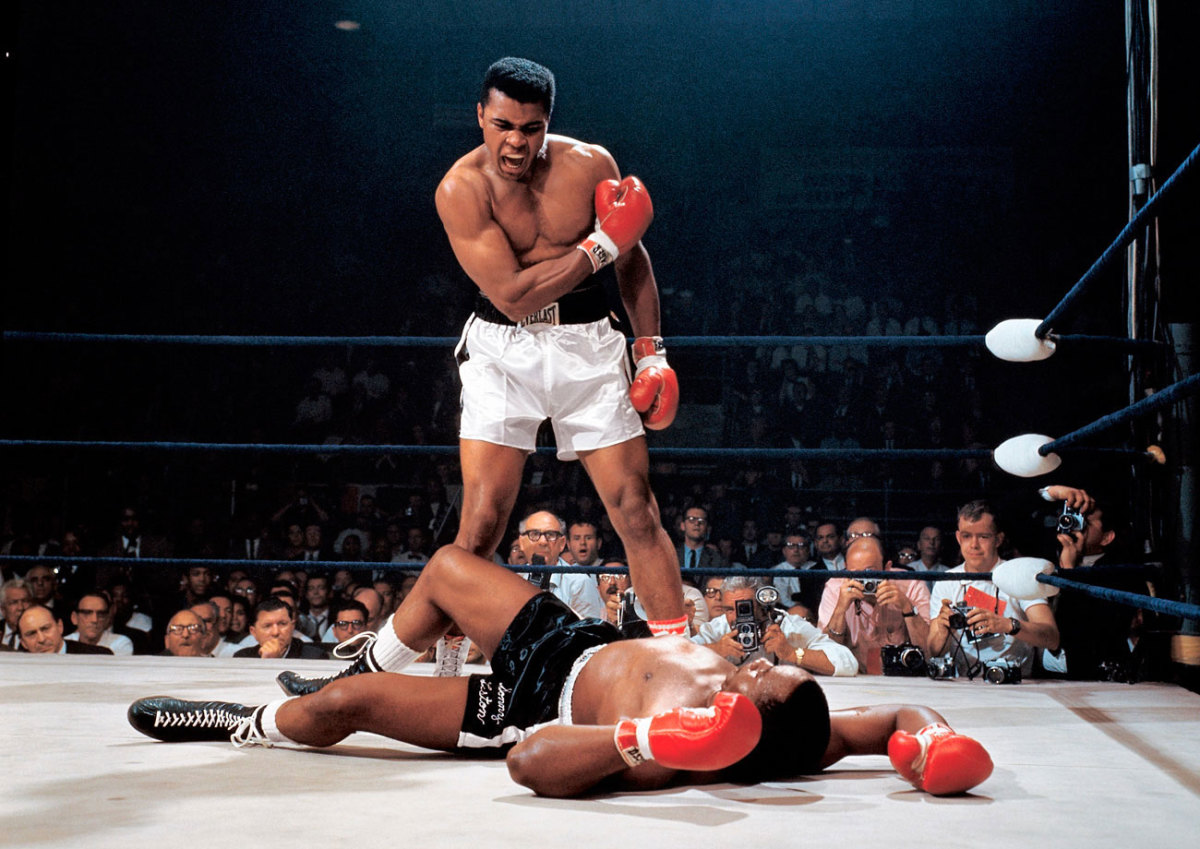
In one of the most iconic and controversial moments of his career, Ali stands over Sonny Liston and yells at him after knocking the former champ down in the first round of their 1965 rematch. Skeptics dubbed it "the Phantom Punch," but films show Ali's flashing right caught Liston flush, knocking him to the canvas. Refusing to go to a neutral corner, Ali stood over Liston and told him to "get up and fight, sucker."
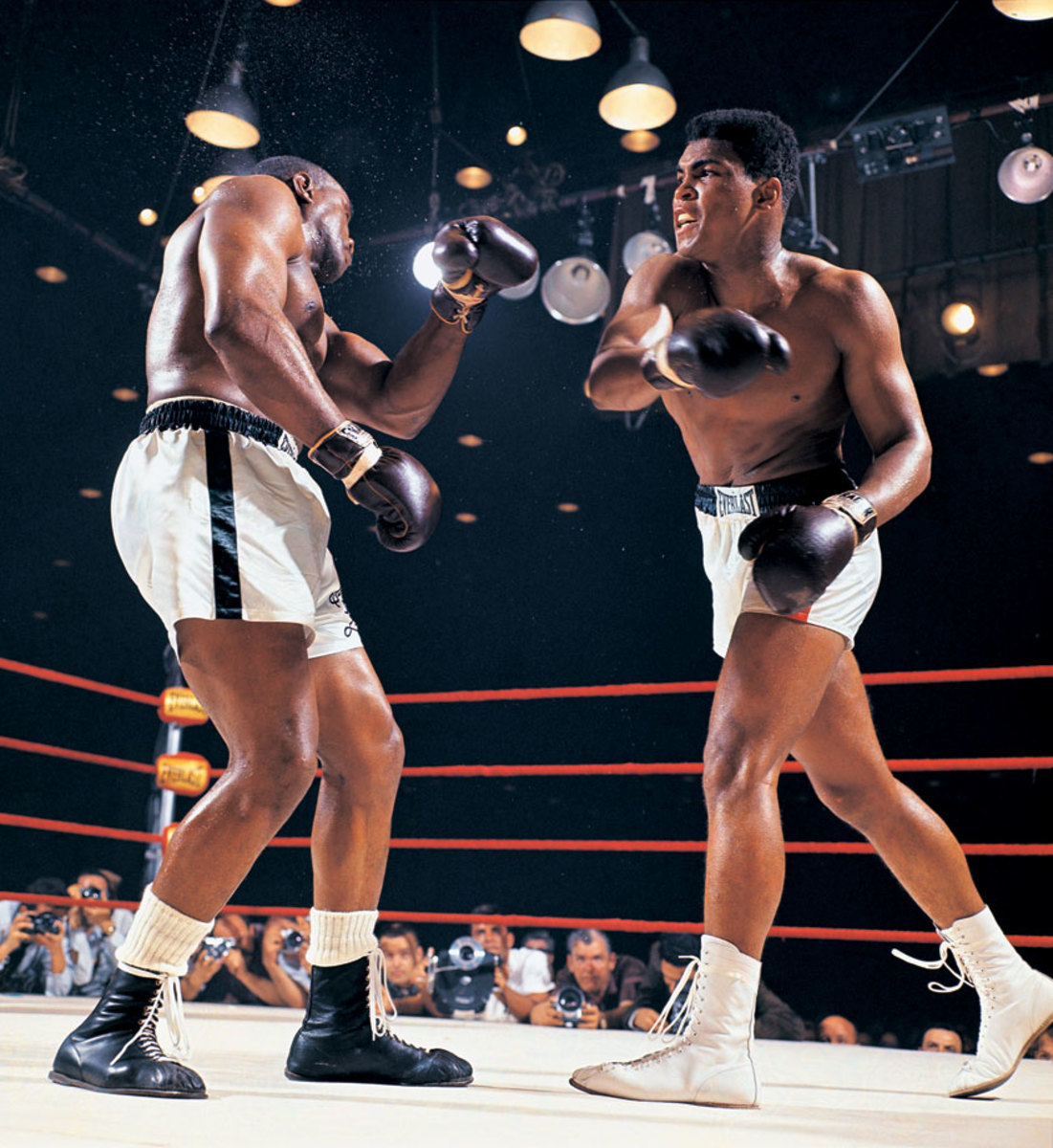
At 22-years-old, Cassius Clay (Muhammad Ali) battered the heavily favored Sonny Liston in a bout that shook the boxing world. The fight ignited the career of one of sports' most charismatic and controversial figures, whose bouts often became social and political events rather than simply sports contests. At the peak of his fame, Muhammad Ali was the best known athlete in the world. Liston, one of the most feared heavyweight champions in history, was a 1-8 favorite over the young challenger known as the Louisville Lip. But Clay, here stinging the champ with a right, used his dazzling speed and constant movement to dominate the action and pile up points.
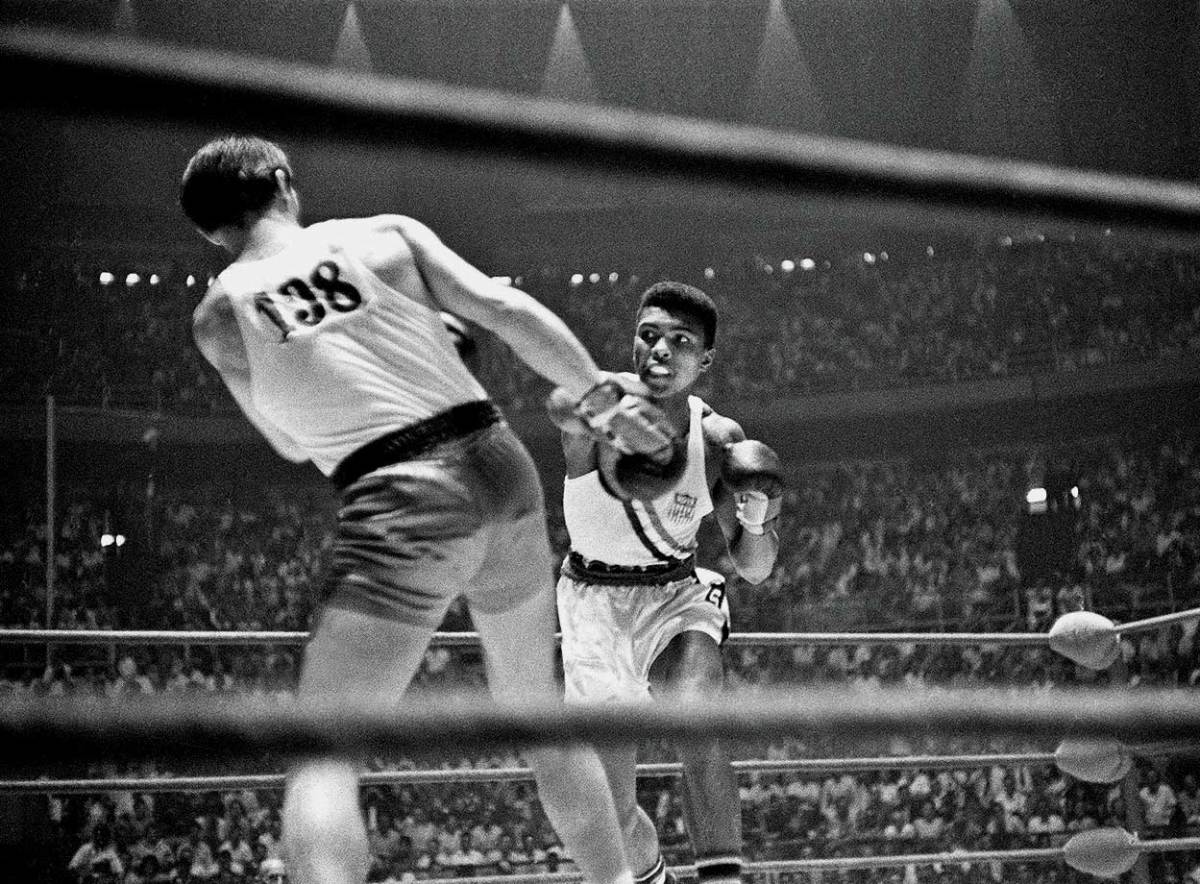
Cassius Clay punches Zbigniew Pietrzykowski of Poland during their gold medal bout at the 1960 Rome Olympics. Clay defeated Pietrzykowski 5-0 for the light heavyweight gold medal.
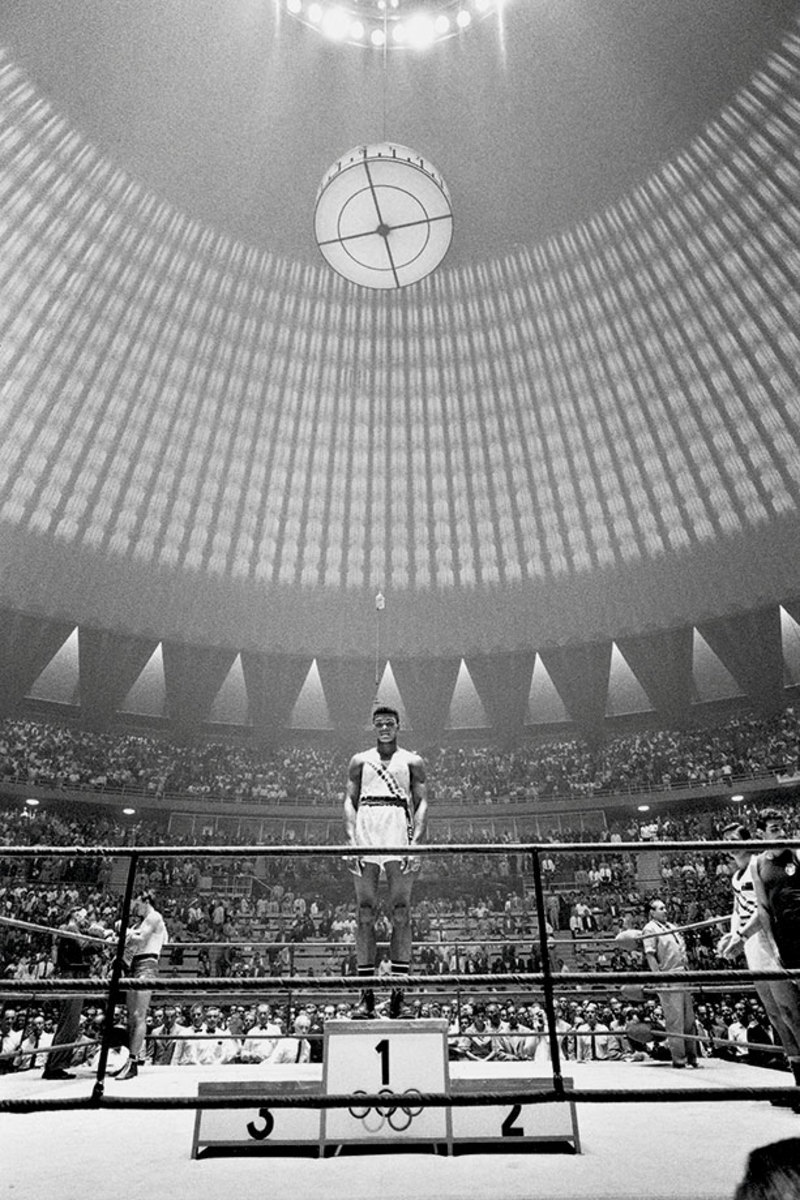
For the 18-year-old from Louisville, here atop the medal stand after his Olympic victory, all roads led from Rome. Clay finished his amateur career with a record of 100-5 and made his professional debut two months after the Games.
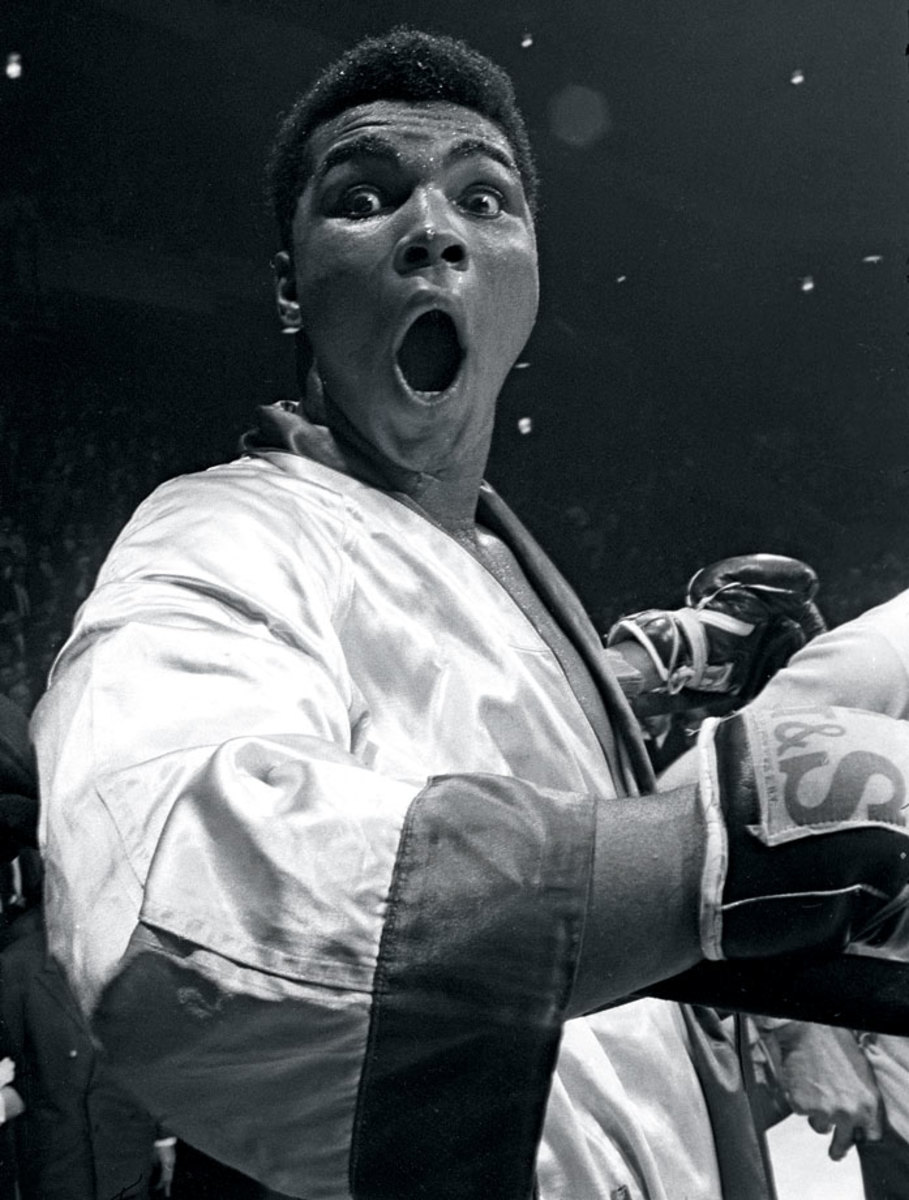
Undefeated in his first 17 pro fights, Clay mugged for the camera before the start of his 1963 bout against Doug Jones in Madison Square Garden.
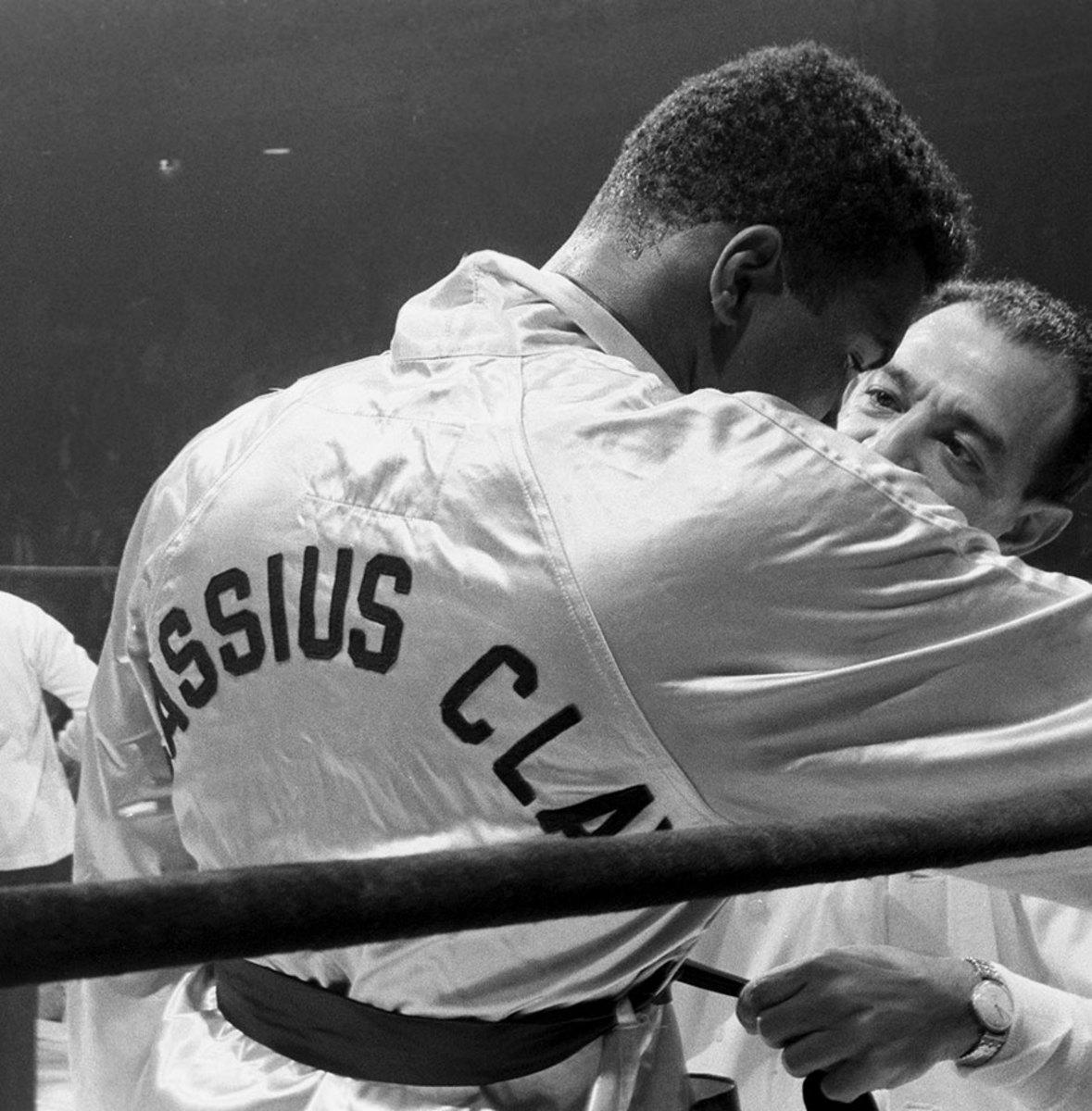
Trainer Angelo Dundee urged his young charge to get serious before the opening bell against Jones. Clay followed instructions and emerged from a tough fight with a unanimous decision victory. Three months later he would stop Henry Cooper and close out 1963 at 19-0.
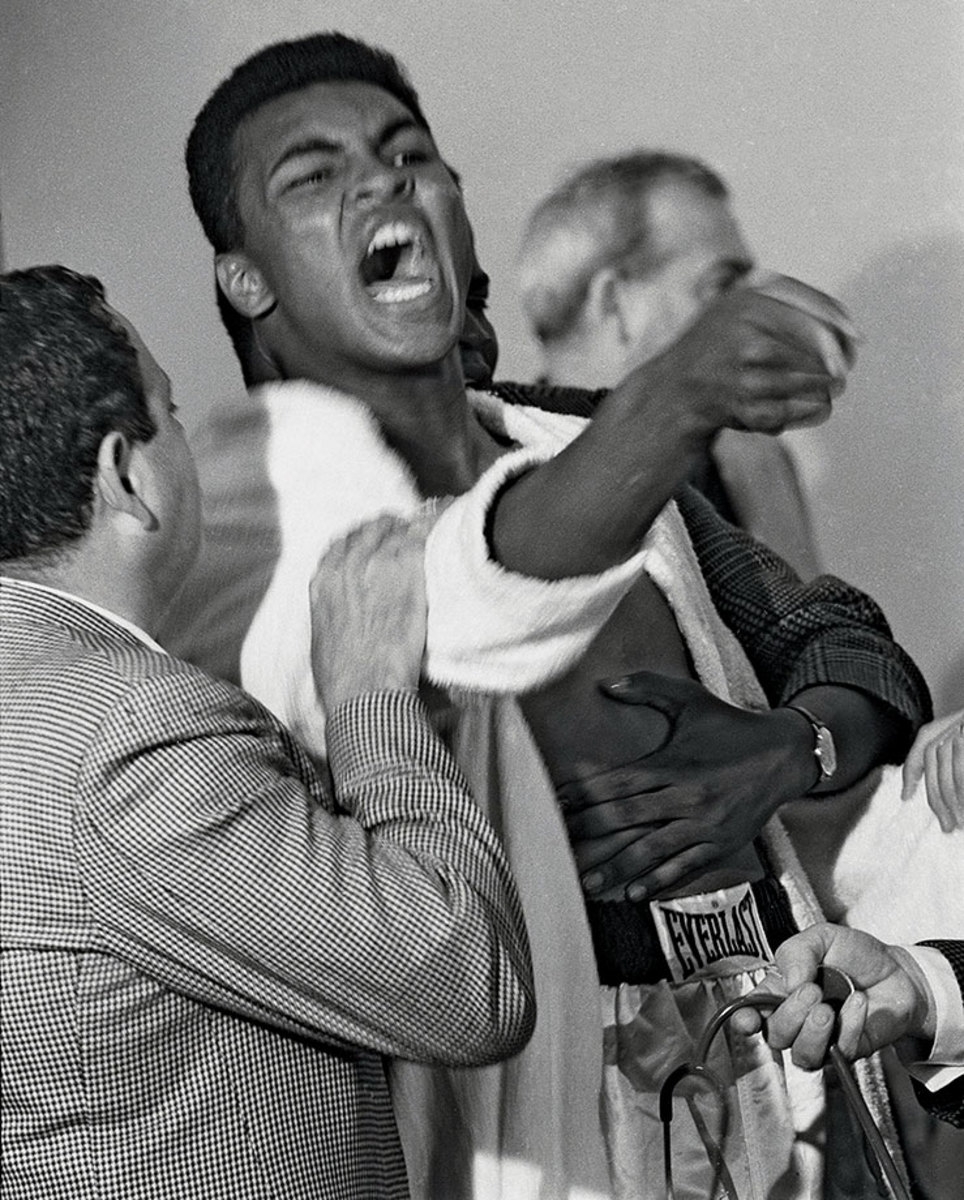
A seemingly hysterical Clay taunted Sonny Liston during the pre-fight physical for their 1964 bout. He had consistently baited the Big Bear during the lead-up to the fight, saying he was going to "use him as a bearskin rug ... after I whup him." The Miami Boxing Commission would fine Clay $2,500 for his outburst at the physical.
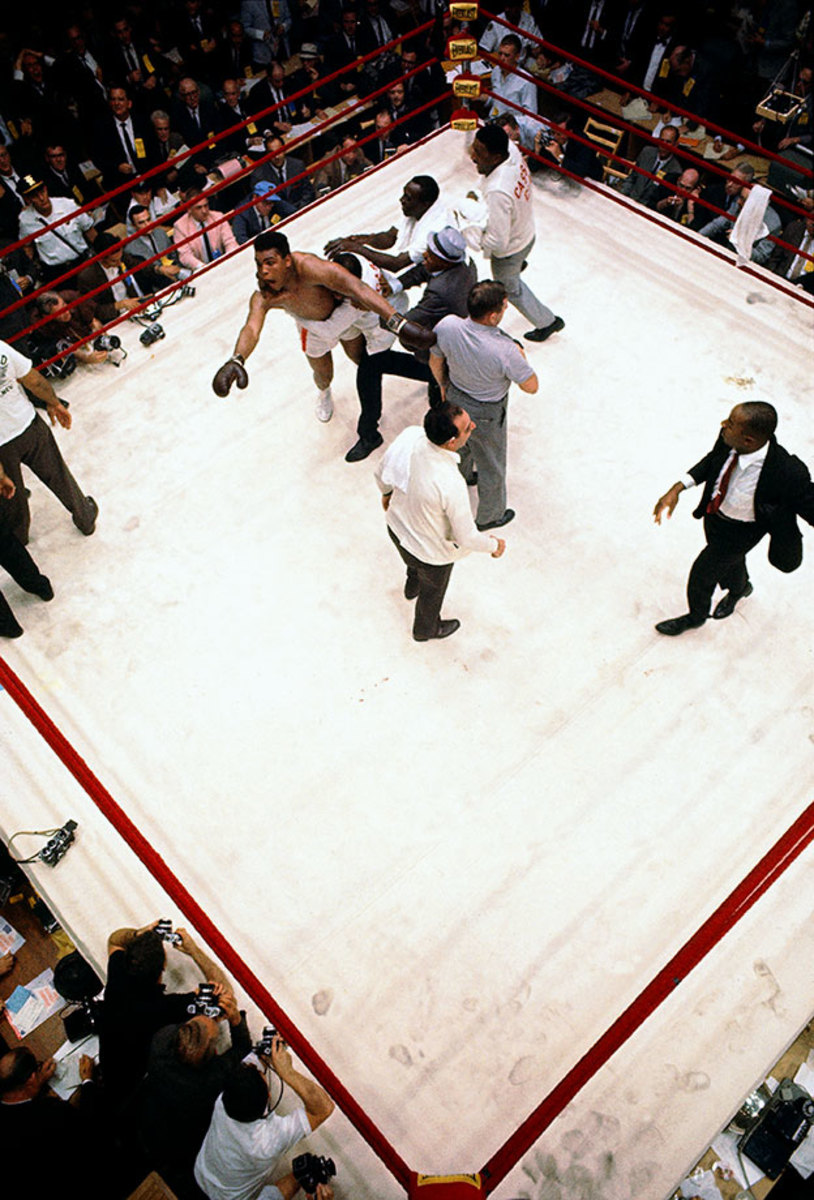
"I shook up the world!" an emotional Clay hollered to ringside reporters after his shocking defeat of Liston. And he did just that, claiming the heavyweight title at age 21 after a clearly beaten Liston, complaining of a shoulder injury, failed to answer the bell for the seventh round.
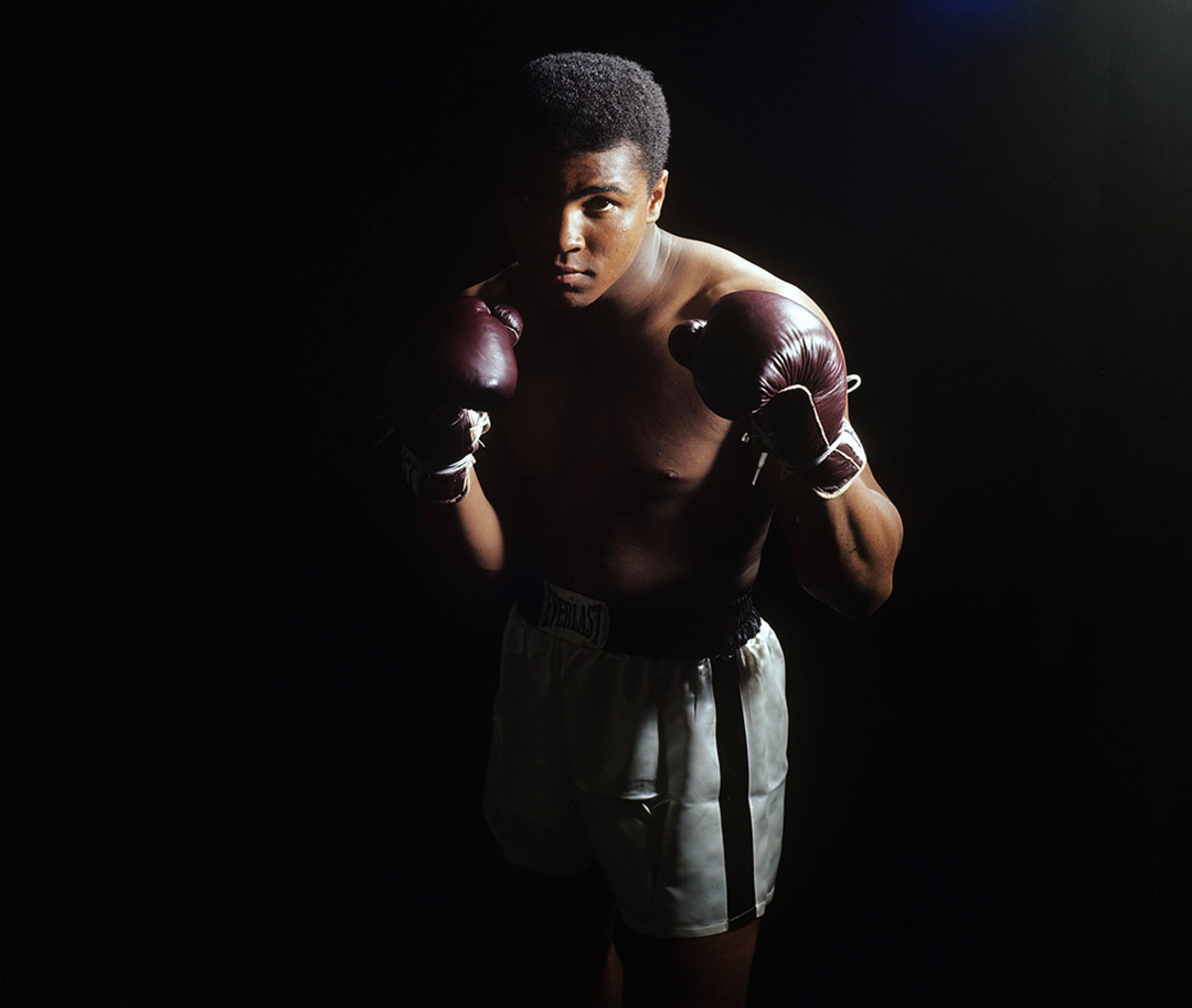
Draped in shadow, the young king — now known as Muhammad Ali — stared down the camera during a photo shoot in April 1965, one month before his rematch against Sonny Liston.
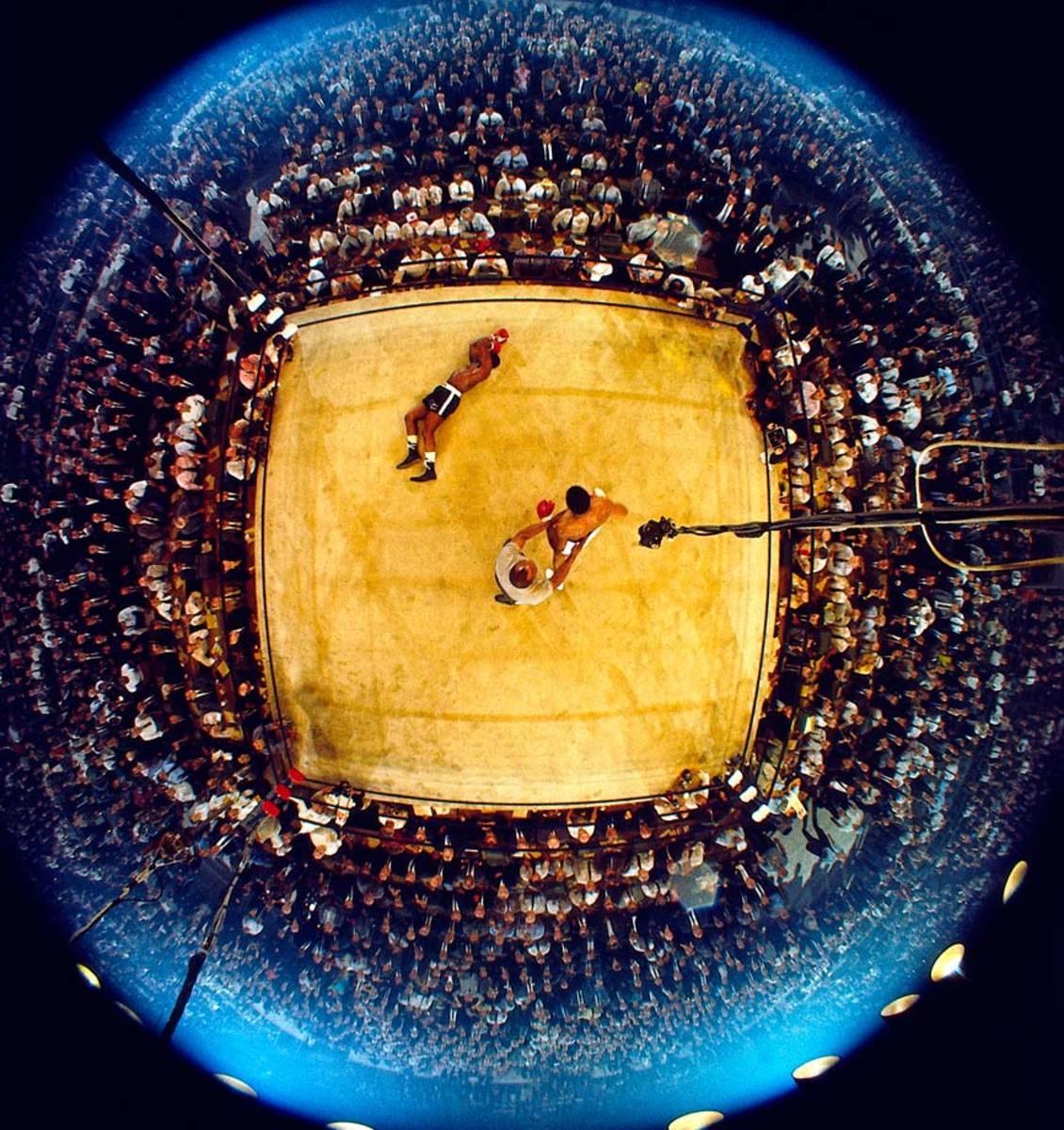
As Liston lingered on the canvas and the referee, former heavyweight champ Jersey Joe Walcott, tried to control Ali, the 2,434 spectators on hand in the Lewiston, Me., hockey arena — a record low for a heavyweight championship fight — tried to make sense of what all that had happened in less than two minutes after the opening bell.
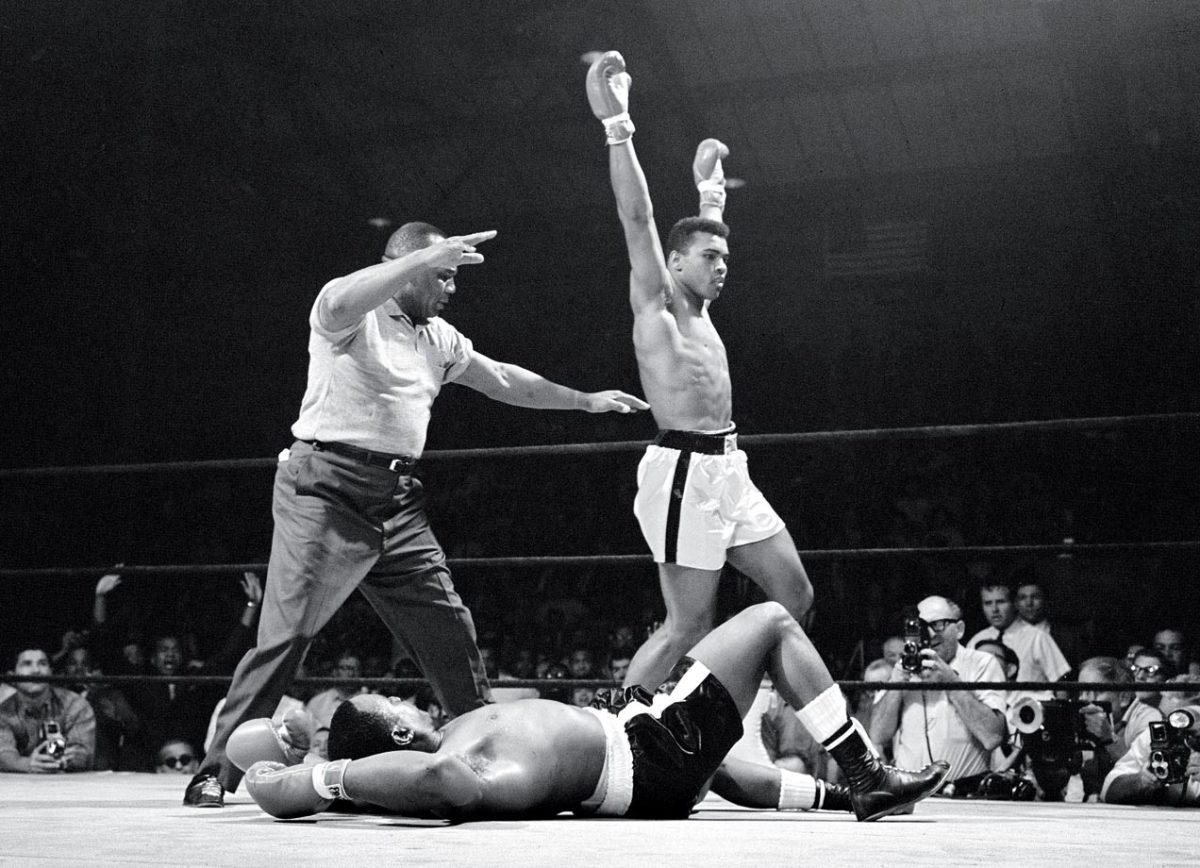
The celebration over Liston continued. In a chaotic ending, Ali was awarded a knockout when Nat Fleischer, publisher of The Ring, informed referee Jersey Joe Walcott from ringside that Liston had been on the canvas for longer than 10 seconds after Ali knocked him down. The bout remains one of the most controversial in boxing history, with many observers insisting that Liston took a dive.
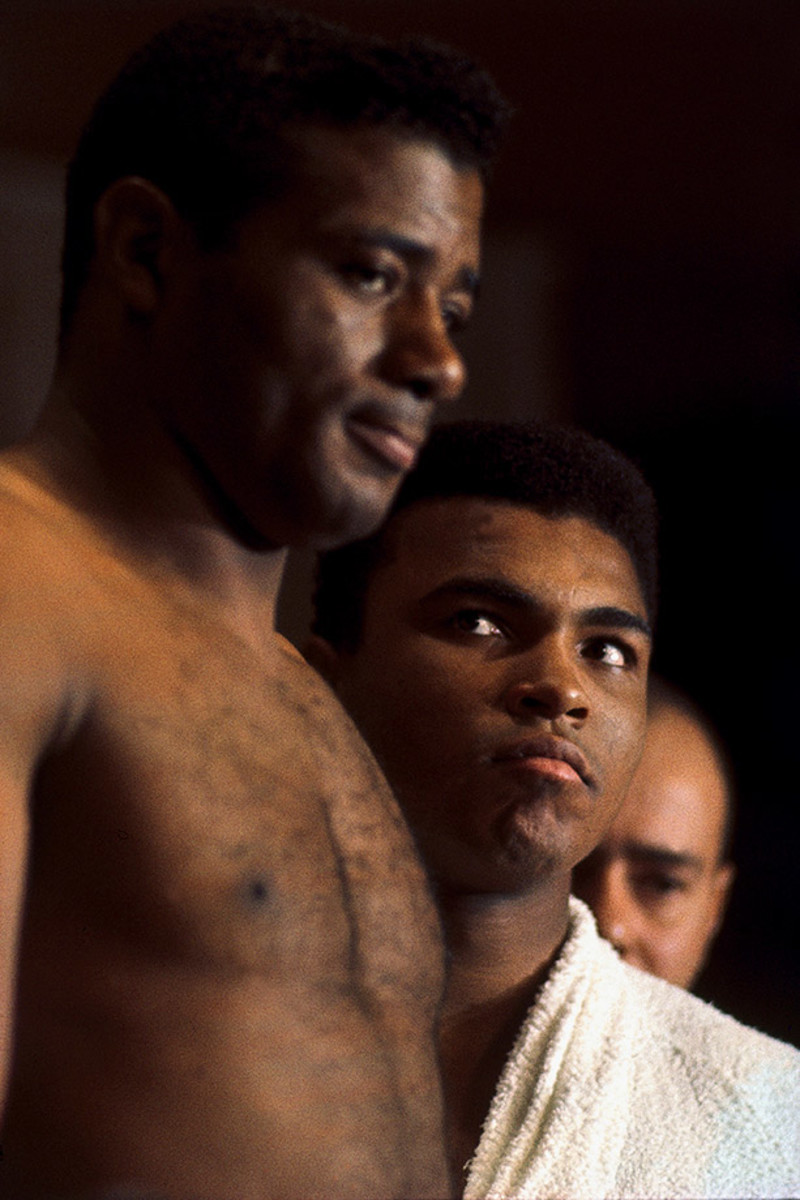
Ali's second title defense came in November 1965, against former two-time heavyweight champion Floyd Patterson. During the build-up to the bout, the normally soft-spoken Patterson earned the new champ's wrath by refusing to call Ali by his Muslim name. At the weigh-in, Ali's glare made it clear that he intended Patterson to pay for the disrespect.
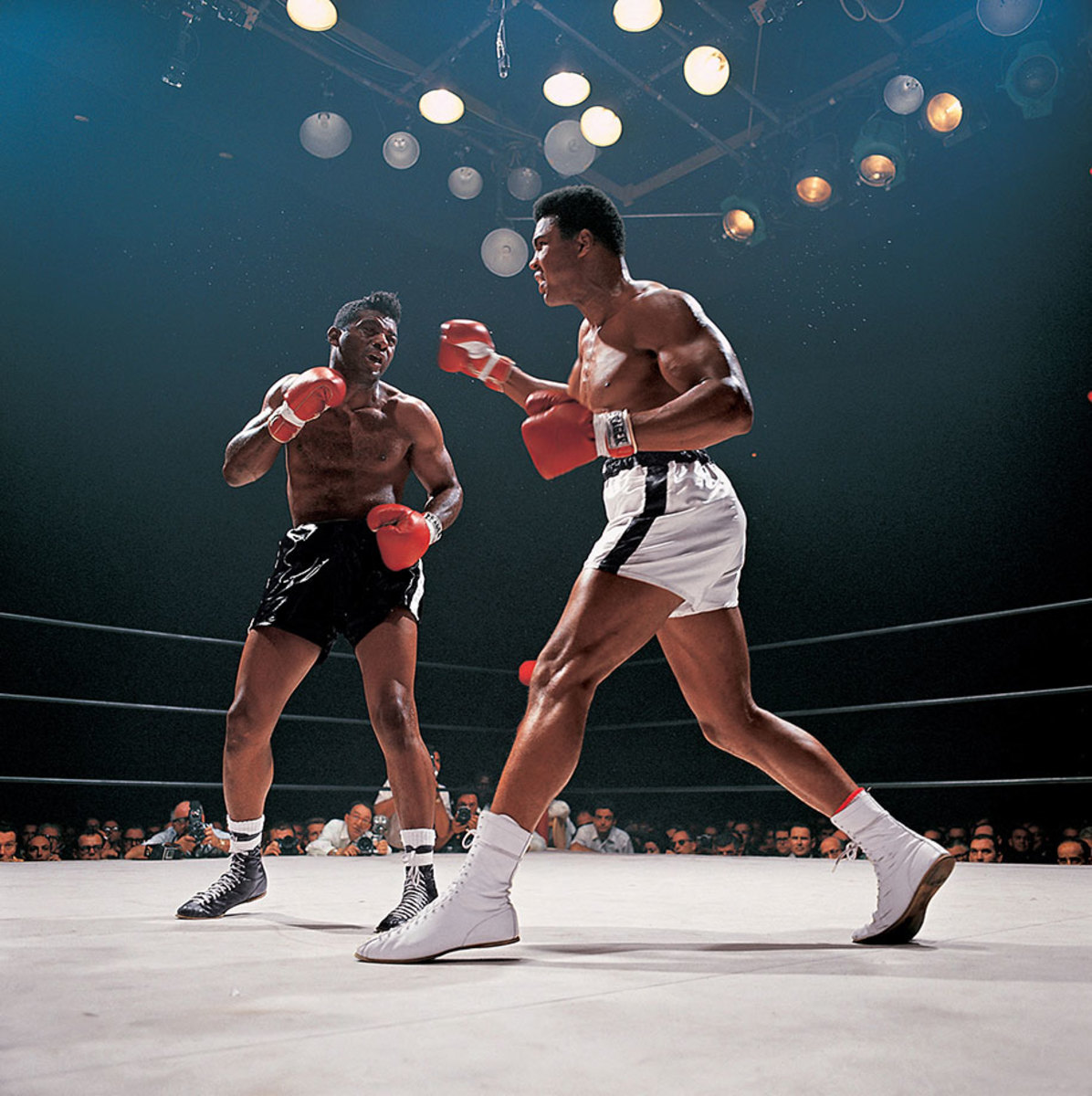
In cruelly efficient performance, Ali punished Patterson — who was hobbled by a painful back injury — seemingly toying with the former champ throughout the bout, hitting him at will and calling, "What's my name?" before finally winning on a 12th-round TKO.
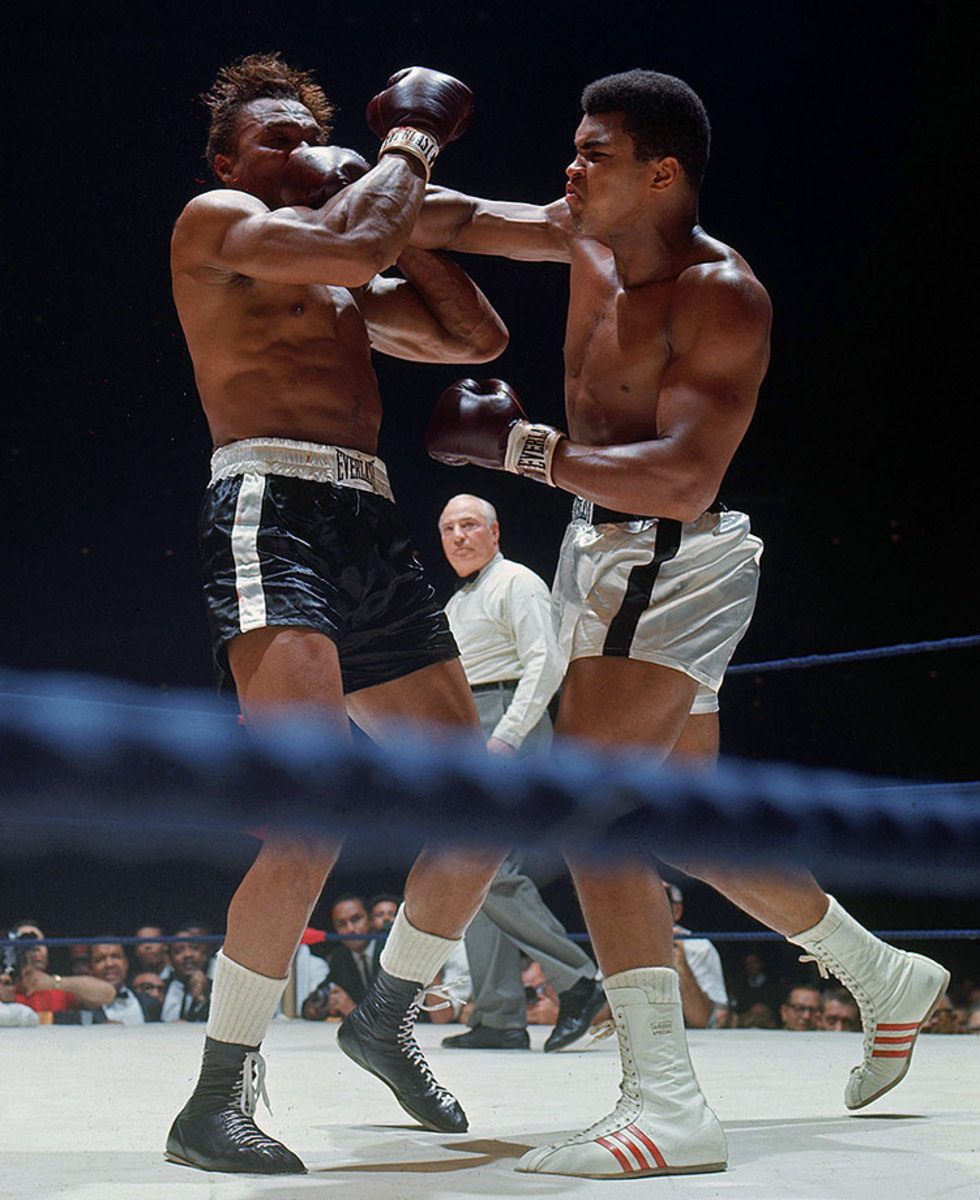
Capping off a five-fight campaign in 1966, Ali faced Cleveland Williams in the Houston Astrodome on Nov. 14. Known as the Big Cat, the heavily-muscled Williams was a power puncher who had racked up 51 knockouts in 71 fights. But he was also 33, barely recovered from a gunshot wound sustained the year before, and up against a young champion very much in his prime. Ali wasted little time in unleashing a withering attack.
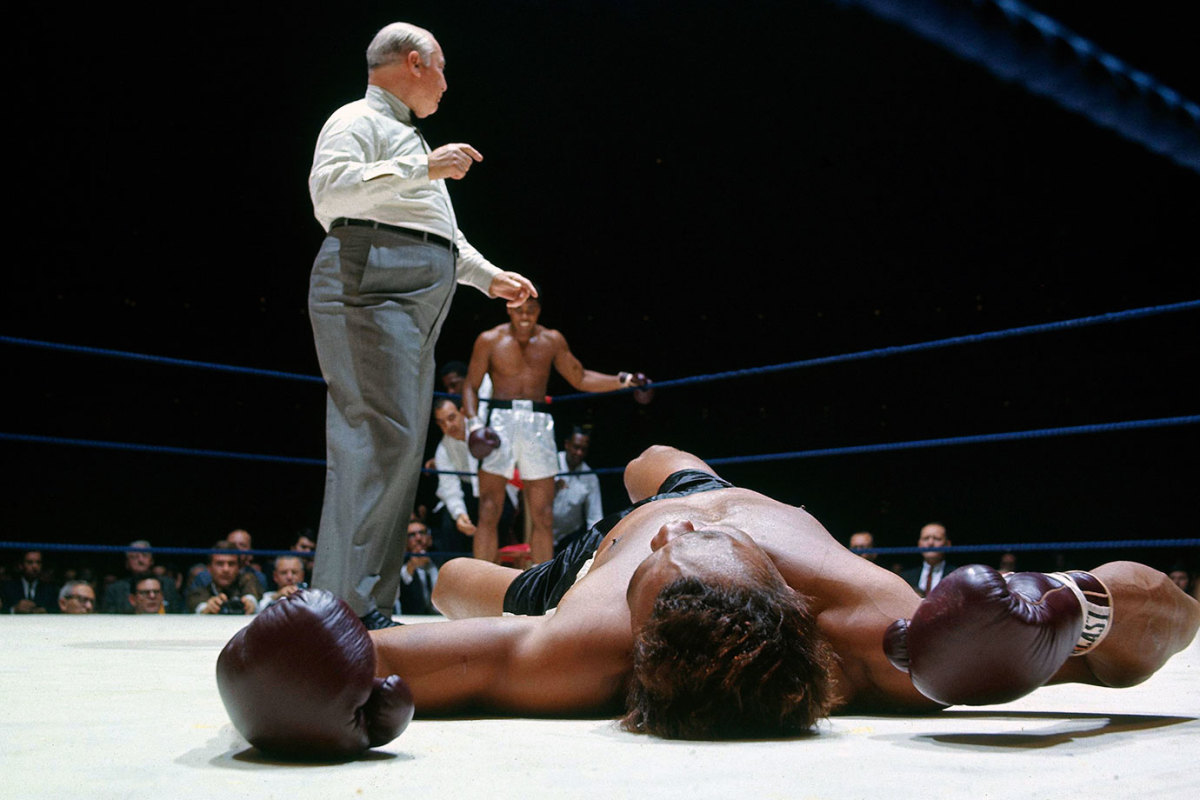
Float and sting: In a display of speed and combination punching unmatched in heavyweight history, Ali overwhelmed Williams from the start. The challenger, here down for the third time in round 2, would be saved by the bell before referee Harry Kessler could count him out, but it would only postpone the inevitable.
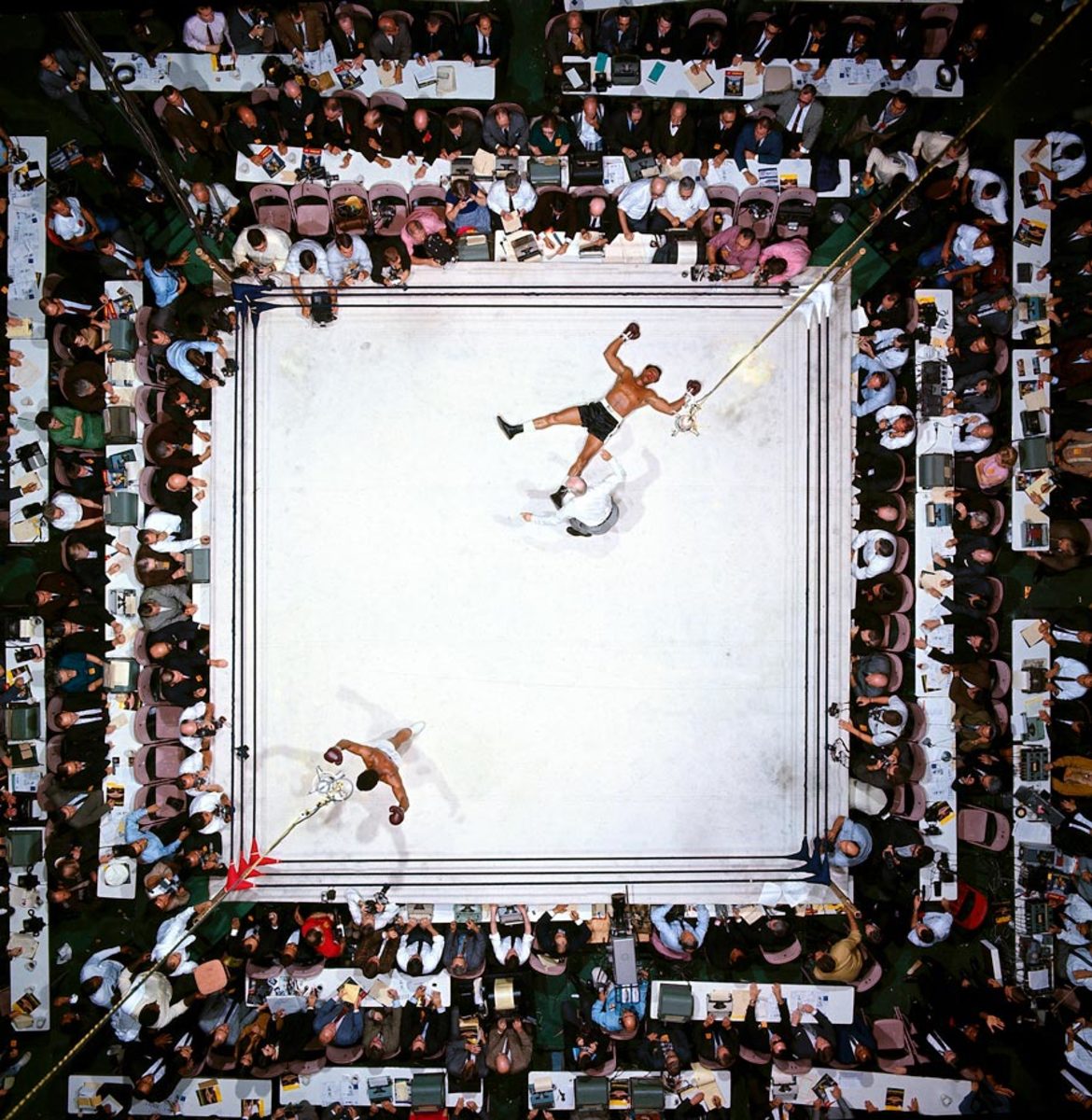
Ali dropped Williams again early in the third round, and Kessler waved the mismatch over at 1:08 of the third.
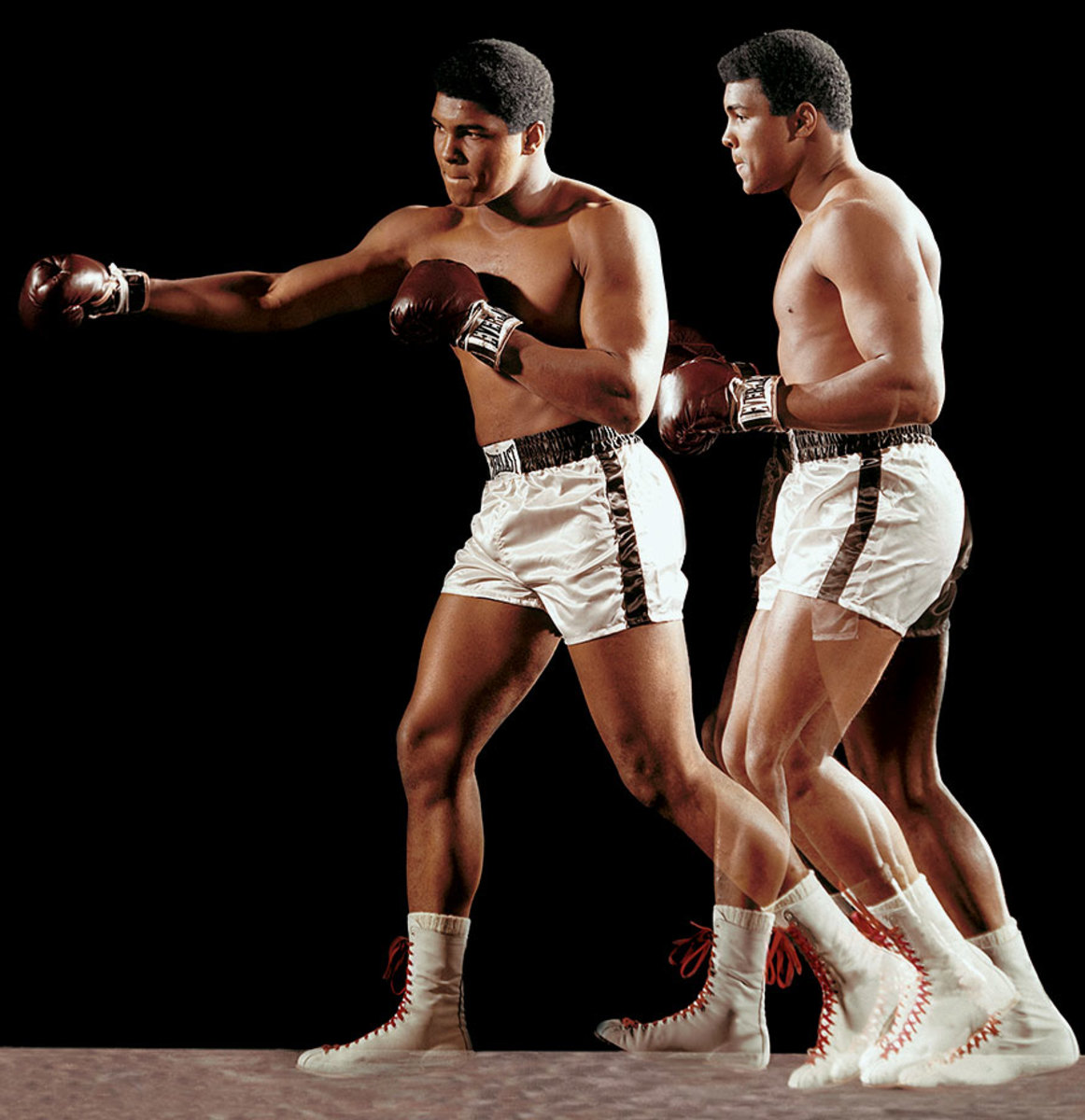
In a multiple-exposure portrait, Ali demonstrates his signature double-clutch shuffle during a photo shoot in December 1966.
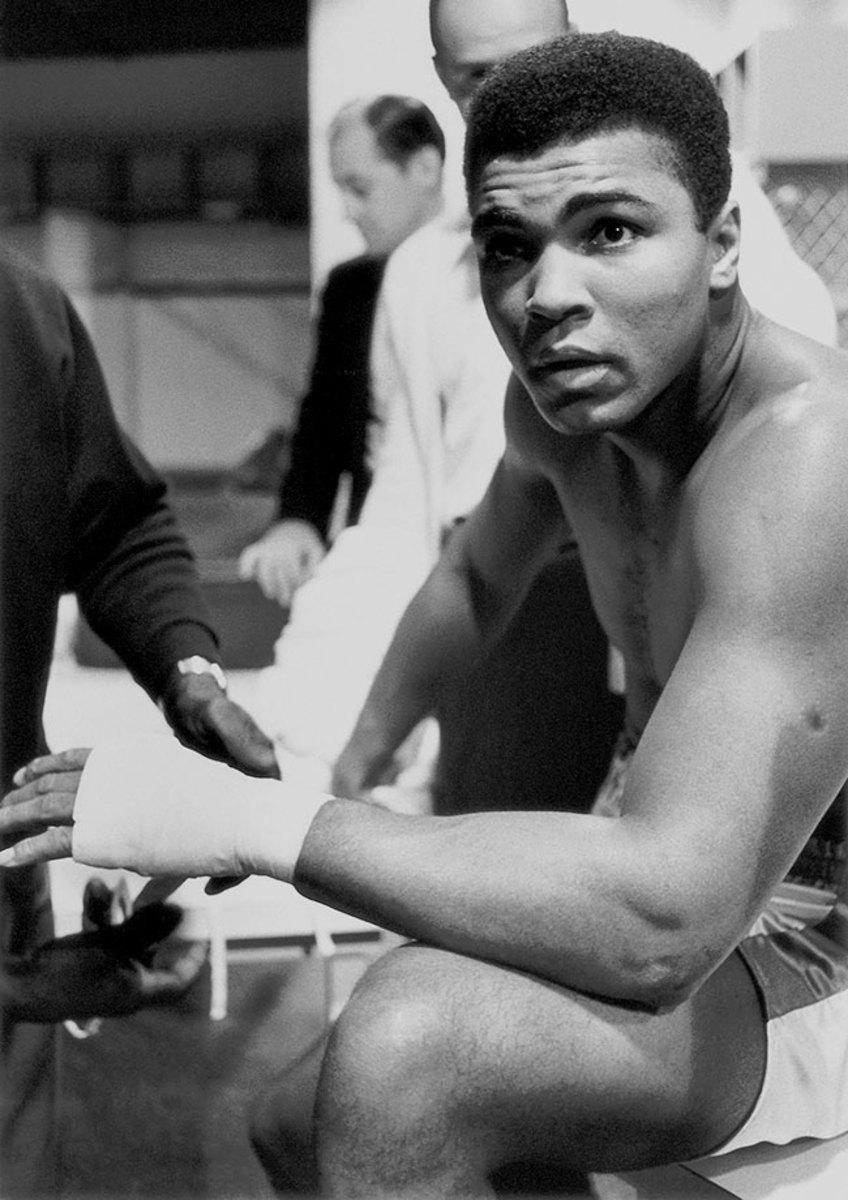
Ali sits in the locker room before his February 1967 fight against Ernie Terrell. Like Patterson before him, Terrell refused to call the champion by his Muslim name. Also like Patterson, he paid a stiff price, as Ali punished Terrell for 15 ugly rounds before winning by unanimous decision.
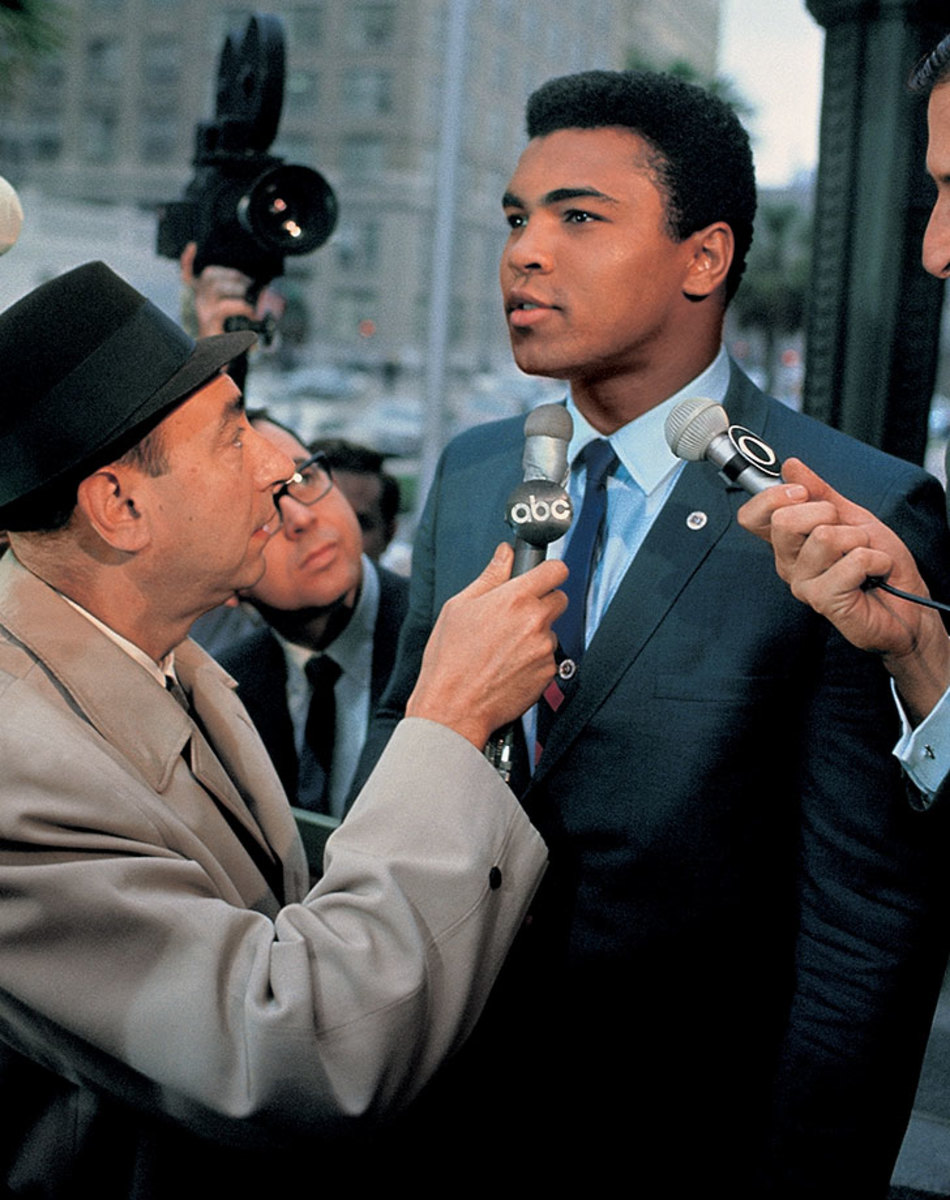
Outside the Armed Forces Examining and Entrance Station in Houston in April 1967, Ali spoke to the press about his refusal to be inducted into military service. Among those on hand was ABC's Howard Cosell, who would be a staunch supporter of the fighter's stance. The decision cost Ali his boxing license and his heavyweight title, and he was sentenced to five years in prison but remained free pending an appeal.
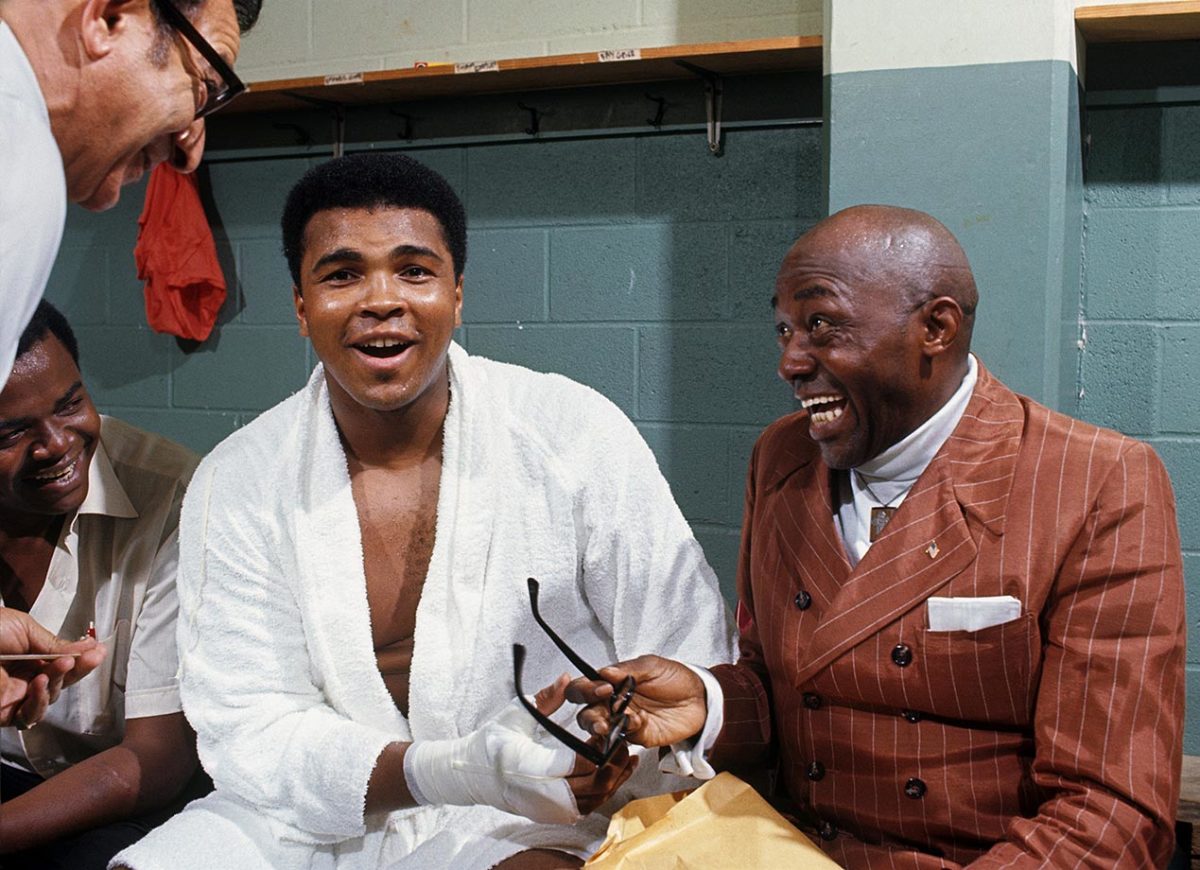
In professional exile for three and a half years because of his draft case, Ali sought to return to boxing in 1970. He began with a night of exhibition bouts at Morehouse College in Atlanta, where before going into the ring, he shared a locker room laugh with actor and comedian Lincoln Perry (right), better known by his stage name of Stepin Fetchit. The friendship between the two black icons would later be examined in an acclaimed play by Will Power, Fetch Clay, Make Man.
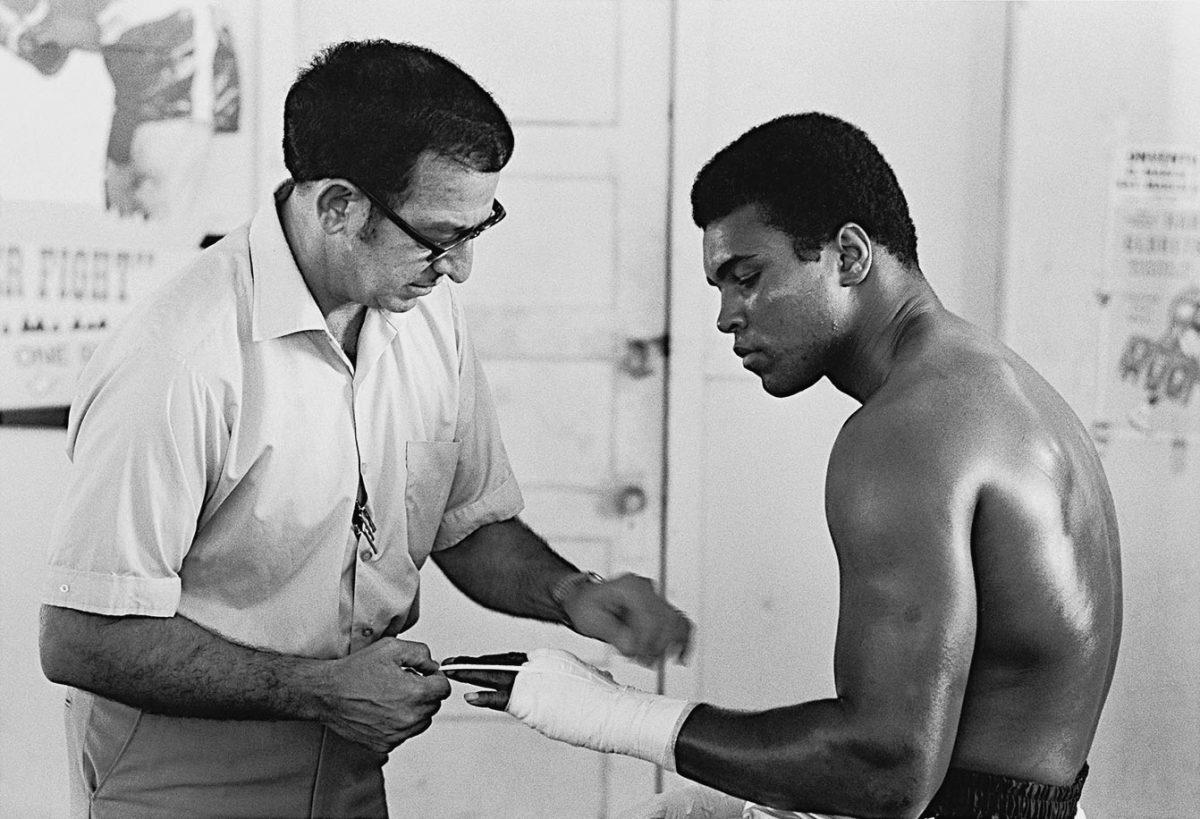
After the Atlanta Athletic Commission at last granted Ali a license, the deposed champion went back into serious training. He was, as ever, in the capable hands of trainer Angelo Dundee, here wrapping boxing's most famous fists at the 5th Street Gym in Miami in October 1970.
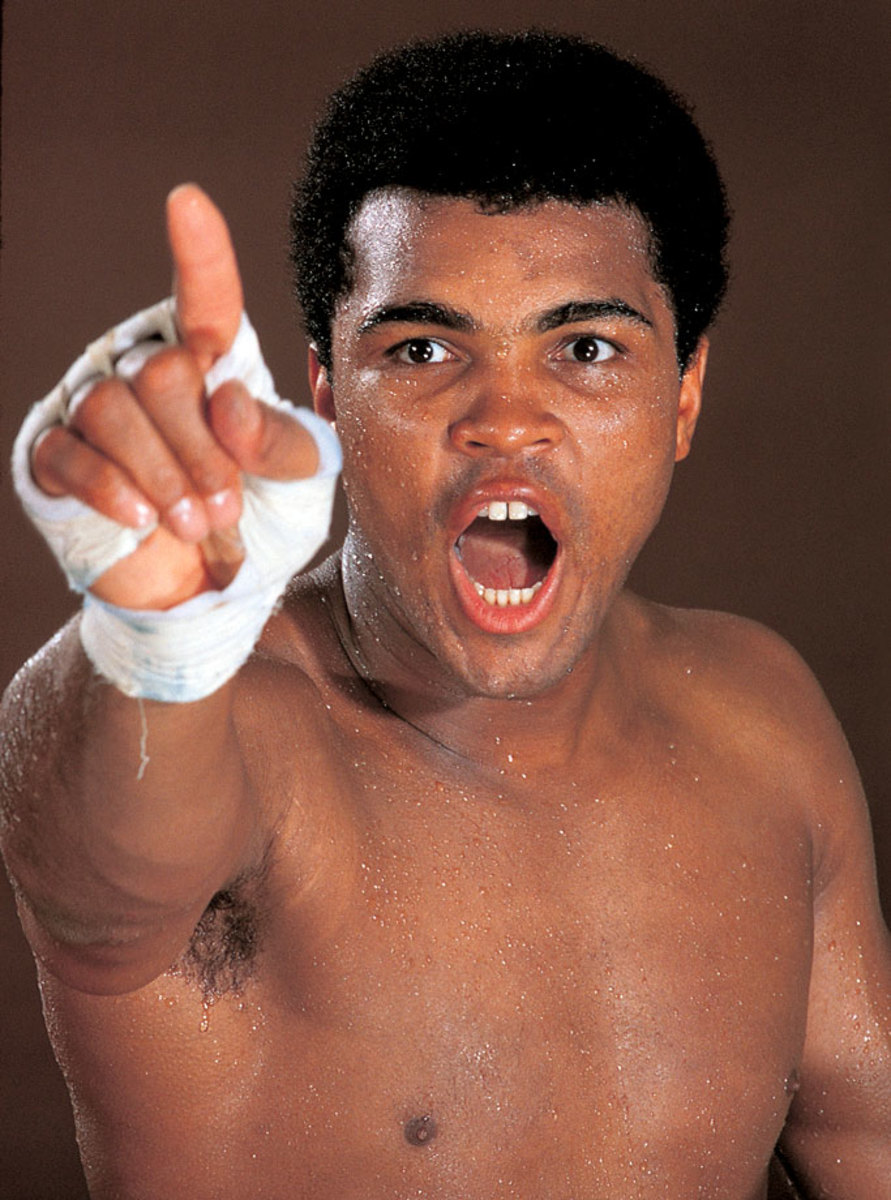
With his return to the ring scheduled for Oct. 26, 1970 in Atlanta, against dangerous contender Jerry Quarry, Ali made it clear to all who would listen that he was on a mission to reclaim the title that had been stripped of him.
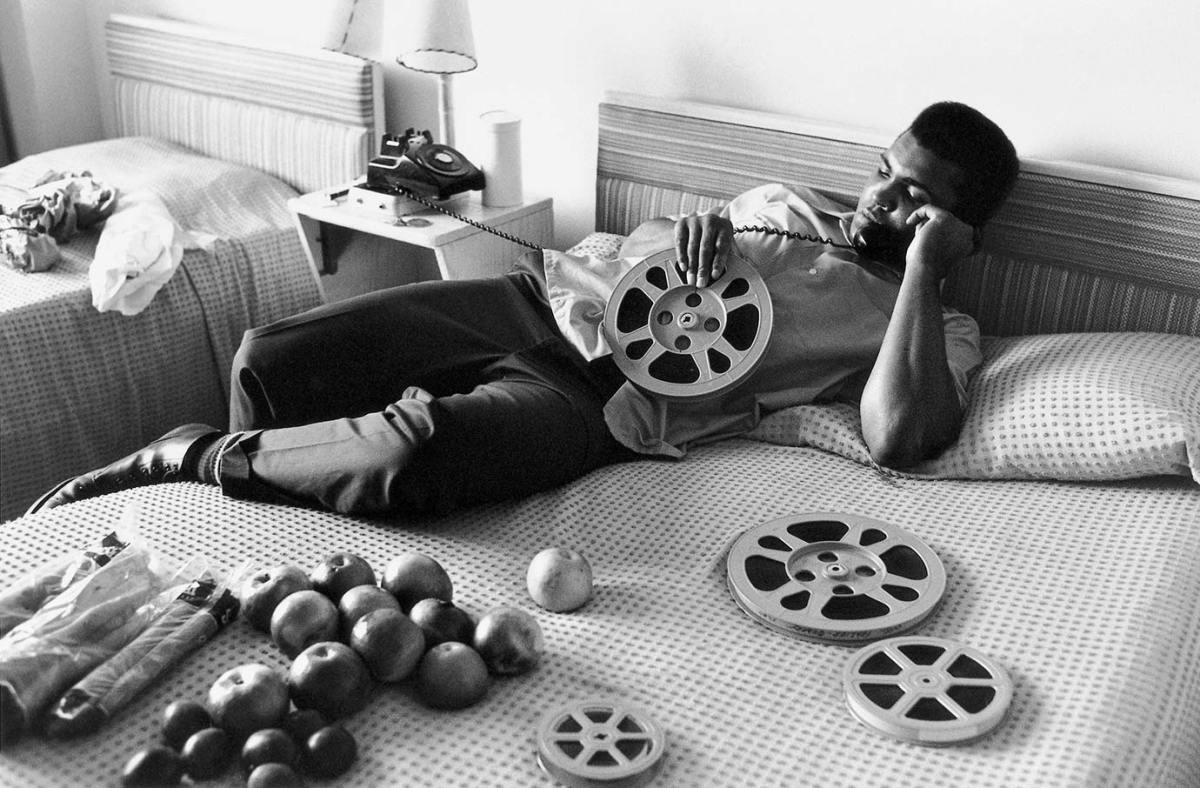
Reel to spiel: For the ever-loquacious Ali, even a rare moment of down time — like this afternoon in 1970 in a Miami hotel room — was a chance to do some talking.
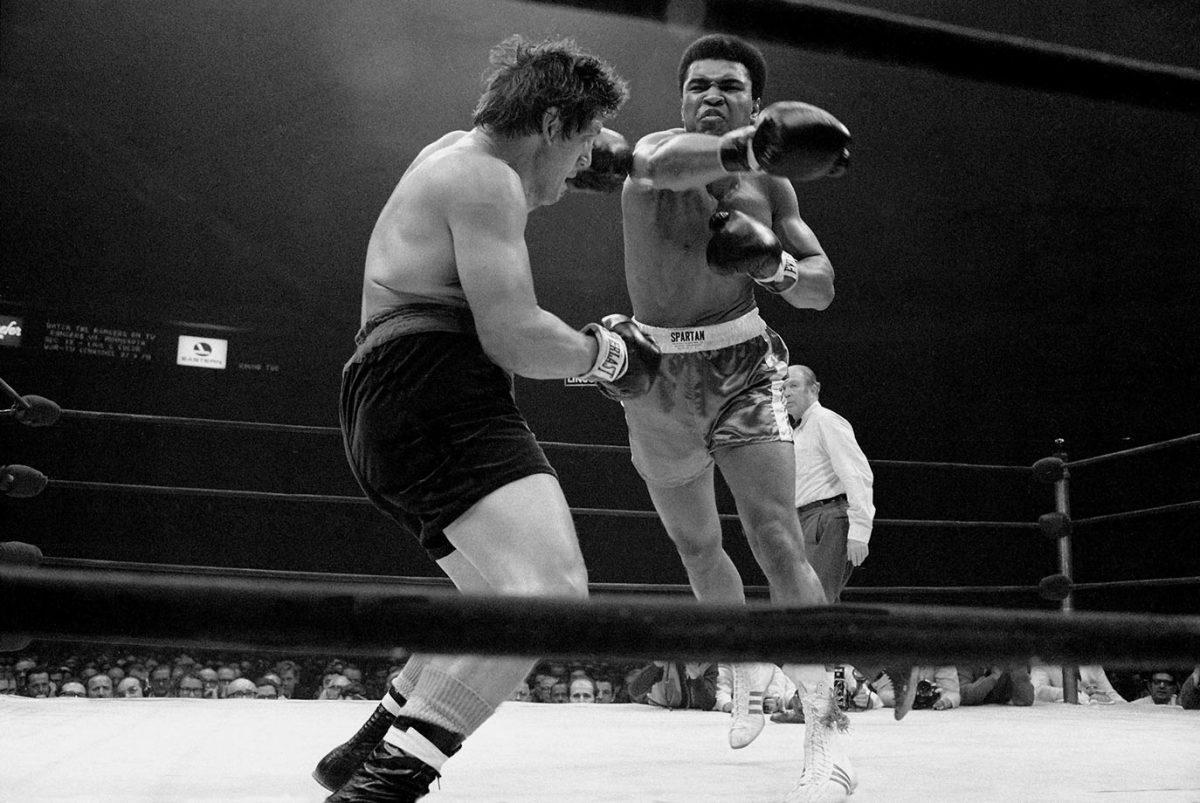
Despite Ali's long layoff, his comeback campaign would include no easy tune-up bouts. He stopped Quarry in three rounds on Oct. 26, 1970, then, just six weeks later — an unthinkably short interlude by today's standards — took on Argentine contender Oscar Bonavena in Madison Square Garden. Here, Ali fires a right at the rugged and awkward Bonavena, who took the fight to the former champion all night.
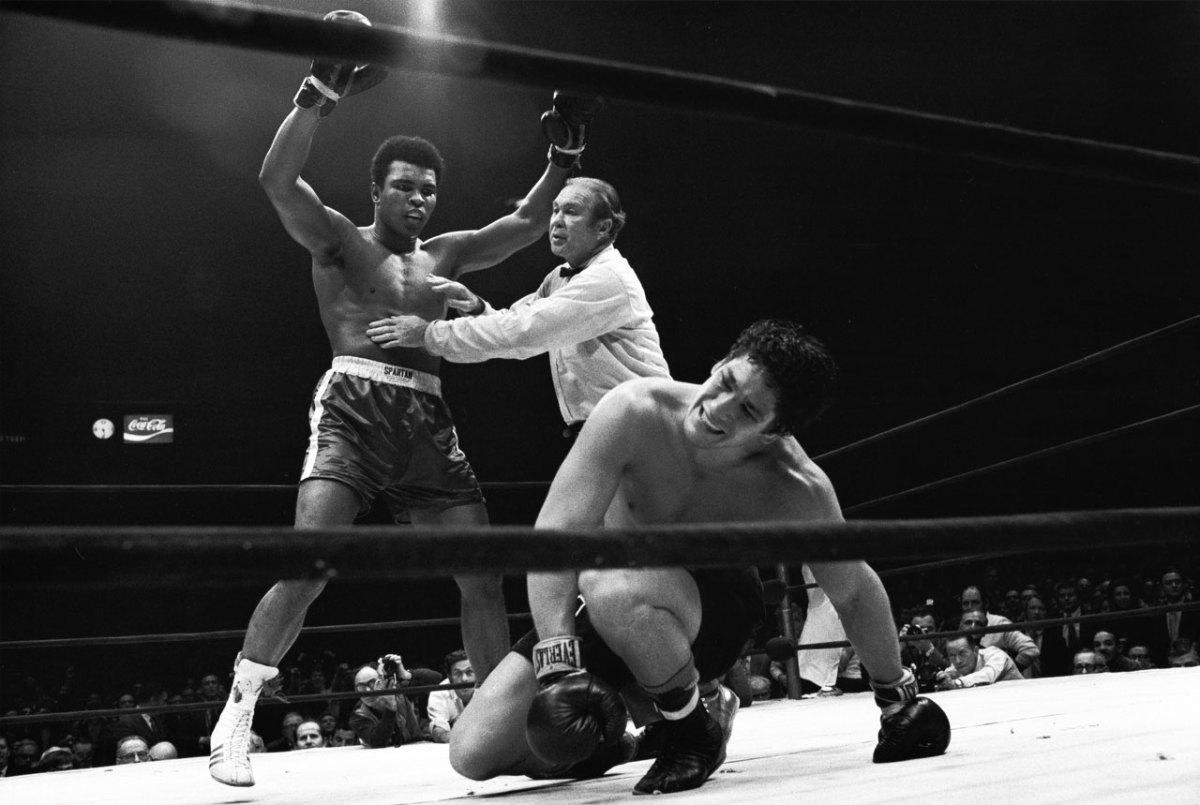
After a long, often sloppy bout, Ali — here being held back by referee Mark Conn — produced one of the most dramatic finishes of his career, dropping Bonavena three times in the 15th and final round to automatically end the fight. The win cleared the way for a showdown with Joe Frazier, the man who had taken the heavyweight title in Ali's absence.
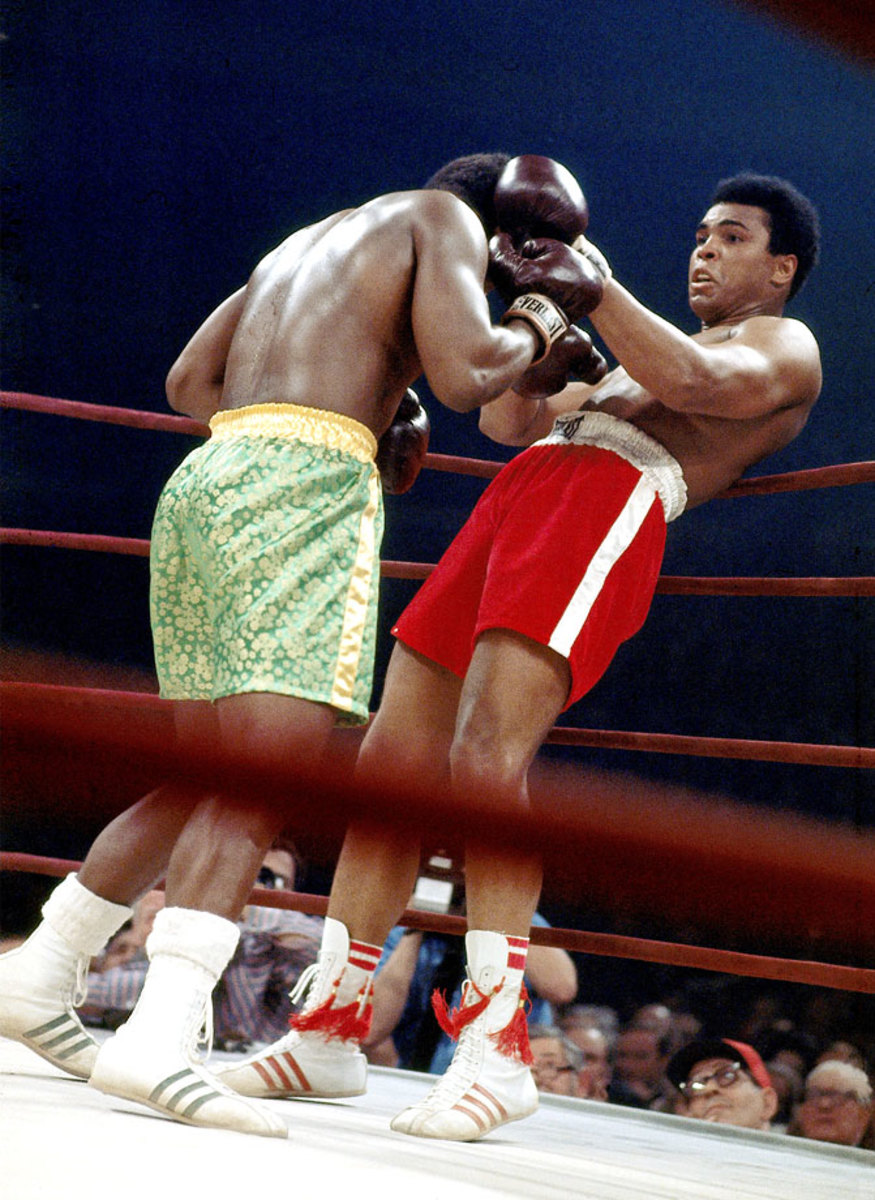
On the night of March 8, 1971, the eyes of the world were on a square patch of white canvas in the center of Madison Square Garden. There, Ali and Joe Frazier met in what was billed at the time simply as The Fight, but has come to be known, justifiably, as the Fight of the Century. For 15 rounds the two undefeated heavyweights battled at a furious pace, with each man sustaining tremendous punishment. In the end Frazier prevailed, dropping Ali in the final round with a tremendous left hook to seal a unanimous decision and hand The Greatest his first loss in 32 professional fights.
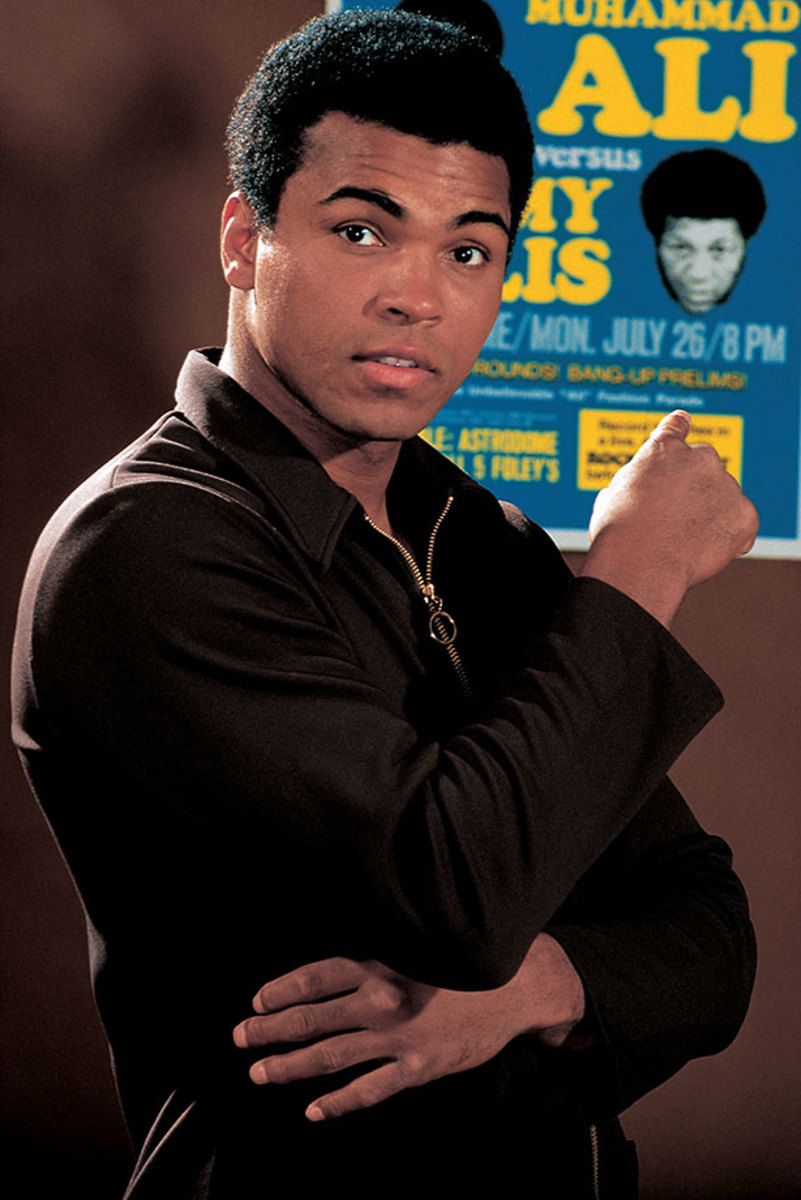
Ali poses with the fight poster for his upcoming fight against Jimmy Ellis during a photo shoot in July 1971. Ellis was an old friend of Ali's — both were trained by Angelo Dundee — and knew his fighting style well from many rounds of sparring.
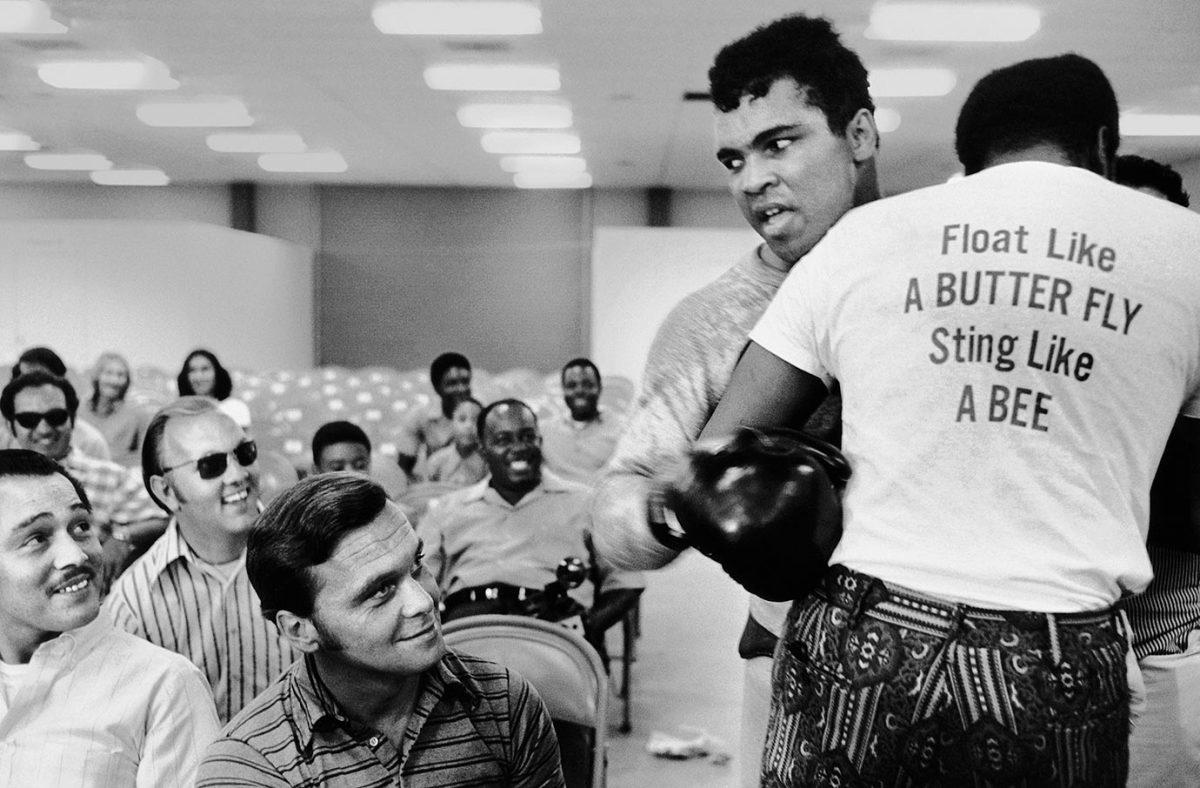
For those sportswriters lucky enough to cover Ali on a regular basis, each day brought surprises and, more often than not, plenty of laughs. of Trainer Drew Bundini Brown helps Ali train for his fight against Ellis. Ali won the bout by technical knockout in the 12th round to claim the vacant NABF heavyweight title.
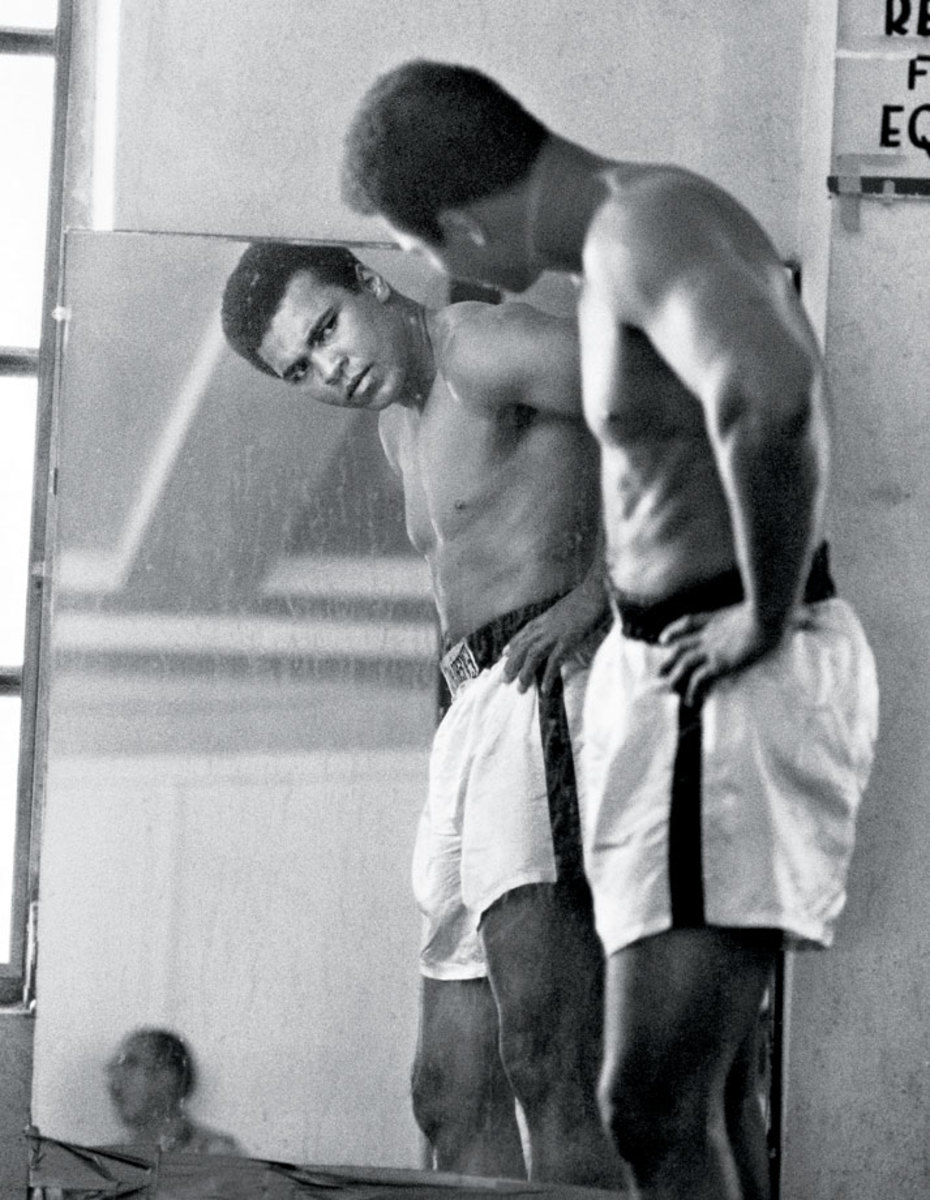
The man in the mirror stares back as Ali examines himself while training for a fight in 1972. He won all six of his fights that year.

The Louisville Lip stands next to George Foreman before Ali's fight versus Jerry Quarry in June 1972. Ali won by technical knockout in the seventh round. Foreman at the time was 36-0. Ali would not get his shot against Foreman for more than two years.
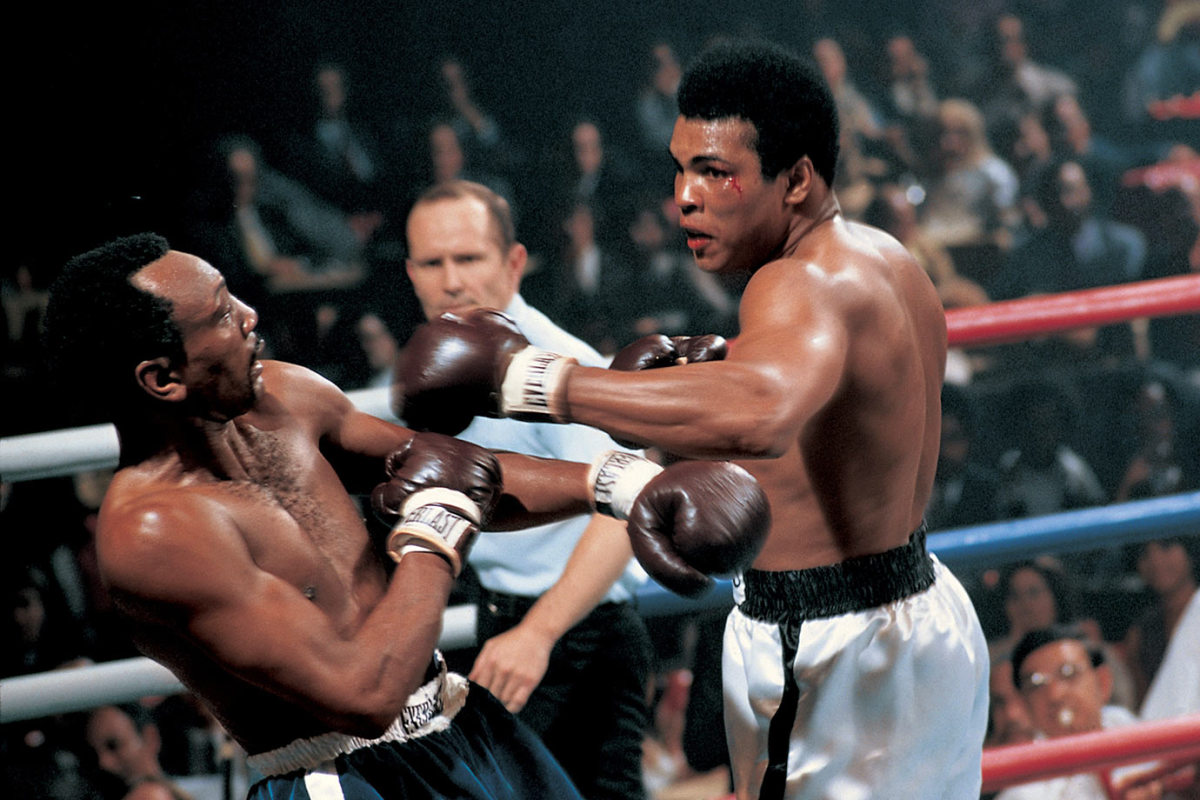
Ali throws a left hook at Bob Foster in their 1972 fight at Stateline, Nev. Although Ali knocked Foster out, Foster did leave his mark: a cut above Ali's left eye, his first as a professional.
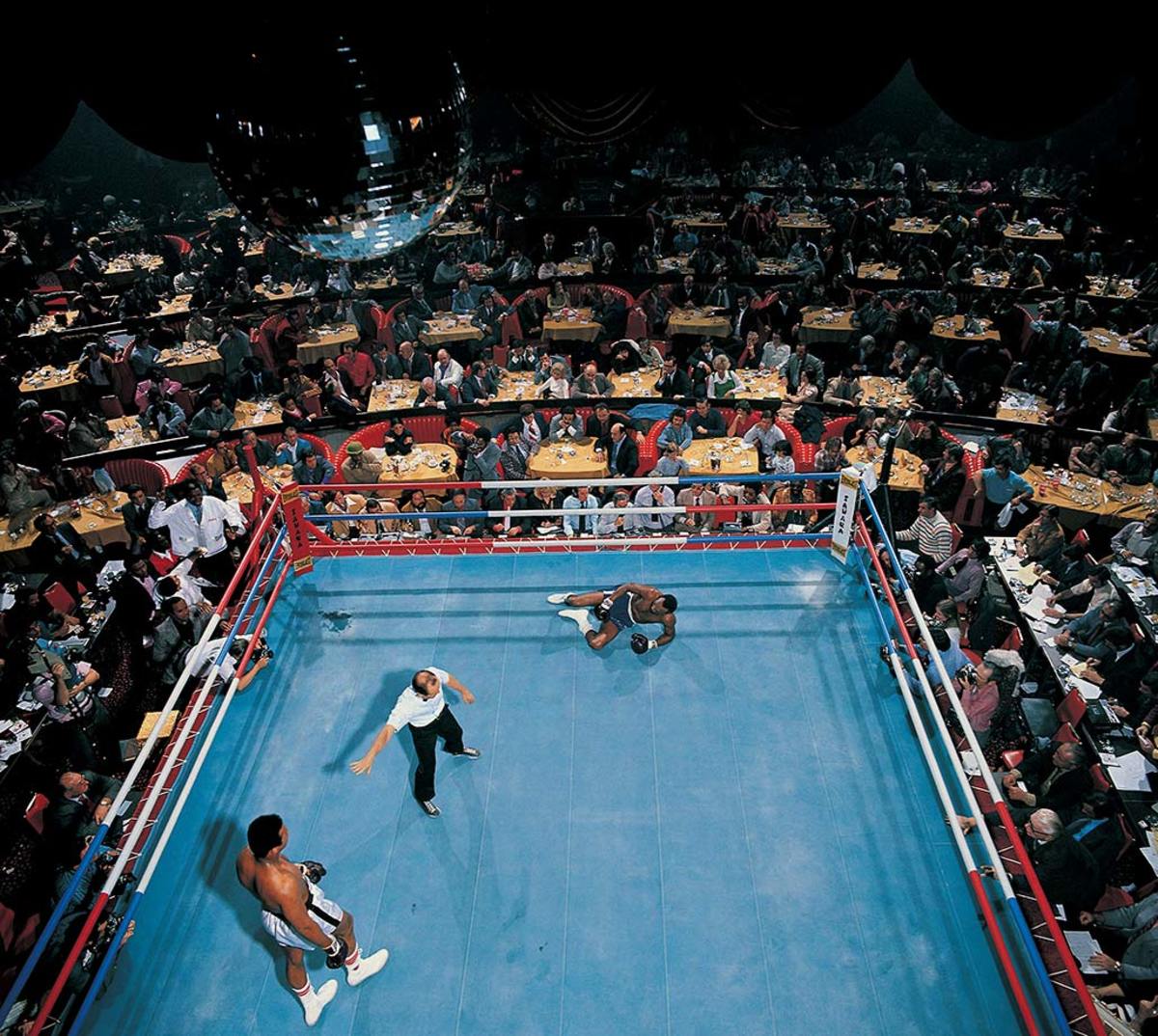
Foster lies on the canvas after getting knocked down by Ali. Ali knocked Foster down four times in the fifth round and twice more in the seventh round before he was finally counted out after Ali knocked him down again in the eighth round.
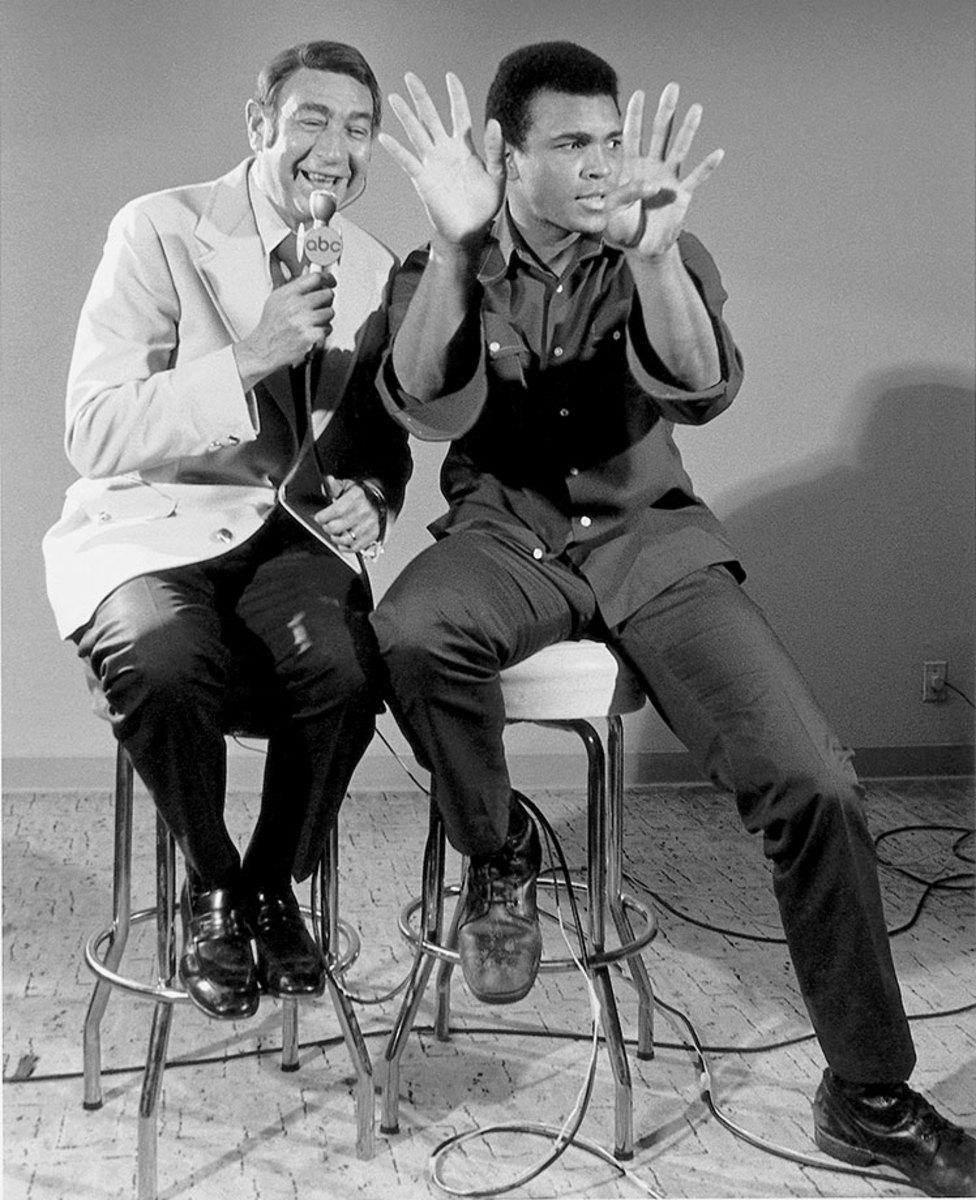
Ali sits with sportscaster Howard Cosell before his fight with Joe Bugner in February 1973. Although unable to knock Bugner out, Ali won comfortably by unanimous decision.
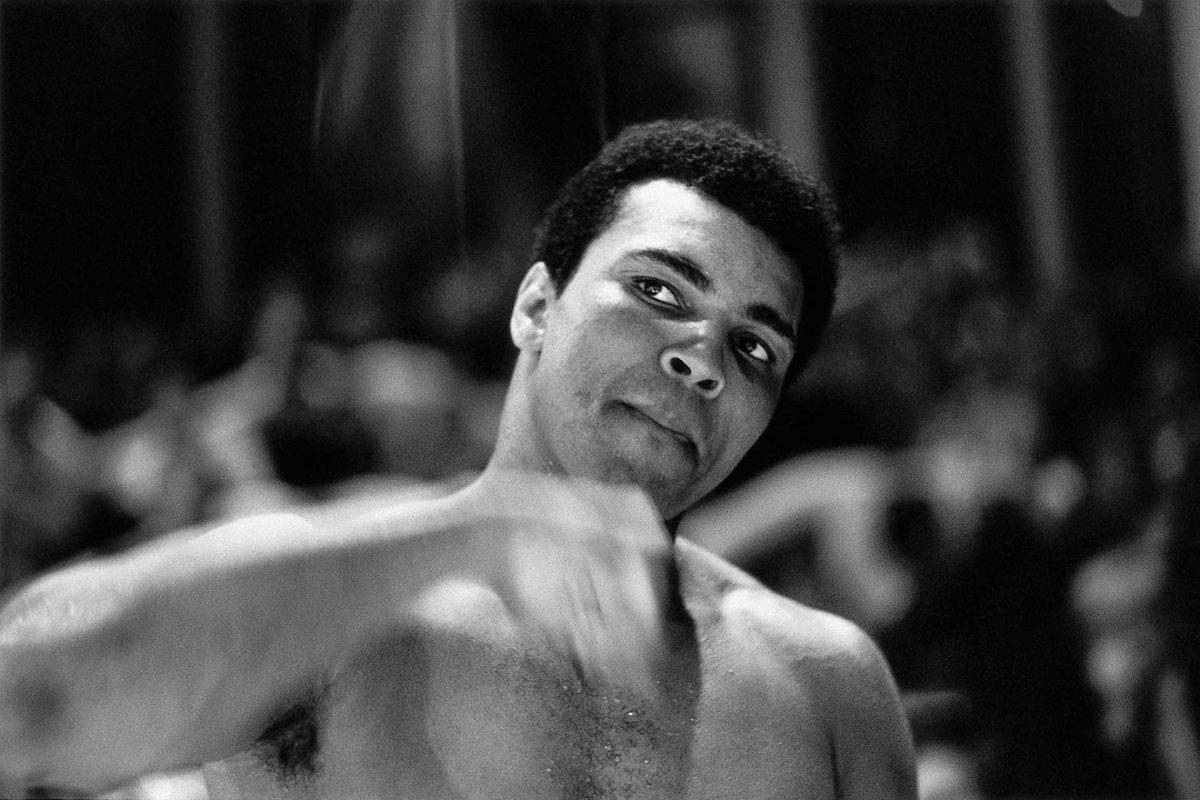
Ali hits a speed bag while warming up for his bout with Bugner in Las Vegas. Ali prepared ferociously for the fight, training 67 rounds the week leading up to the fight, including six rounds the day before the fight.
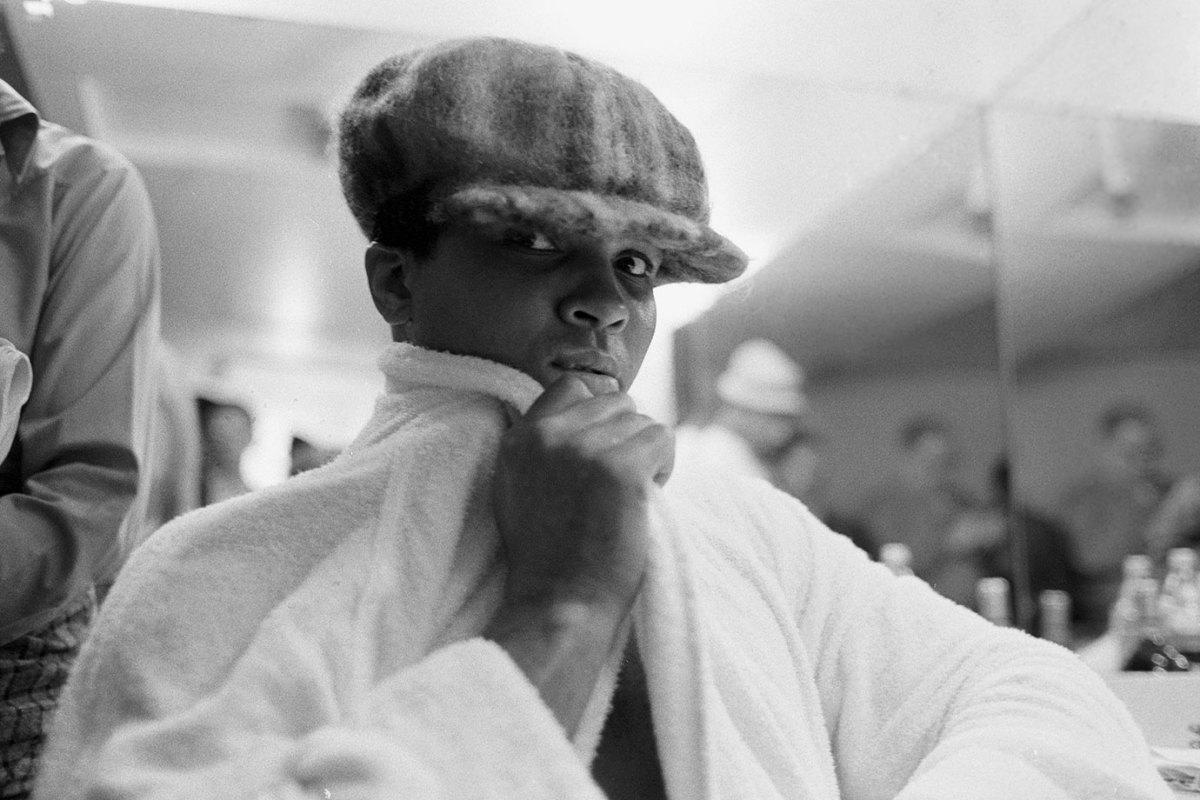
In a lighter pre-fight moment, Ali poses for a portrait wearing a hat in his dressing room before the match with Bugner.
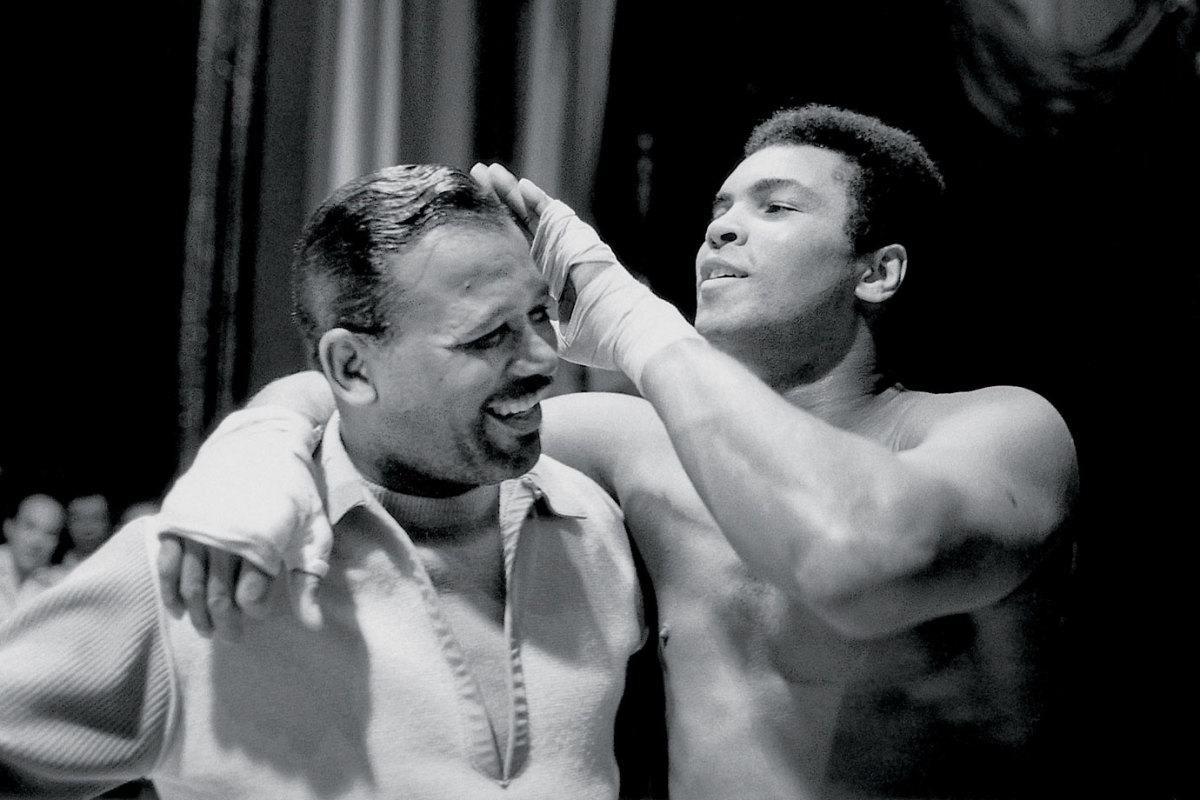
Ali plays with Sugar Ray Robinson's hair in the locker room before his bout with Bugner. The former welterweight and middleweight champion was Ali's childhood idol.
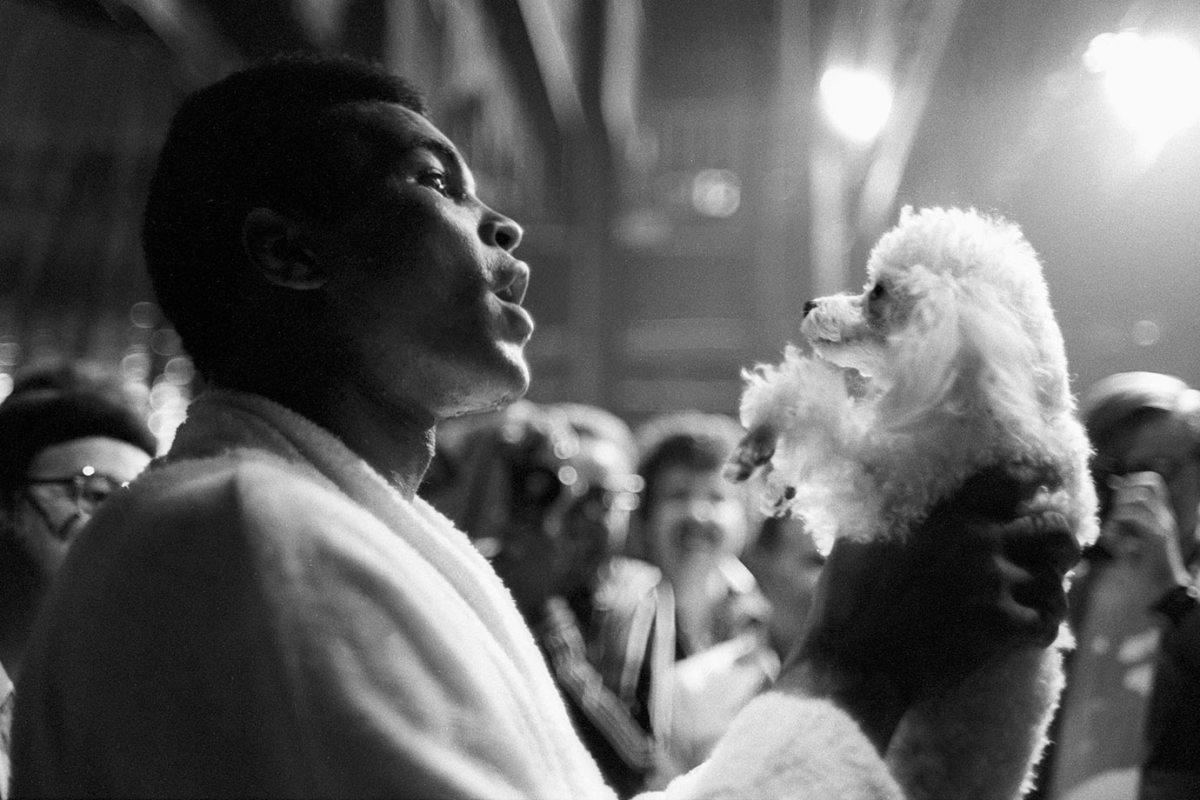
Before the fight with Bugner, Muhammad Ali enjoys a relaxed moment with a poodle at Caesars Palace Hotel. He won the fight with Bugner by unanimous decision.
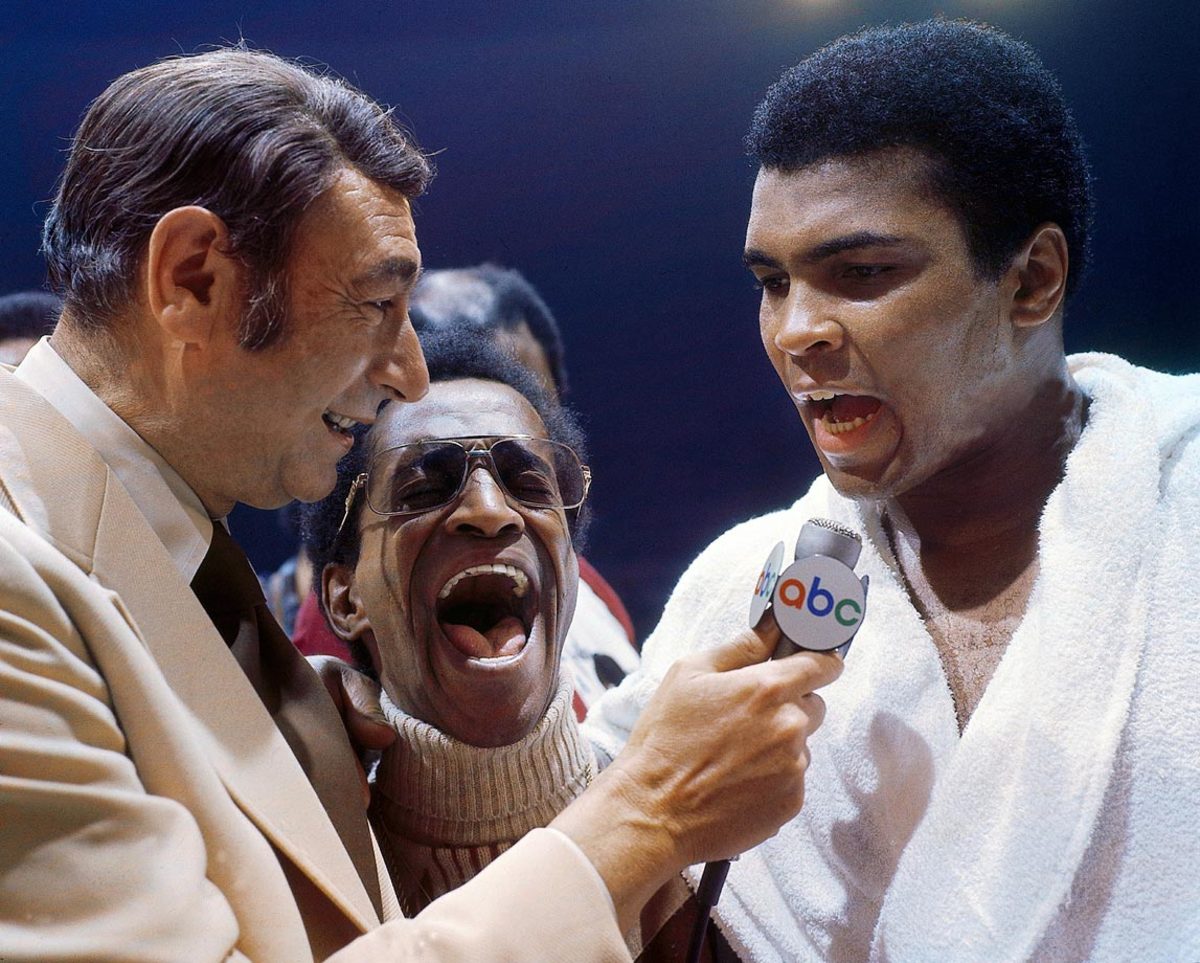
Howard Cosell interviews Ali, with entertainer Sammy Davis Jr. in the middle, after his victory over Joe Bugner by unanimous decision in. Although the fight was never in jeopardy of getting away from him, Ali praised Bugner's legs and said he could be a champion in a few years.
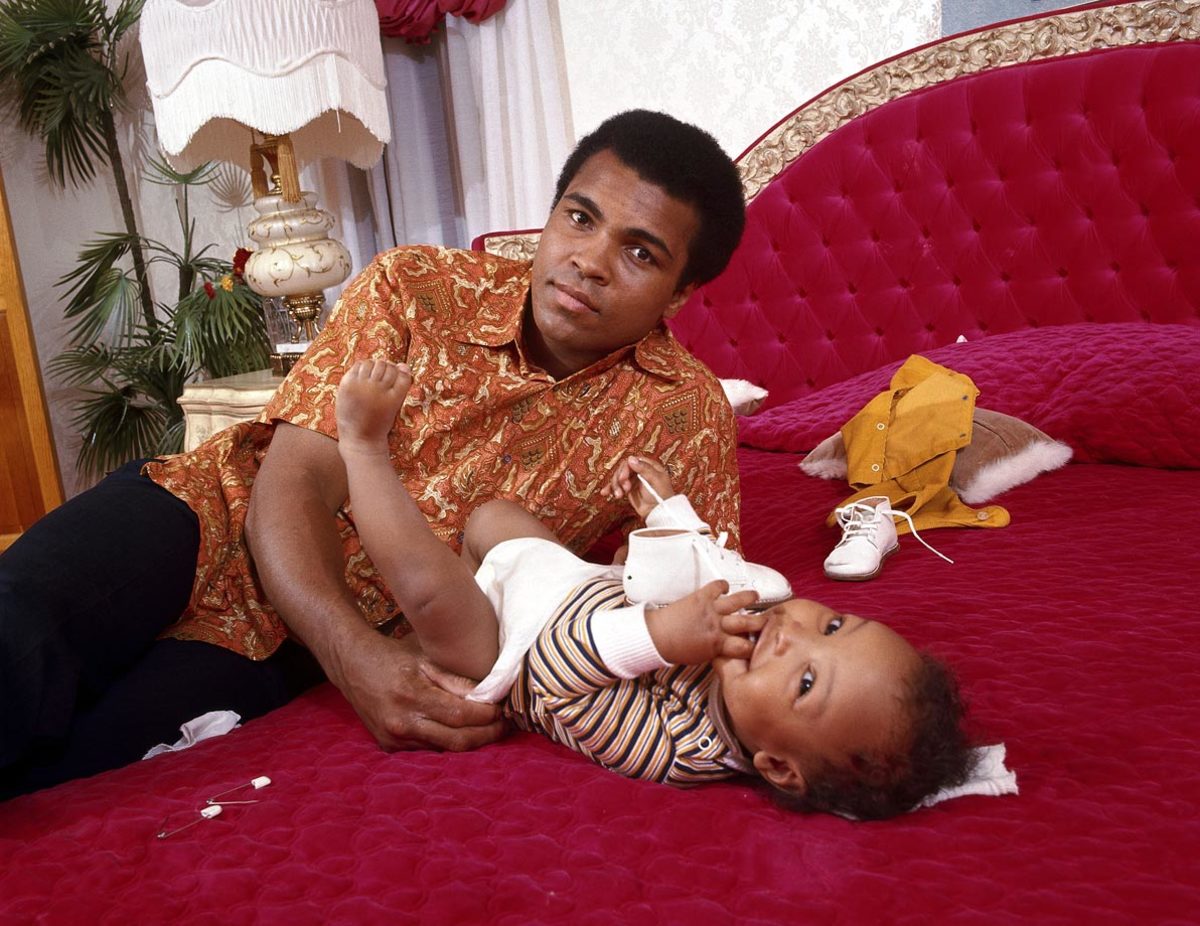
Ali changes the diaper of his son in his bedroom during a photo shoot at the family's home in April 1973. Ali had suffered a broken jaw less than a month earlier in his fight against Ken Norton.
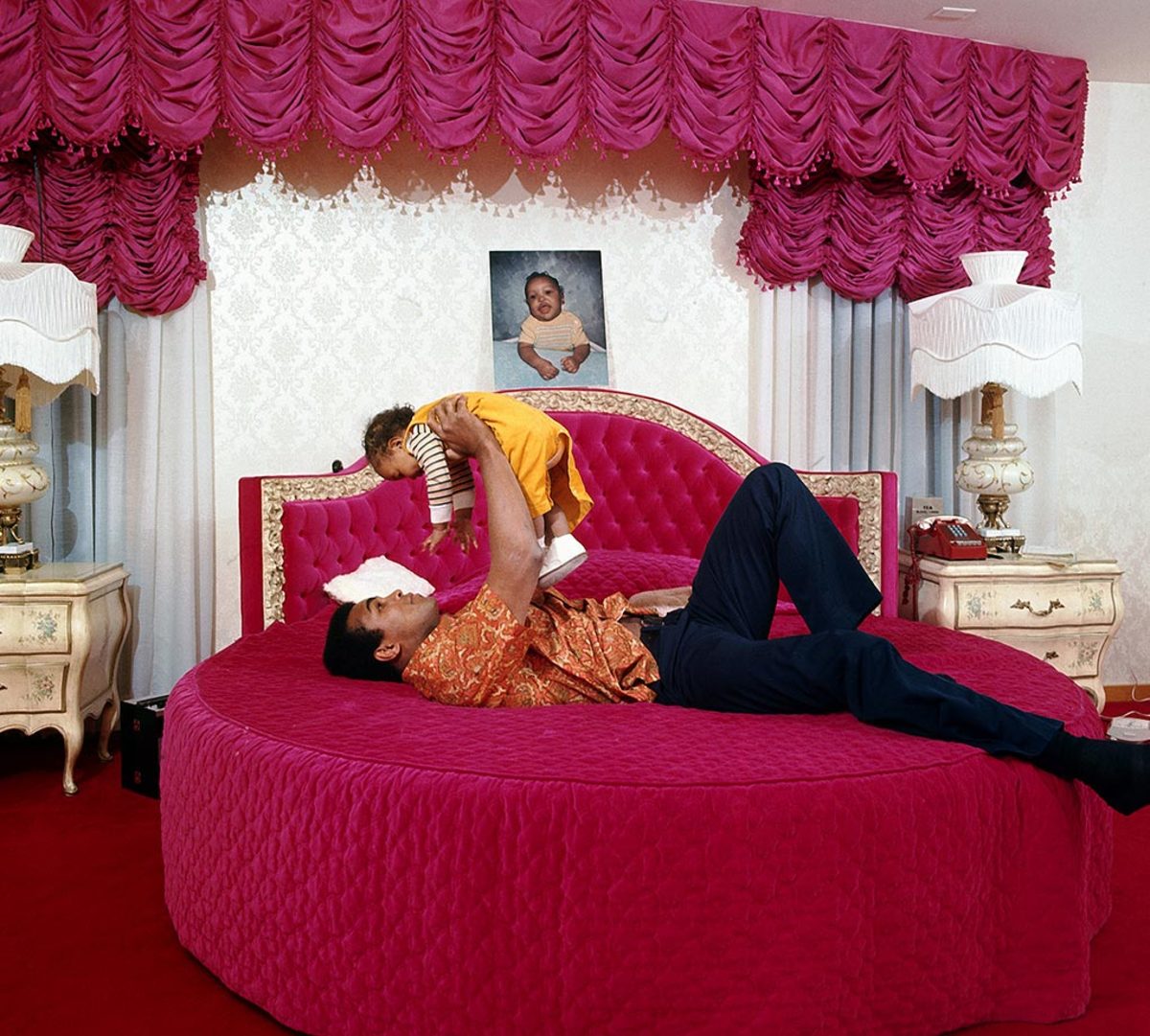
In the wake of his split decision loss to Norton, Ali plays with his son in his bedroom at home in Cherry Hill, N.J.
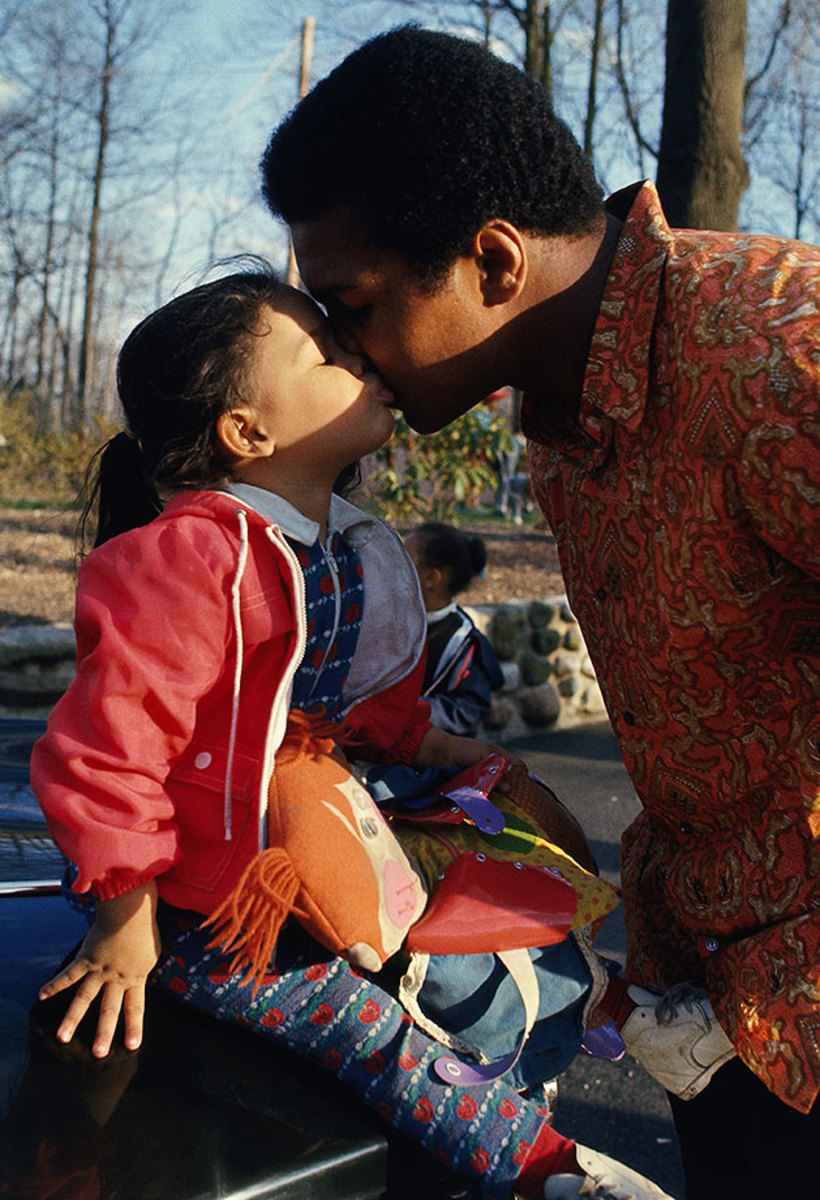
Ali kisses his daughter Jamillah outside of their home following the loss to Norton, just the second defeat of his career.
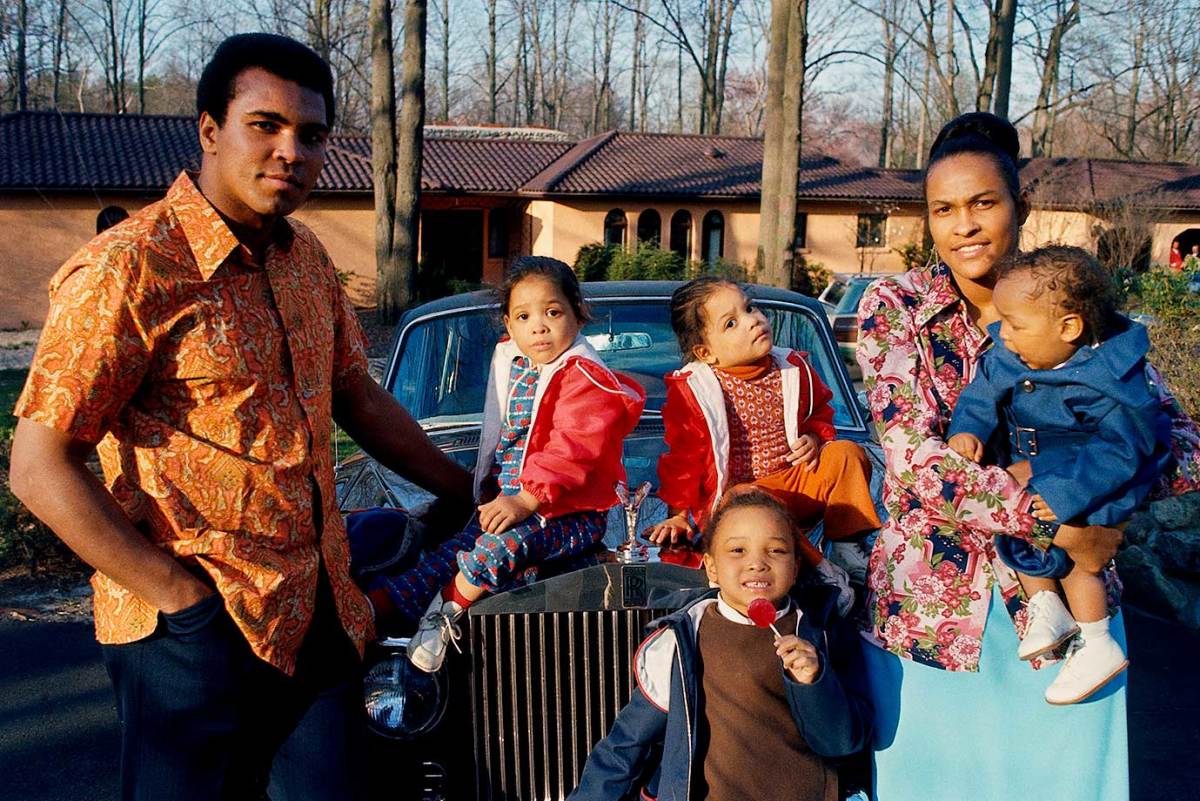
The Ali family standing outside their New Jersey home. To the right of Muhammad Ali are his twin daughters, Jamilllah and Rasheda, daughter Maryum and his wife, Khalilah, holding their son Ibn Muhammad Ali Jr.
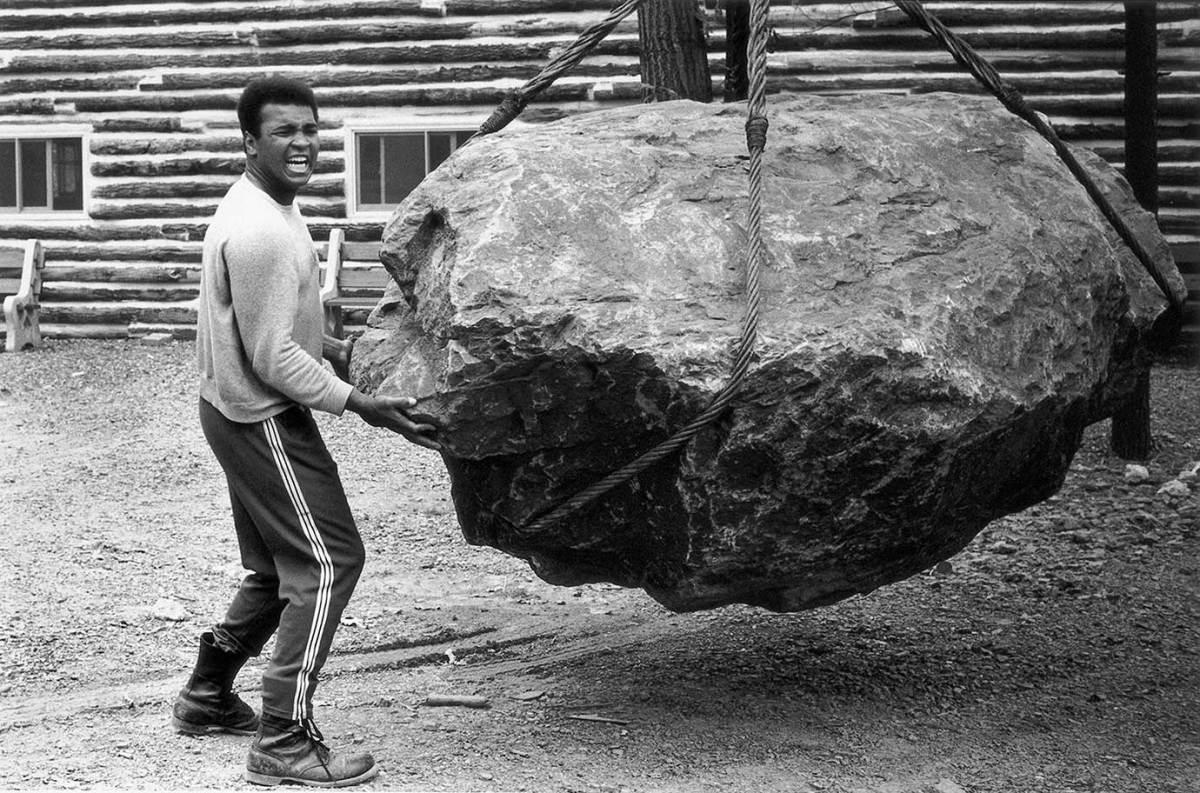
At his training camp cabin, Ali pushes a boulder during a photo shoot in Deer Lake, Penn., in August 1973. Ali was training for his rematch against Ken Norton, who broke his jaw five months earlier.
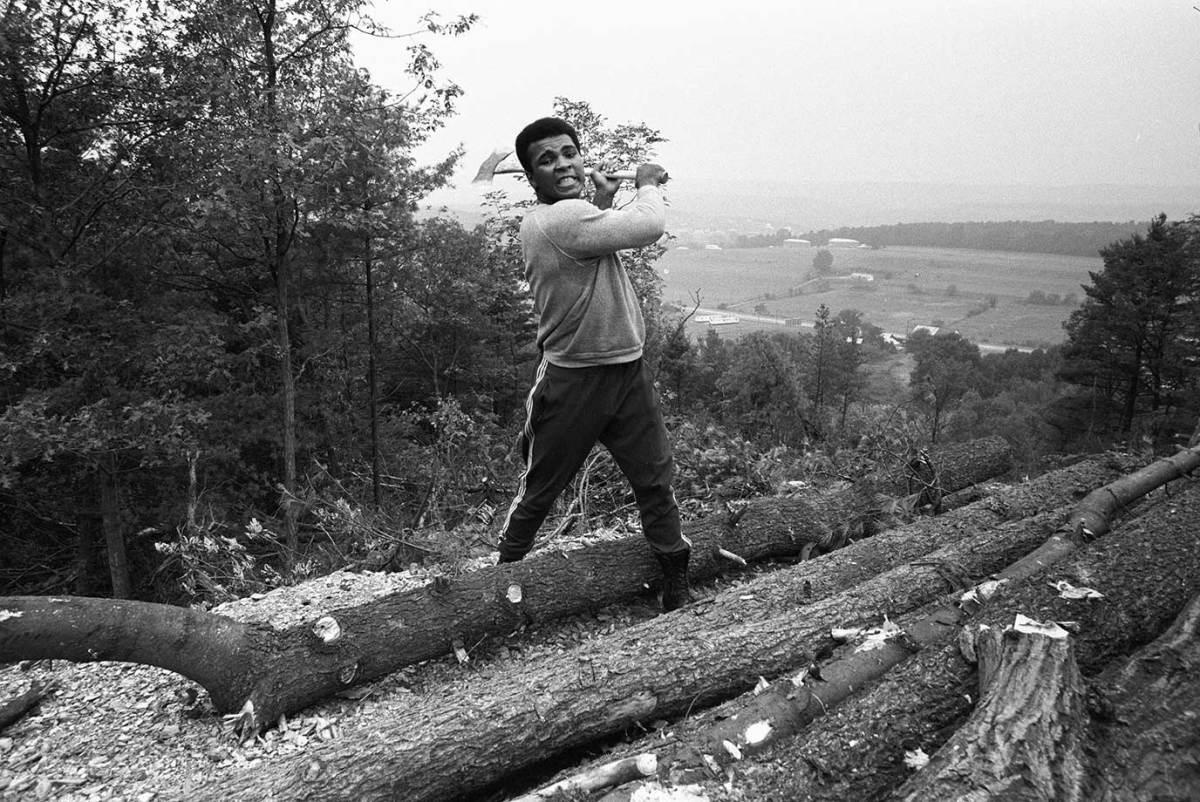
Ali chops wood at his cabin in Deer Lake. He referred to the training camp as "fighter's heaven" and used it to prepare for fights away from the spotlight.
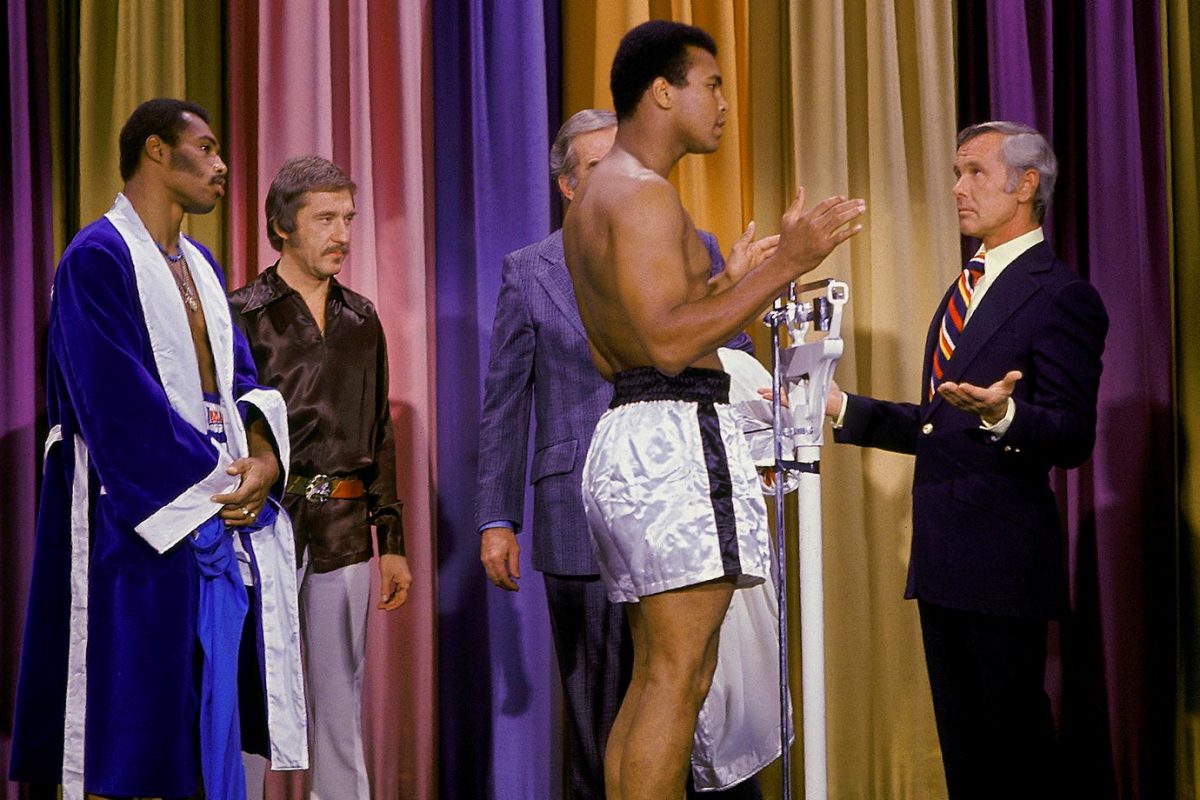
The fighters weigh in on the Tonight Show with Johnny Carson ahead of Ali and Ken Norton's September 1973 fight.
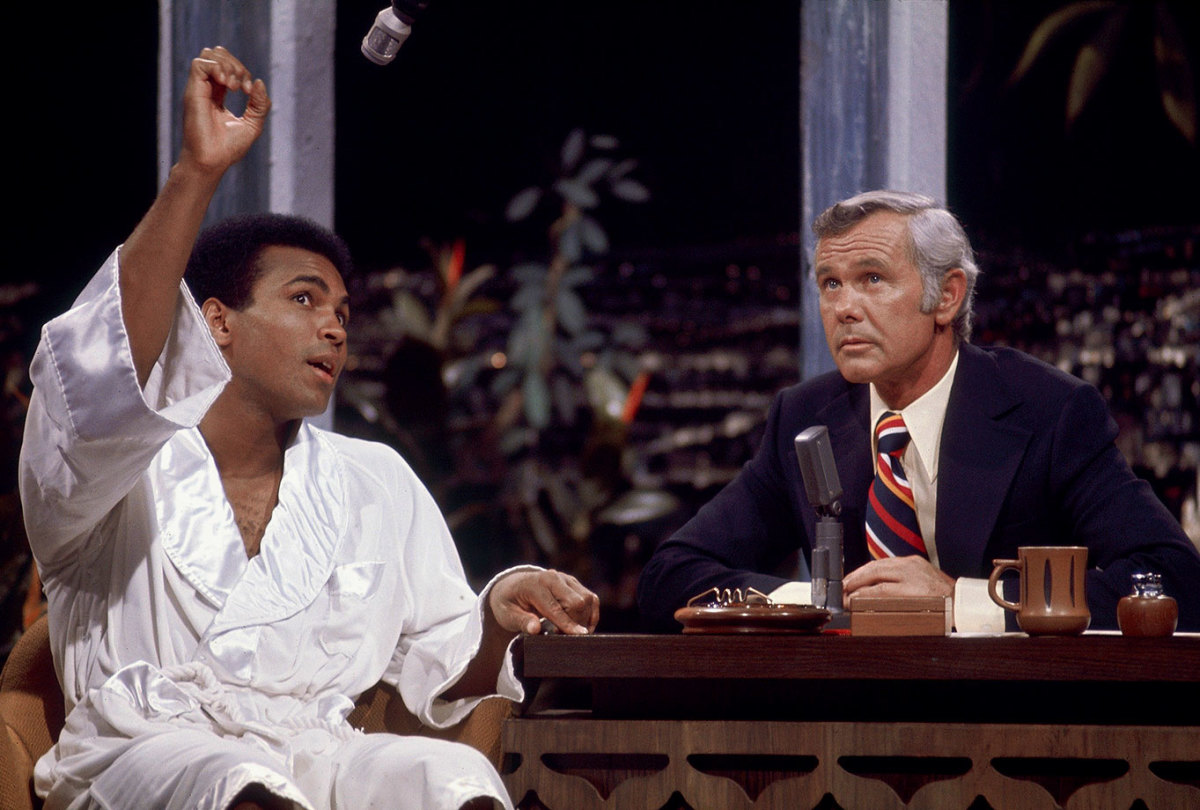
Johnny Carson listens to Ali on the Tonight Show three days before his rematch with Norton. Ali would avenge his earlier loss to Norton, winning a narrow split decision.
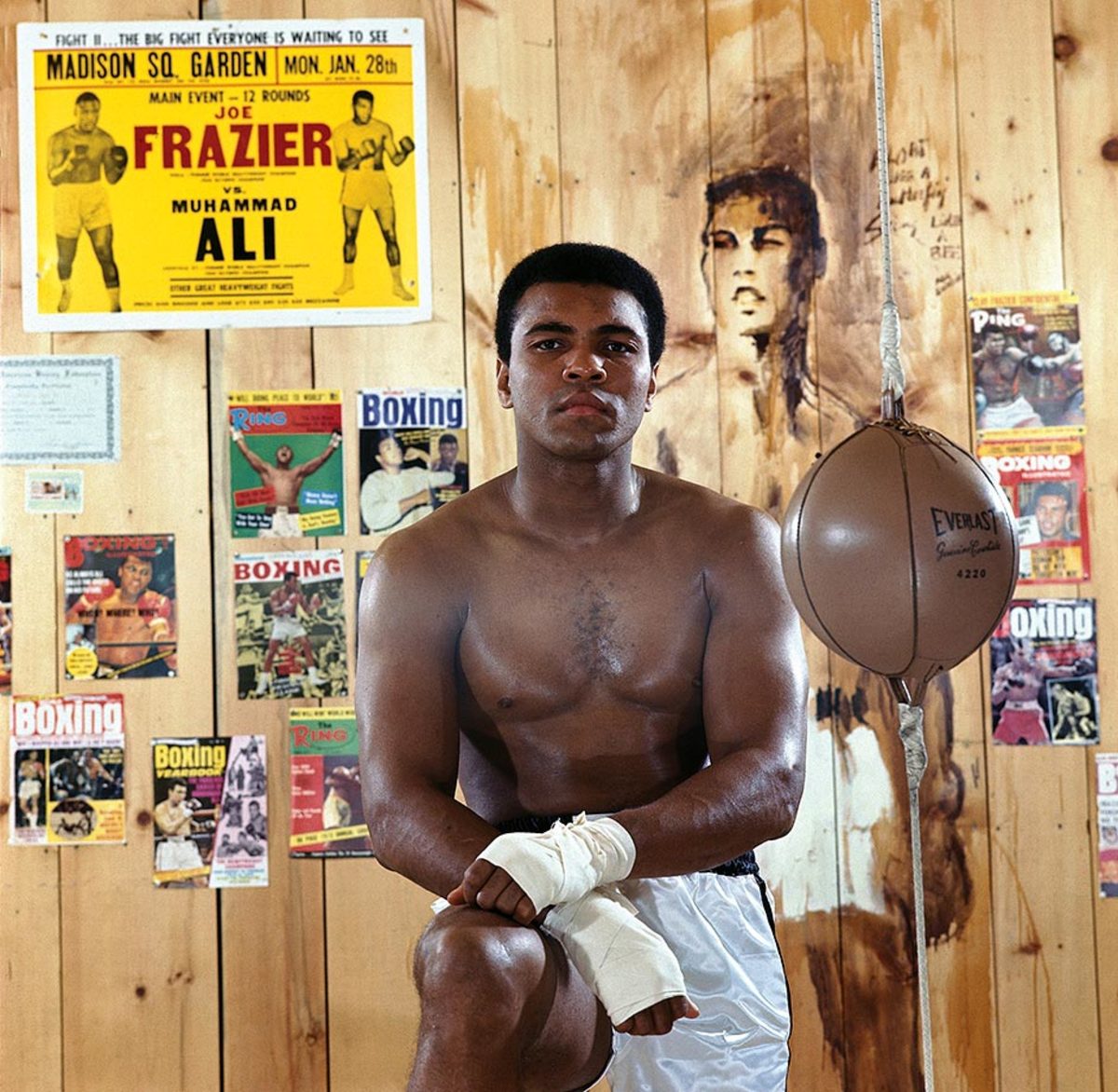
Ali poses in front of posters and magazine covers from throughout his career at his training camp cabin in Deer Lake in 1974.
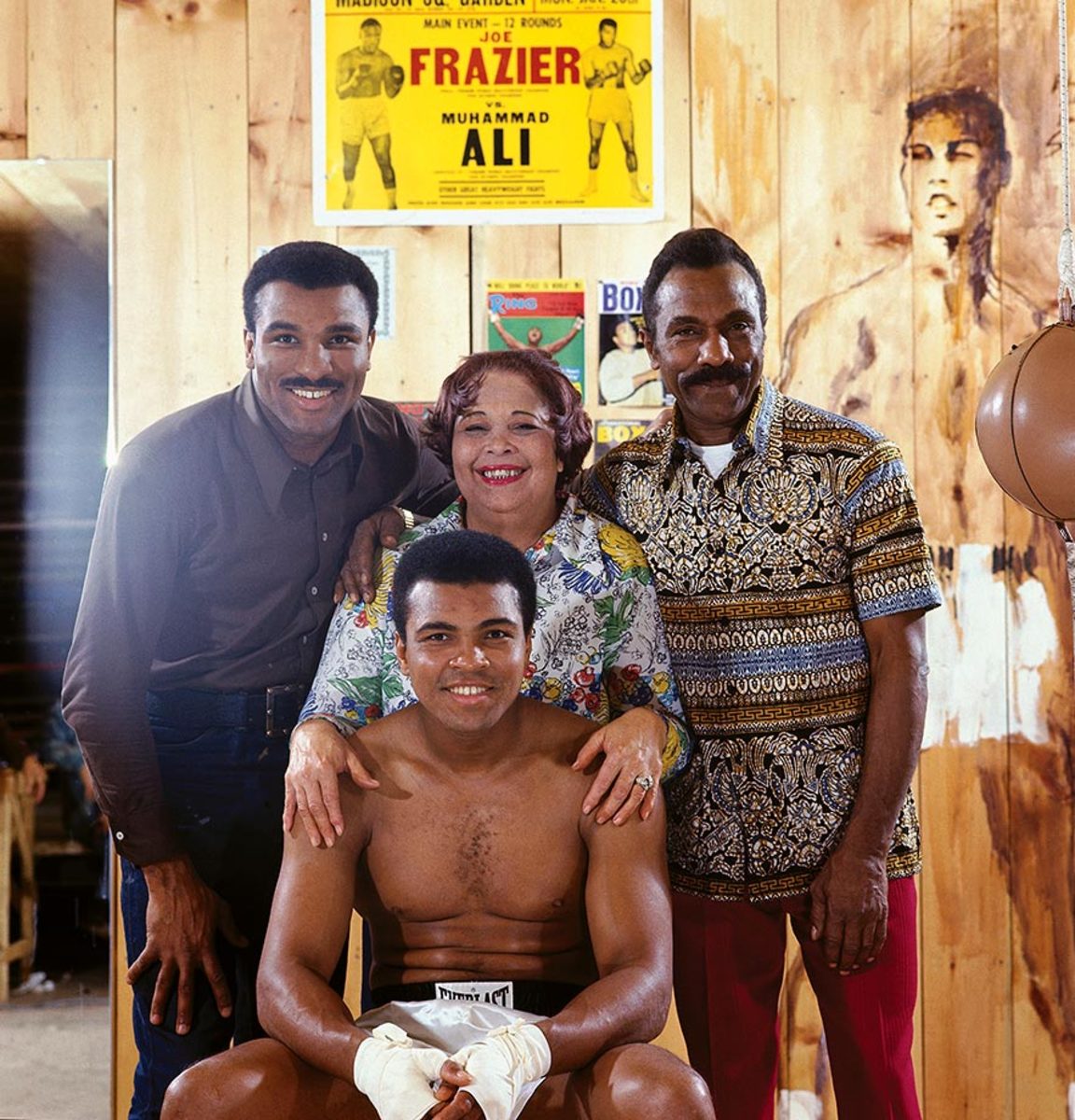
Ali poses with members of his family in front of a poster from his first fight with Joe Frazier. Ali's brother, Rahman Ali; mother, Odessa Clay; and father, Cassius Clay Sr. stand behind the boxer.
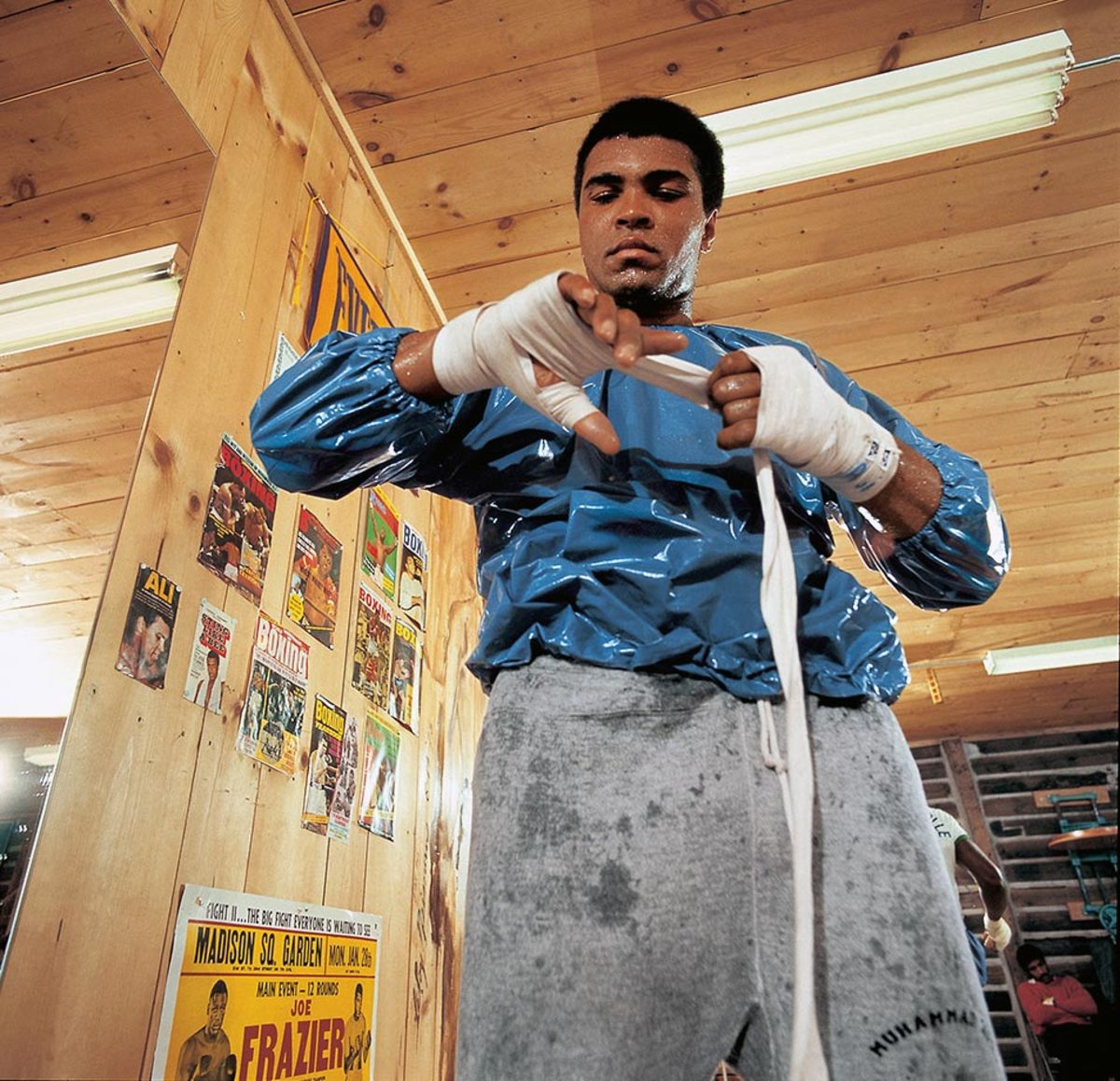
Less than three weeks before his rematch with Joe Frazier on Jan. 28, 1974, Ali wraps his hands while wearing a sauna suit at his training camp cabin.
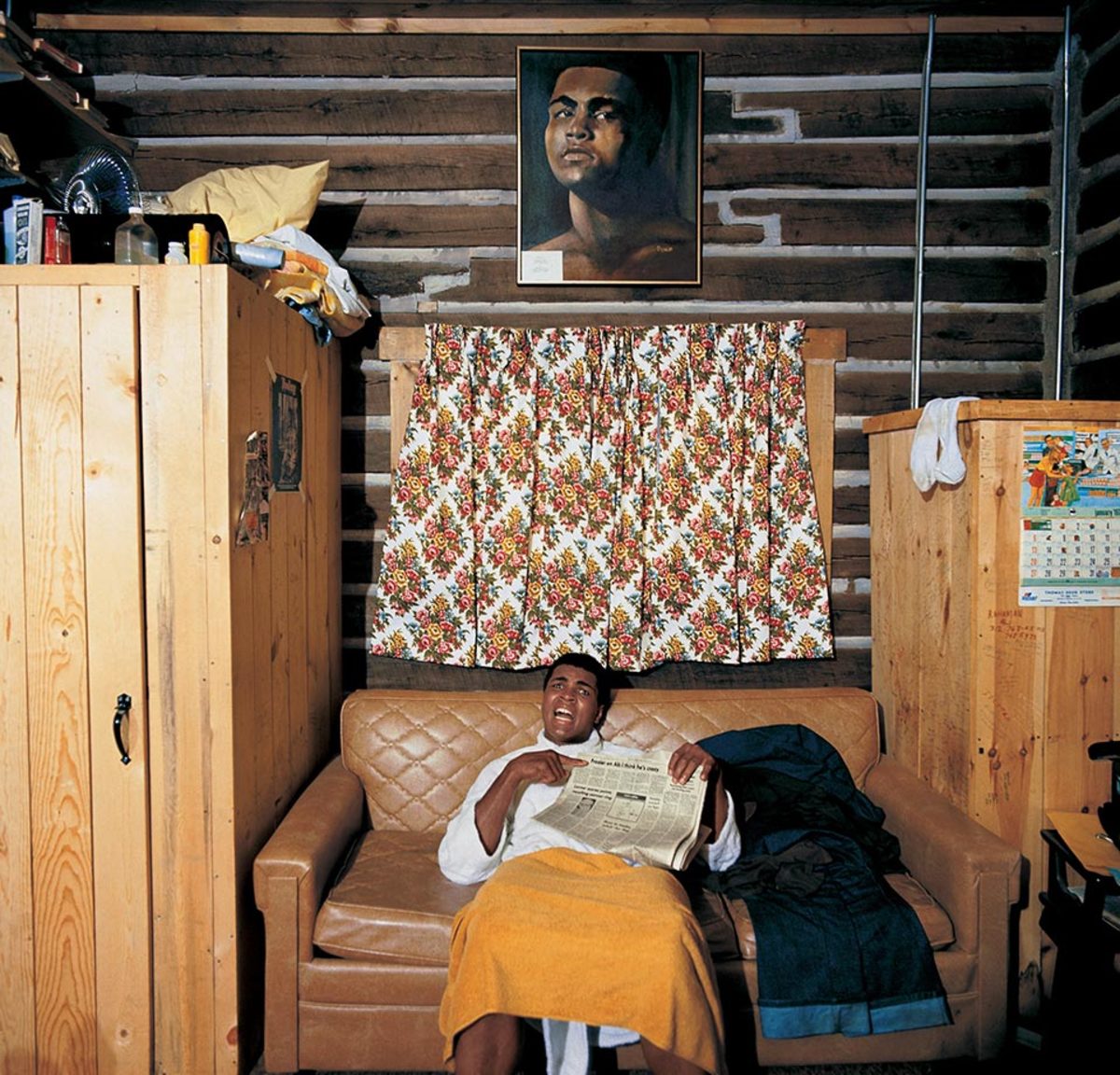
Ali holds a newspaper at his cabin in January 1974. He is pointing to a headline that reads, "Frazier On Ali, I Think He's Crazy." Ali and Frazier fought for the second time later that month with Ali winning by a unanimous decision.
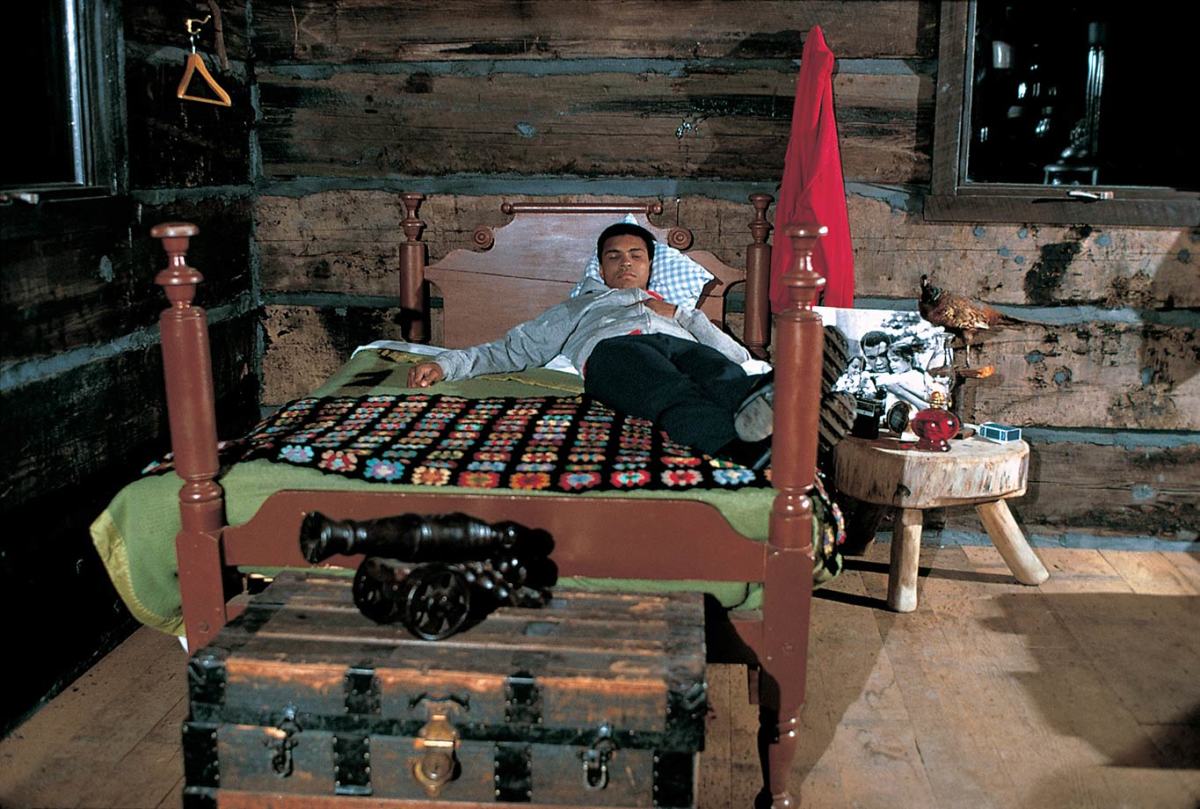
Ali lies on his bed at his cabin during the January 1974 photo shoot.
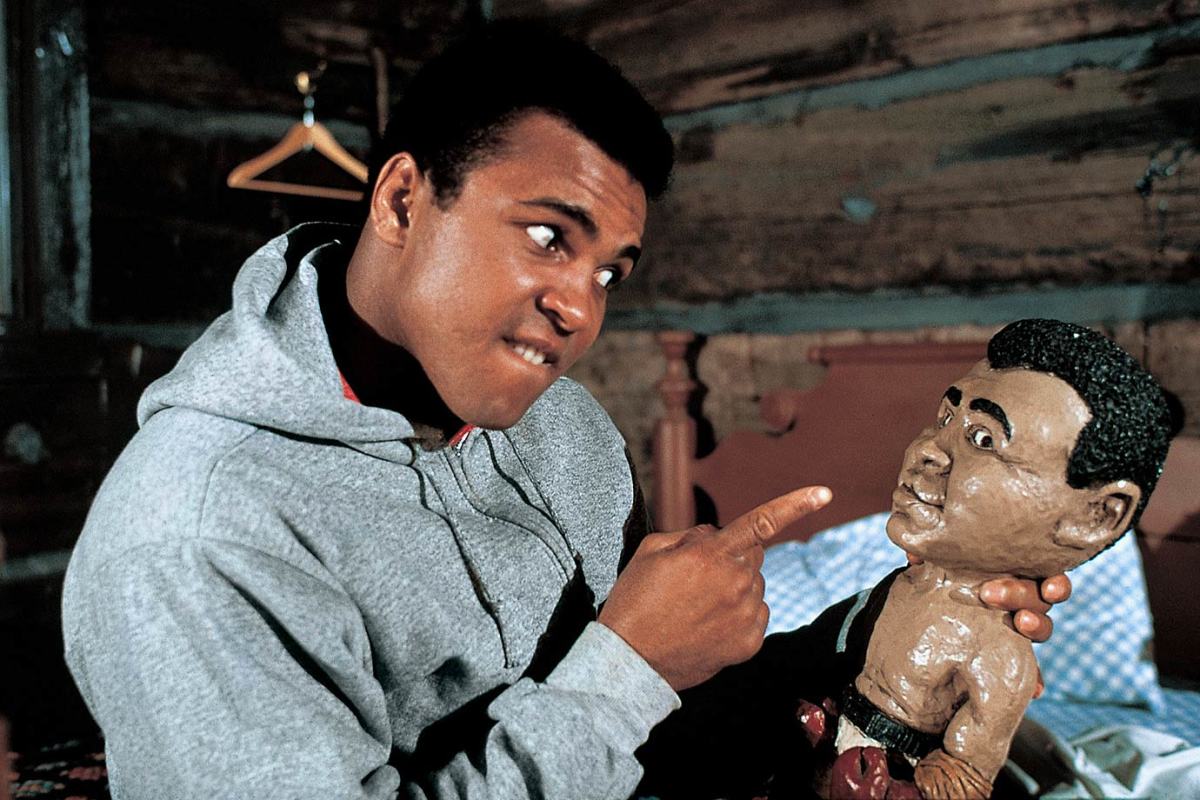
His smaller incarnation stares straight back as Ali plays with a doll of himself during the same 1974 shoot at his training camp cabin.
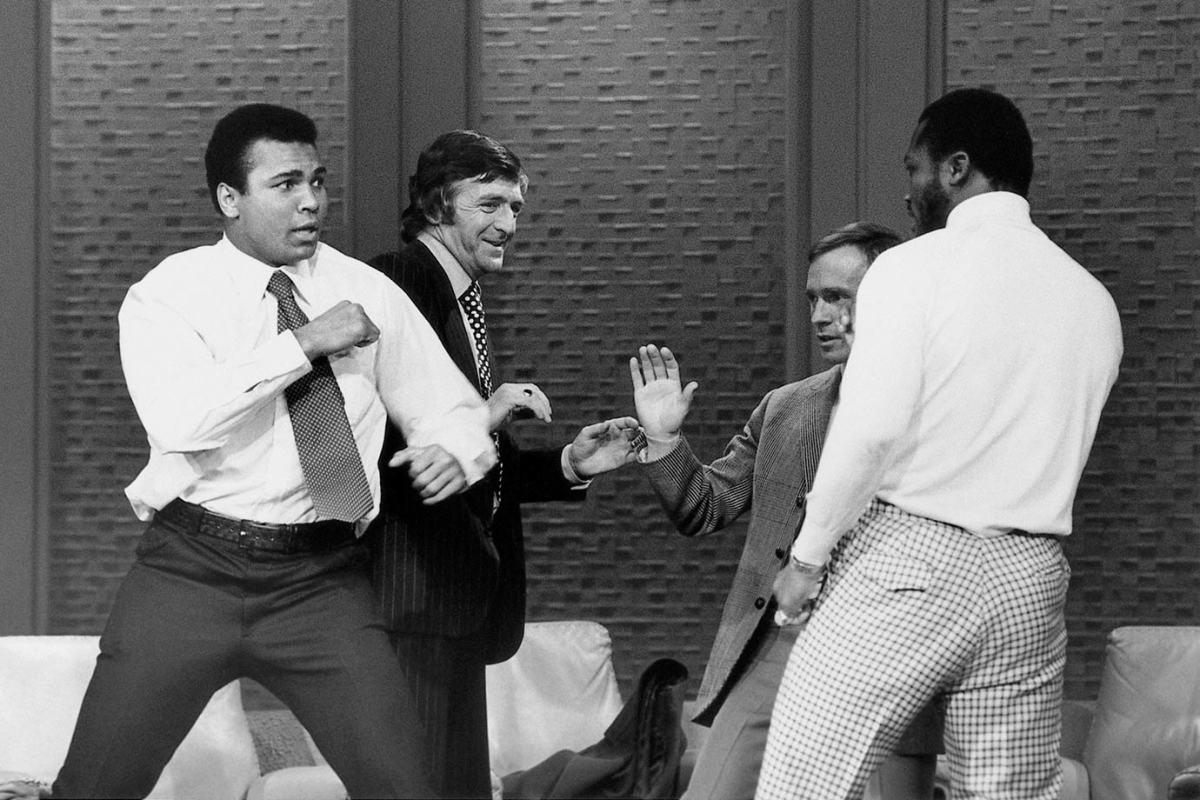
Ali and Joe Frazier fight on the set of The Dick Cavett Show while reviewing their 1971 bout in advance of their 1974 rematch. Ali called Frazier ignorant, to which Frazier took exception. As the studio crew tried to calm Frazier down, Ali held Frazier by the neck, forcing him to sit down and sparking a fight. The television set fight amped up anticipation of their January 1974 bout.
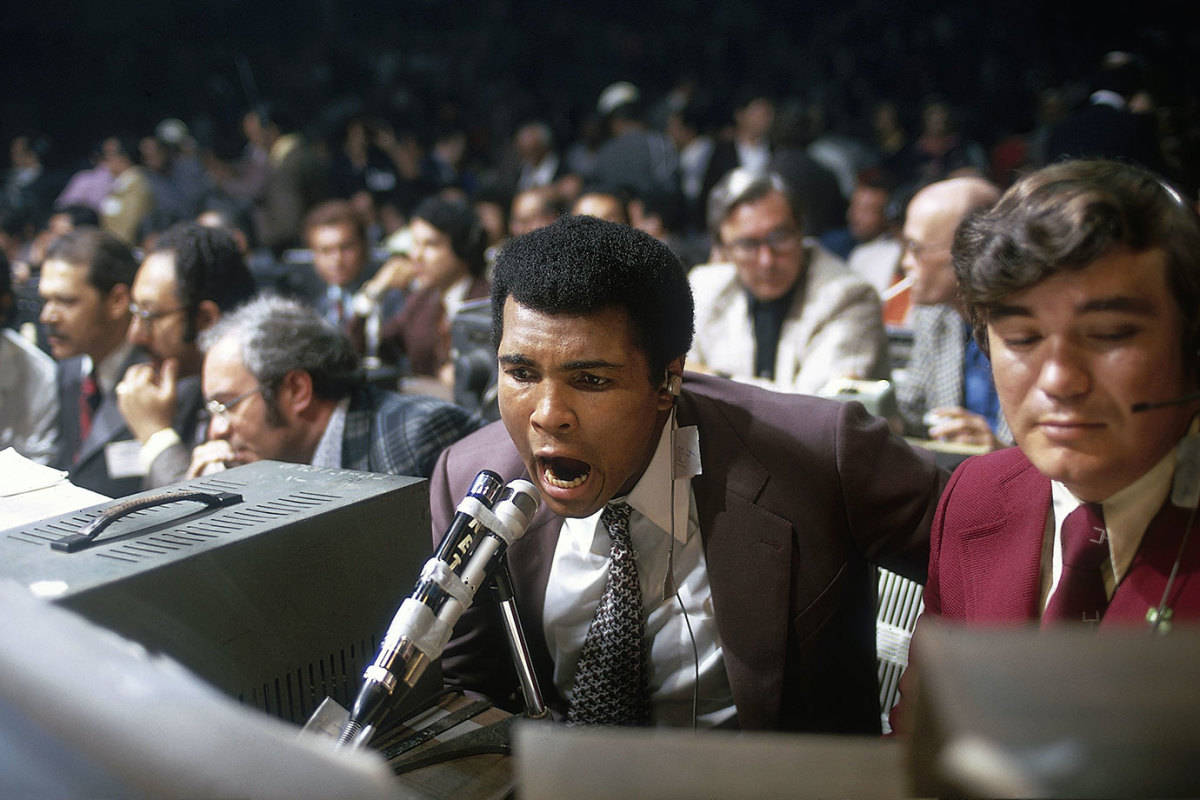
Exploring a different side of the sport, Ali broadcasts the fight between George Foreman and Ken Norton in March 1974. Foreman won the fight by technical knockout in the second round, setting up the showdown with Ali in Zaire.
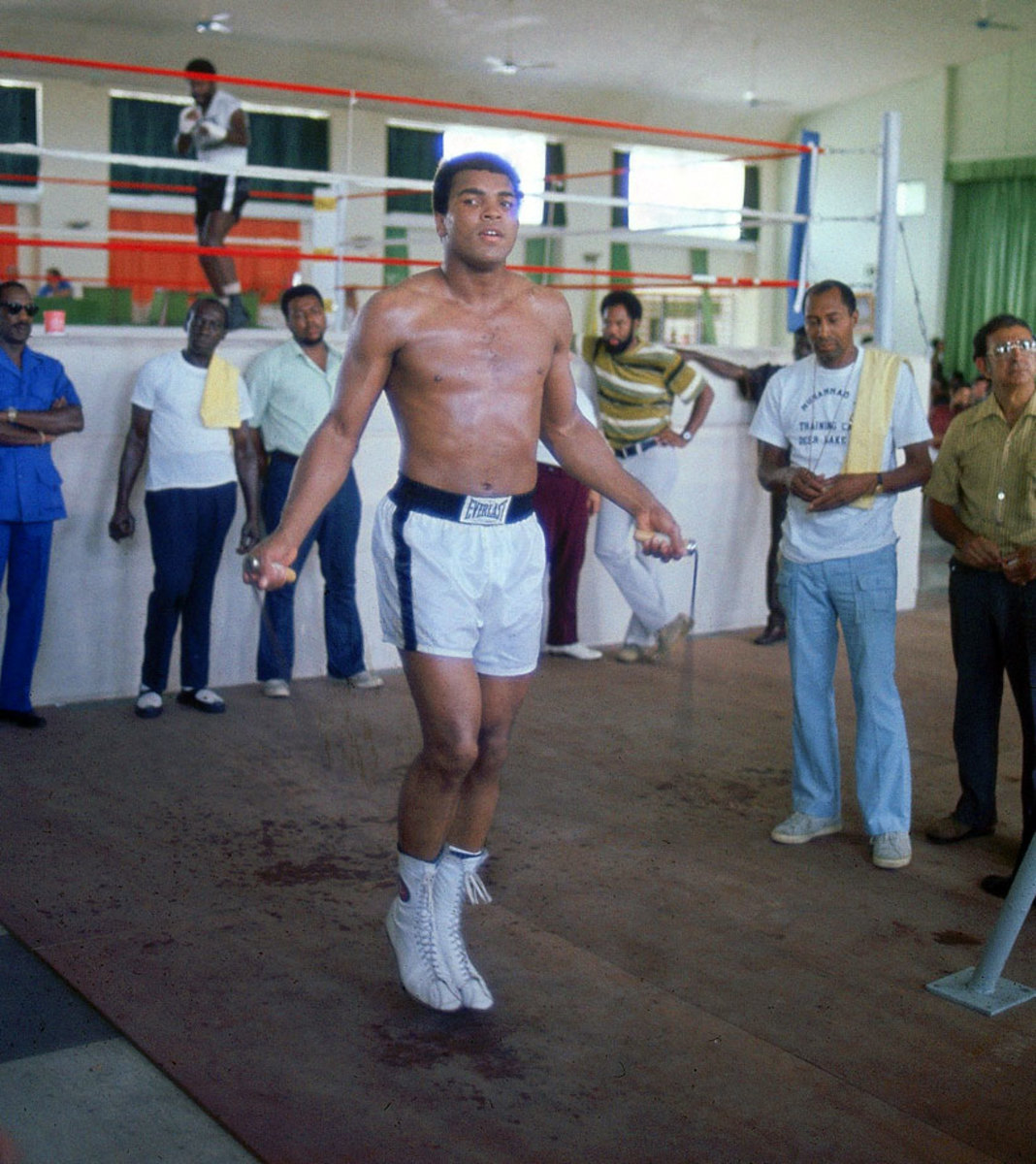
Ali jumps rope at the Salle de Congres in Kinshasa, Zaire, while training for his heavyweight title fight against George Foreman. Both Ali and Foreman spent most of the summer of 1974 training in Zaire to adjust to the climate.
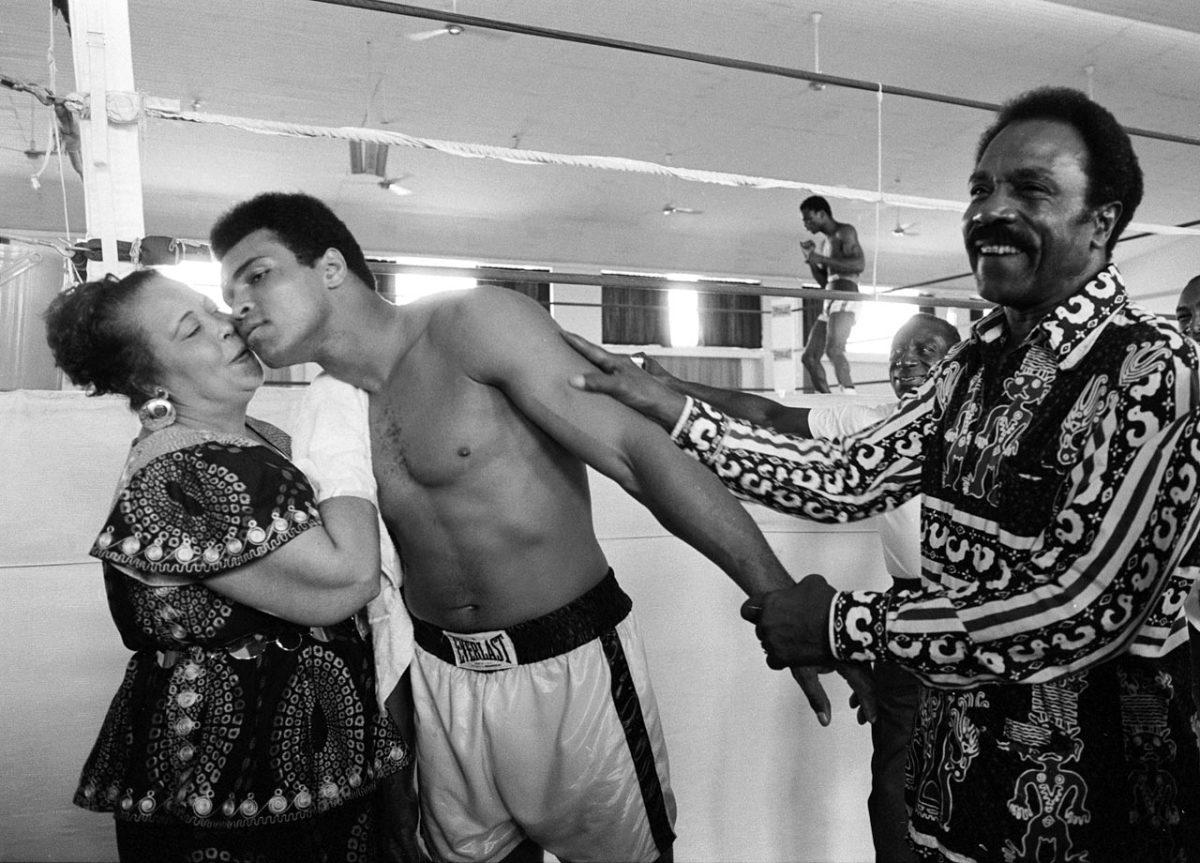
While training before his fight with George Foreman, Ali kisses his mother, Odessa Clay, while his father, Cassius Clay Sr., looks on. Ali's superior strategy and ability to take a punch led him to his upset victory as he absorbed body blows from Foreman before he responded with powerful combinations to Foreman's head.
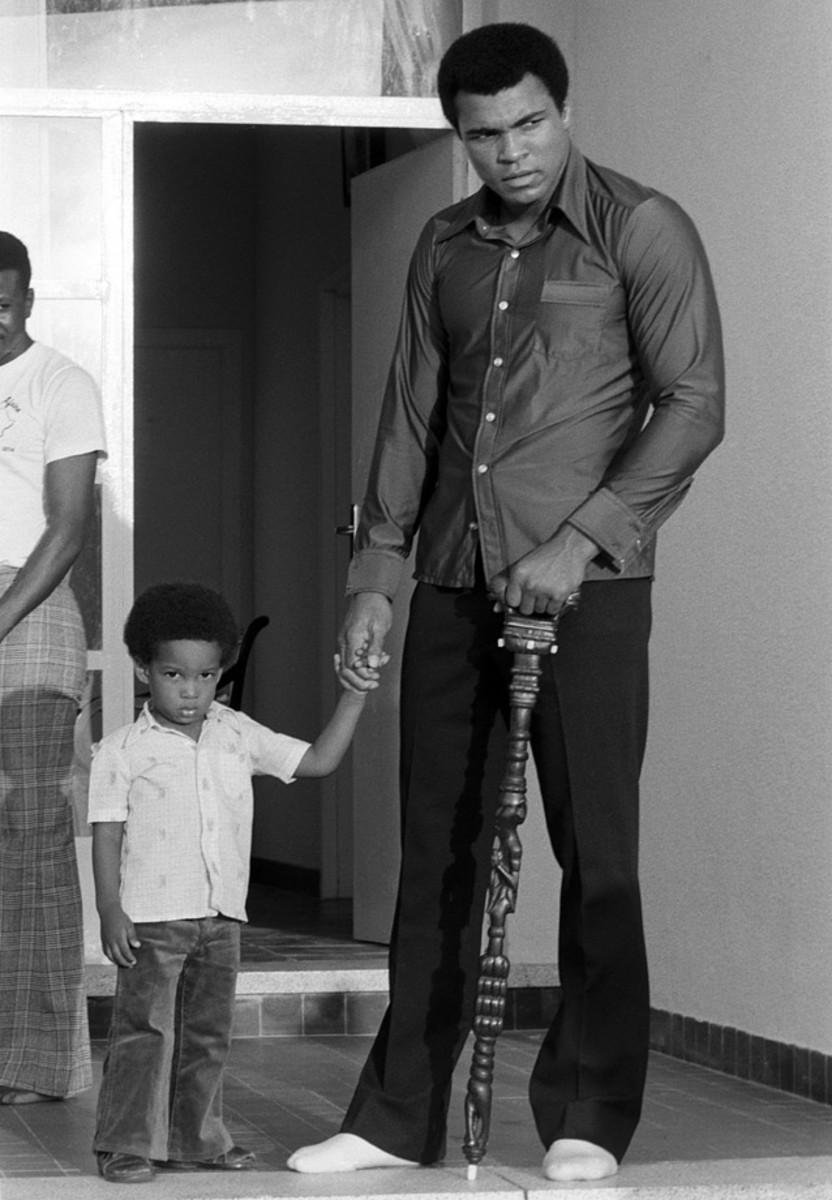
Four days before the fight, Ali holds the hand of his son Ibn in Zaire. Ali successfully courted the favor of the Zaire crowd, prompting chants of "Ali bomaye!" — translated as "Ali, kill him!"
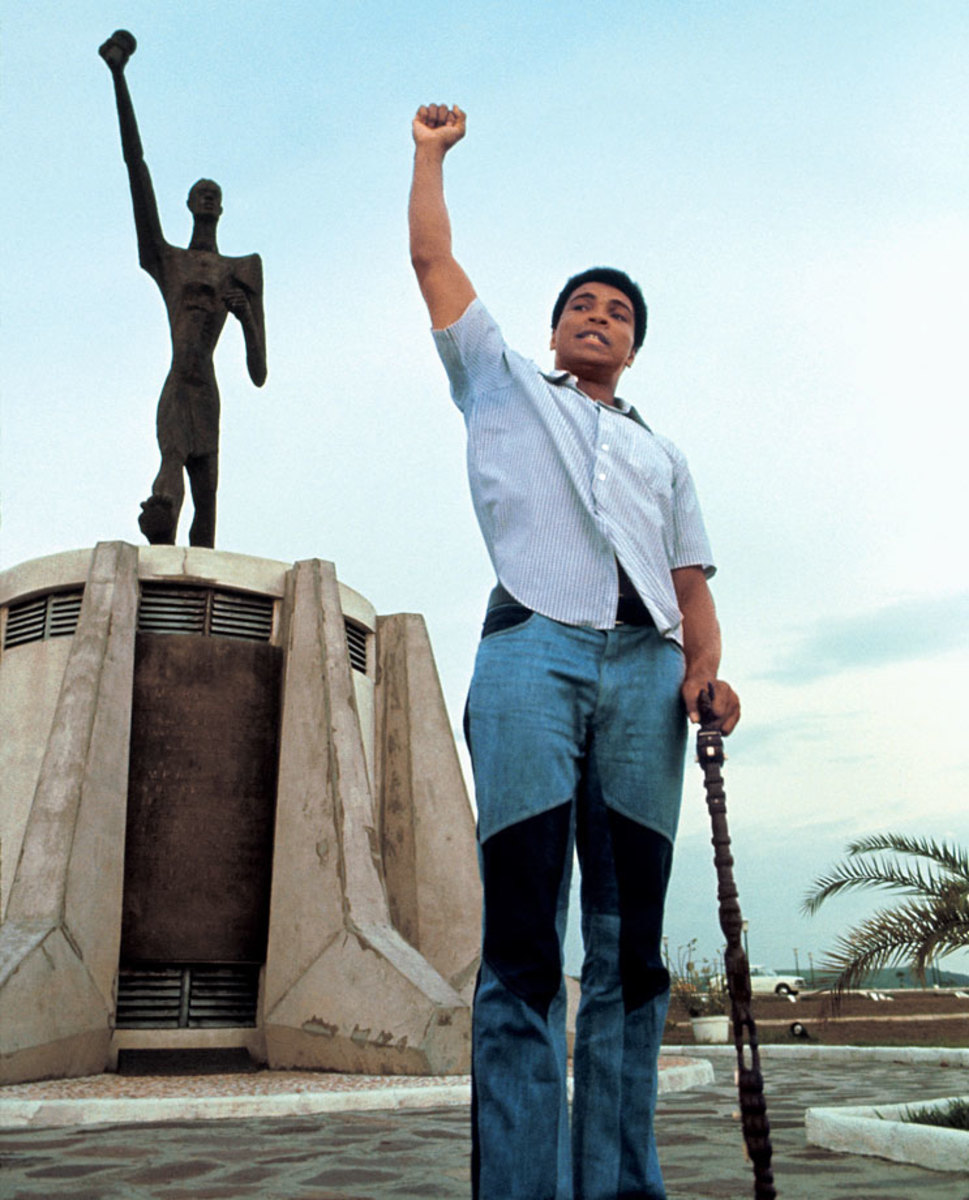
Ali poses in front of the Le Militant statue at the presidential complex that was the site of Ali's January heavyweight title bout with Foreman. The fight was originally set for a month earlier, but Foreman suffered a cut near his eye during training, forcing a delay.
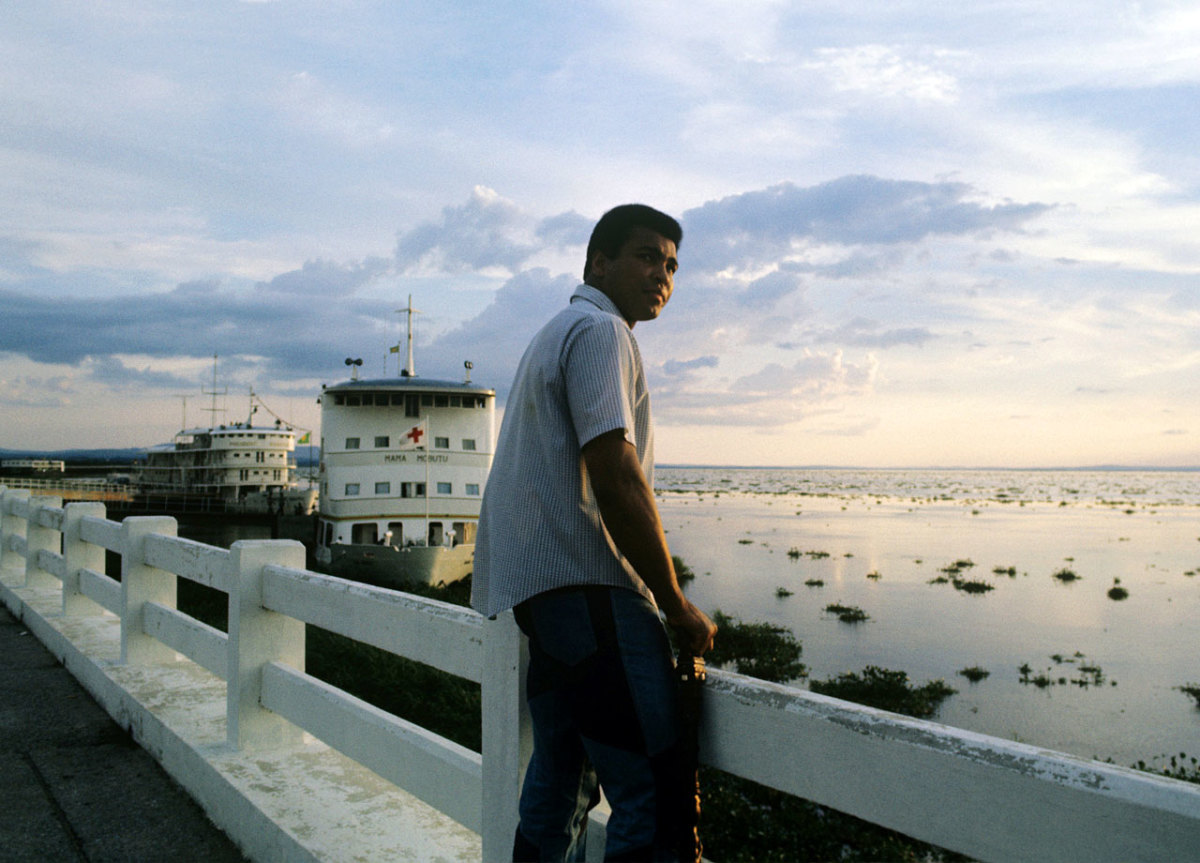
Ali stands against the railing on the River Zaire watching the sunset four days before the Rumble in the Jungle. The fight was sponsored by Zaire to achieve the $5 million purse promoter Don King had promised both Ali and Foreman.
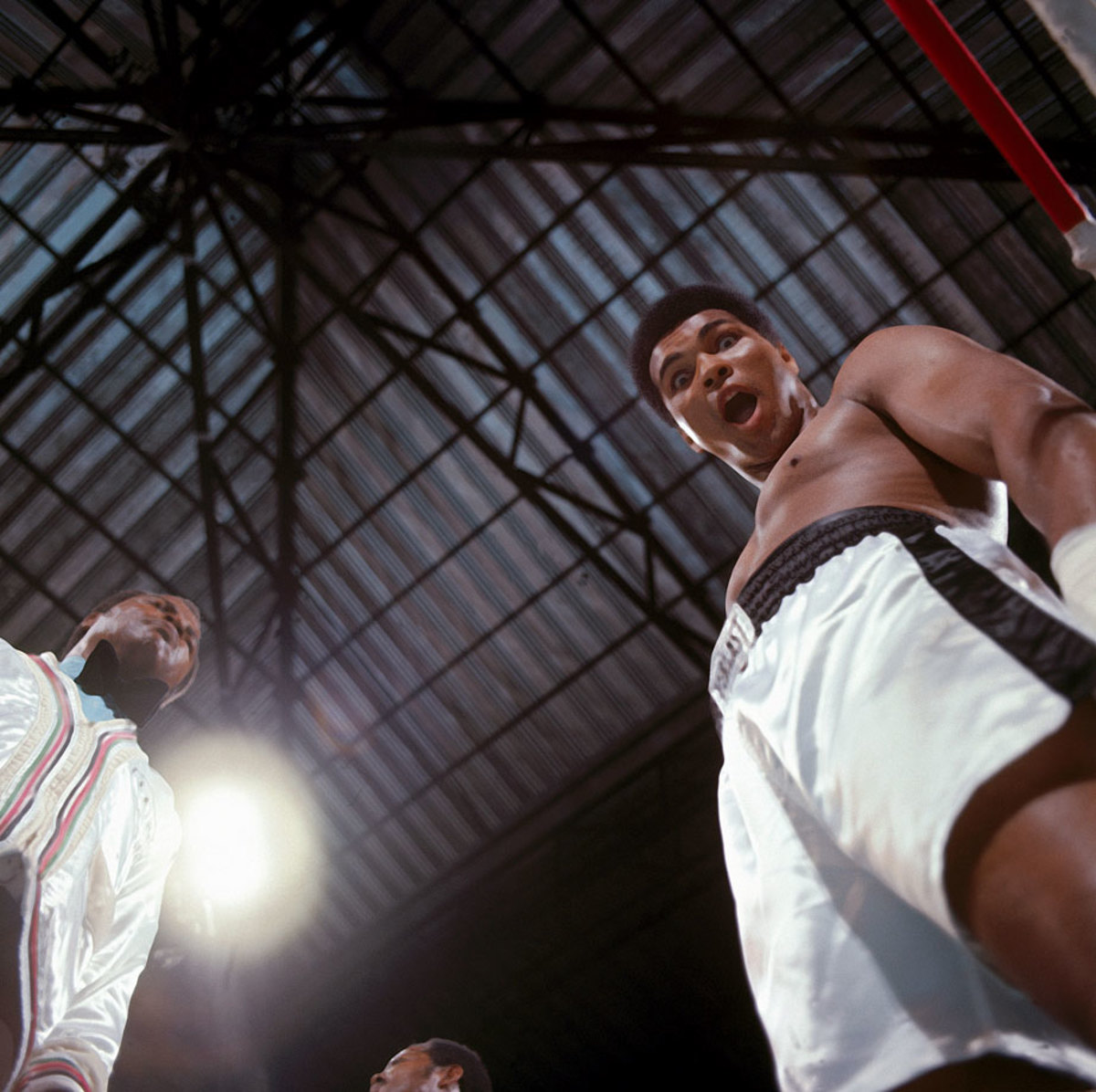
Before employing his famous rope-a-dope strategy against Foreman, Ali makes a face at the camera. Ali allowed Foreman to throw many punches but only into his arms and body, and when Foreman tired himself out from the mostly ineffective punches, Ali took control of the fight.
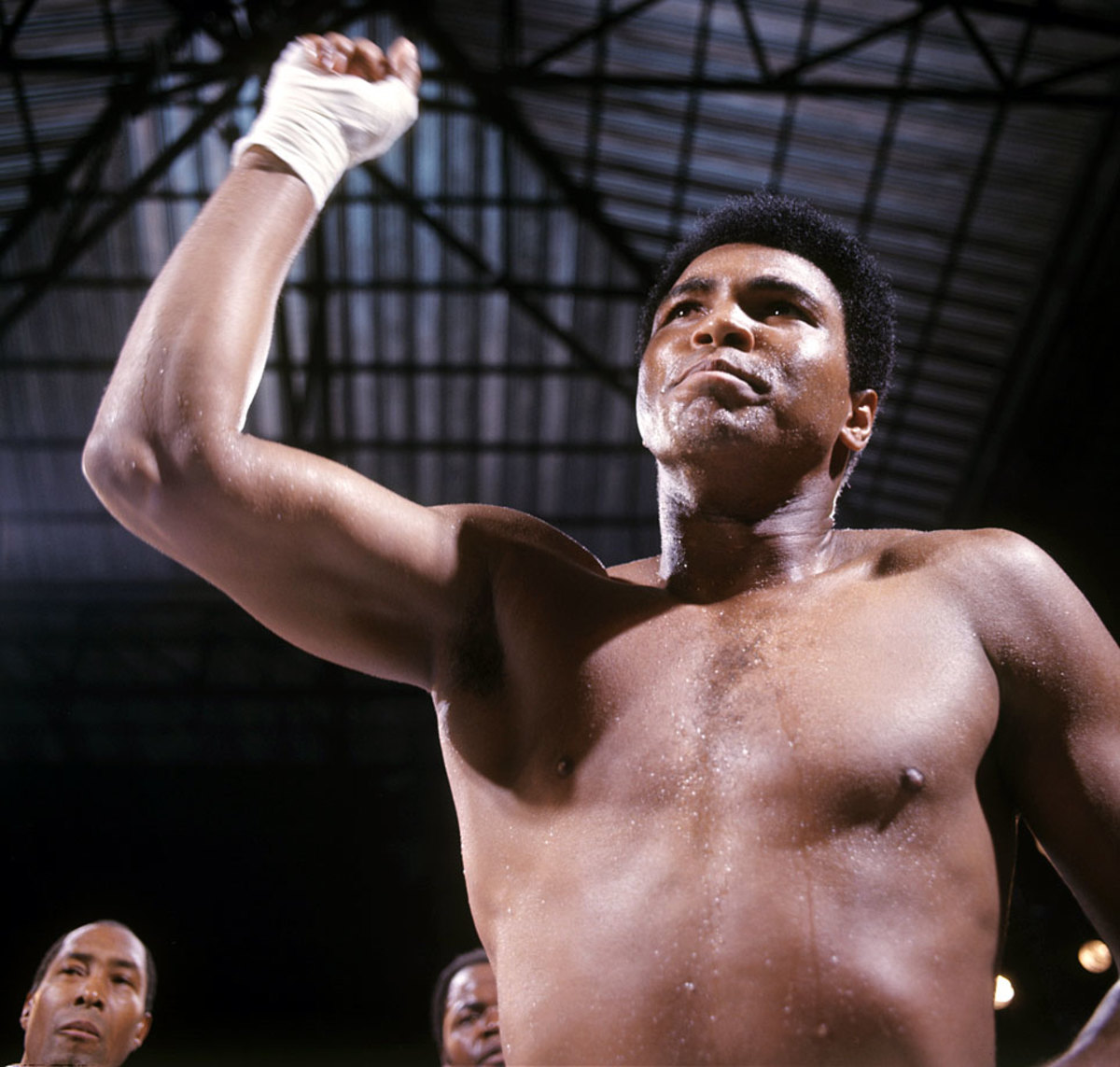
Ali points before his bout with Foreman. The victory over his favored opponent made him the heavyweight champion of the world for the first time since he was stripped of his titles in 1967.
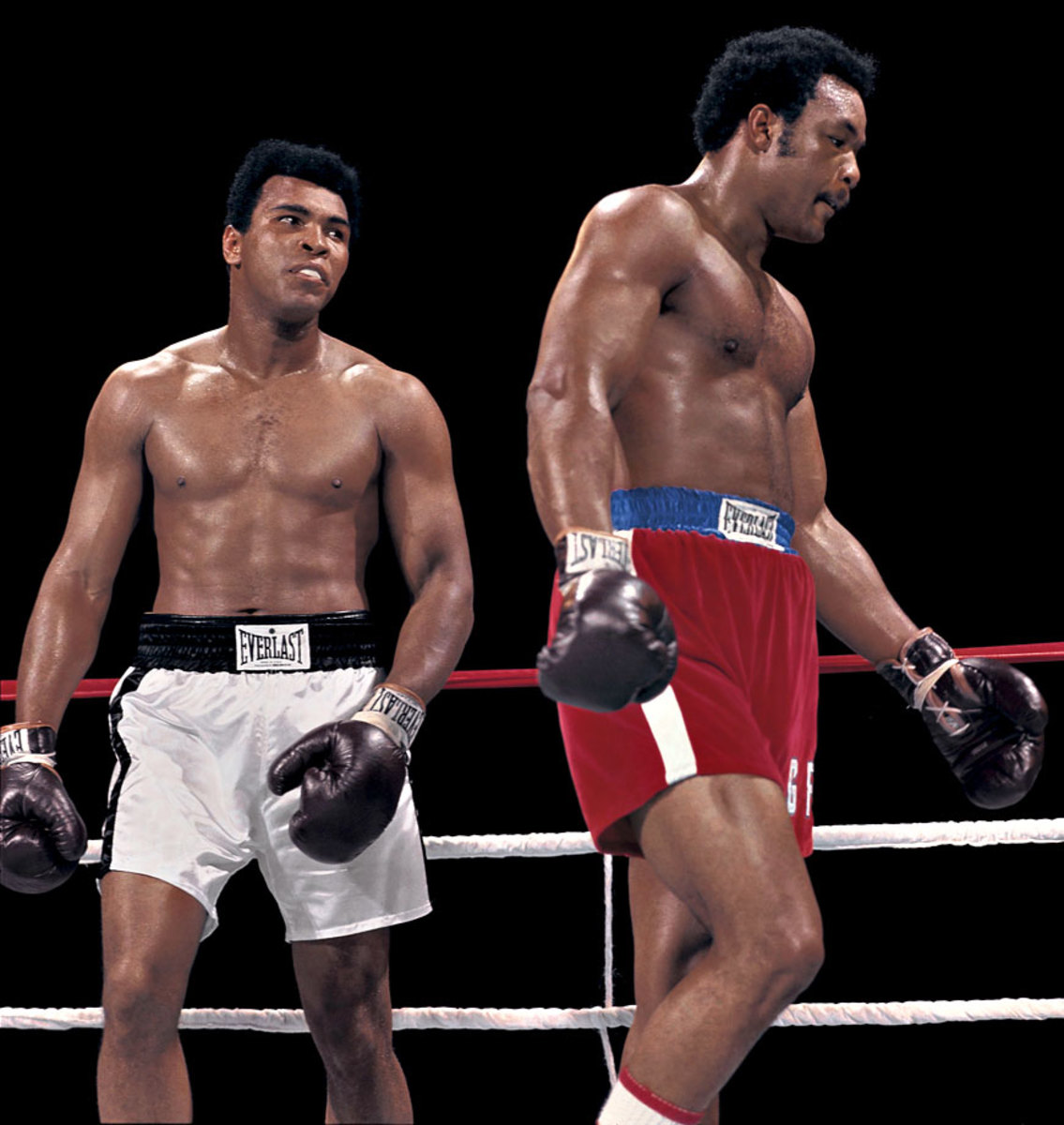
Ali stares at George Foreman during the Rumble in the Jungle. Ali earned his shot at the heavyweight title by defeating Joe Frazier in January 1974, avenging a loss three years earlier.
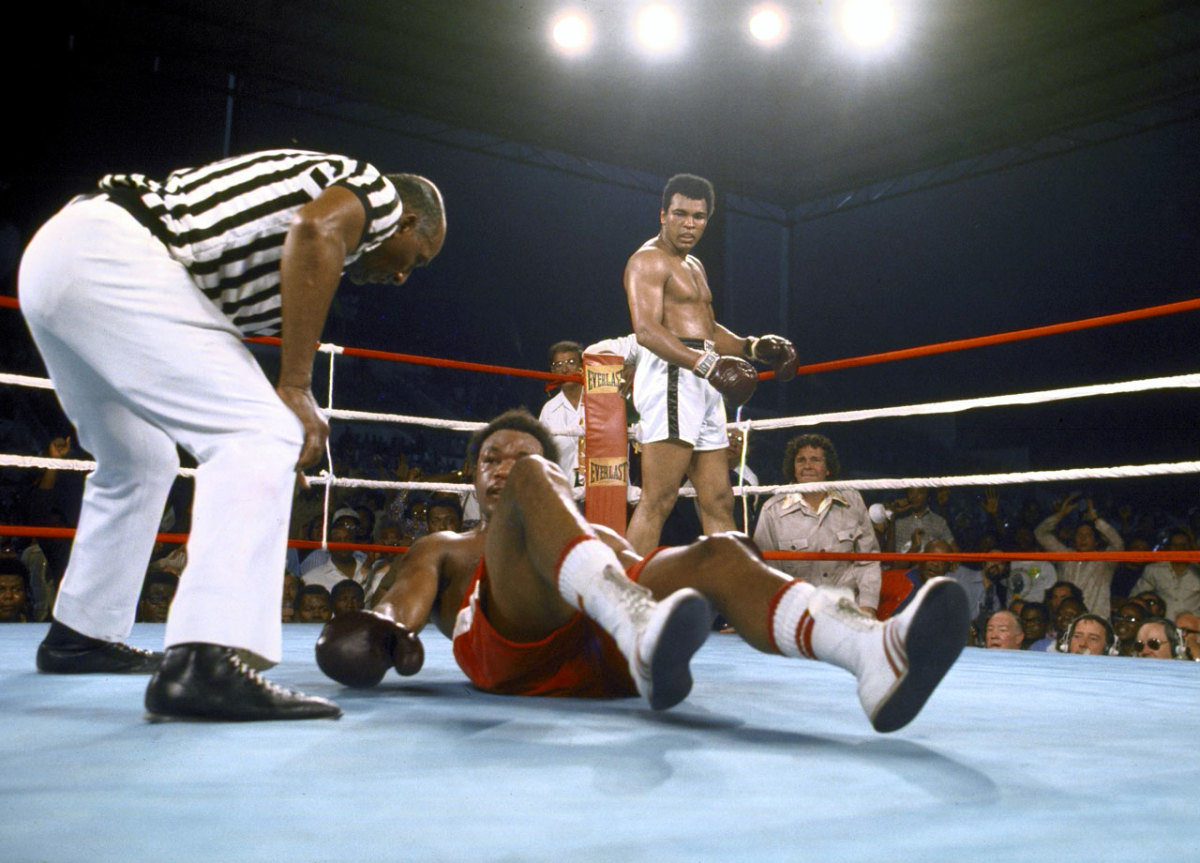
Foreman lies down on the canvas as Ali stands in the background during the Rumble in the Jungle. Ali knocked Foreman down with a five-punch combination in the eighth round, and referee Zack Clayton counted him out.
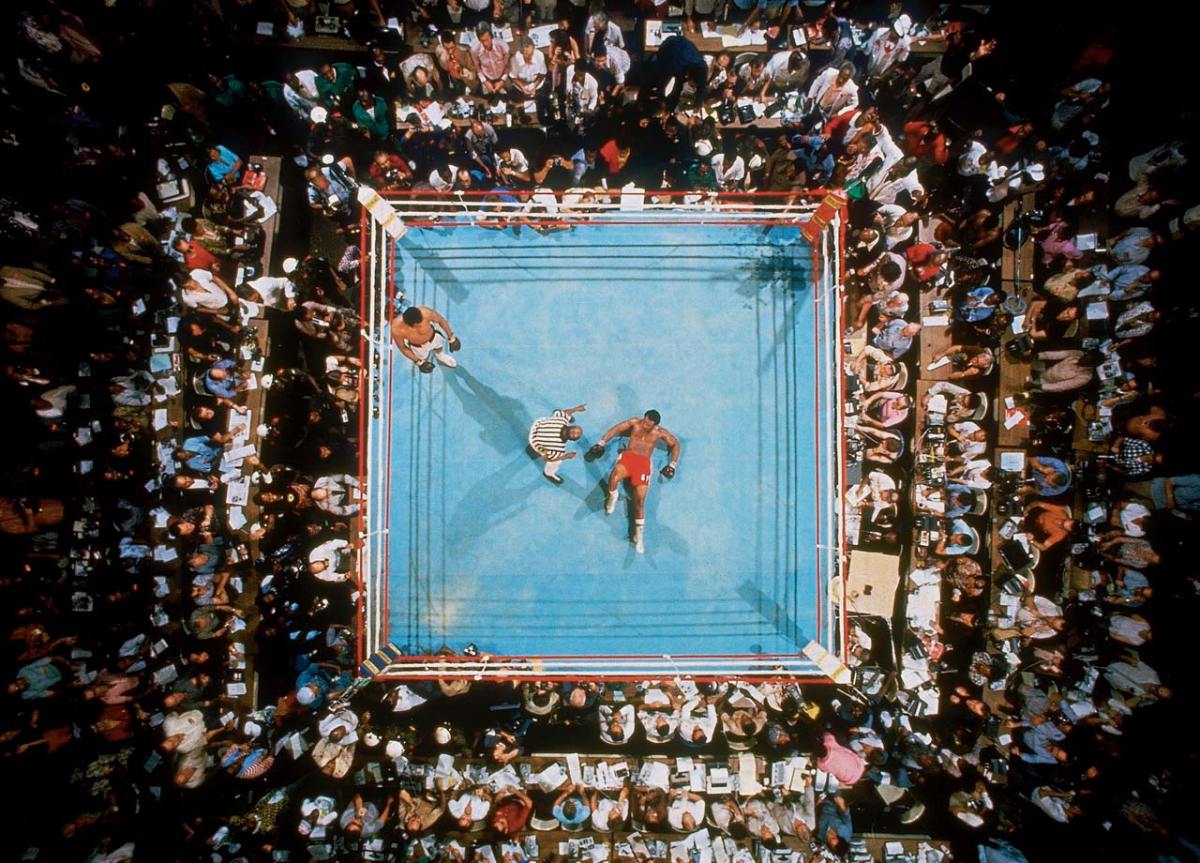
Big George stares at the ceiling as referee Zack Clayton counts him out in the eighth round. The victory made Ali, once again, the heavyweight champion of the world.
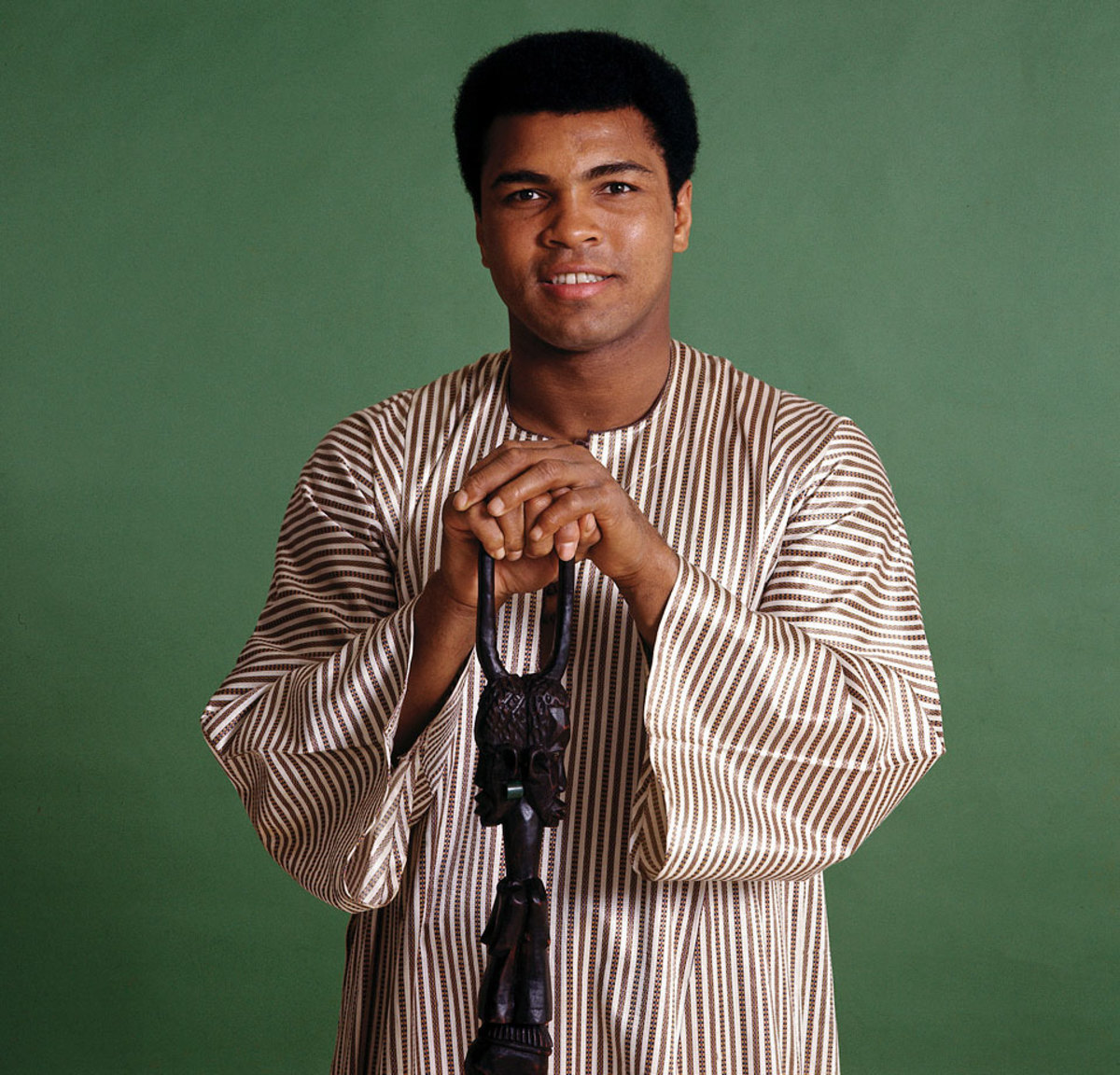
Ali poses for a portrait after being selected as the Sports Illustrated Sportsman of the Year in 1974. Ali wore a dashiki, a men's garment widely worn in West Africa. He also brought the walking stick given to him by Zaire's president.
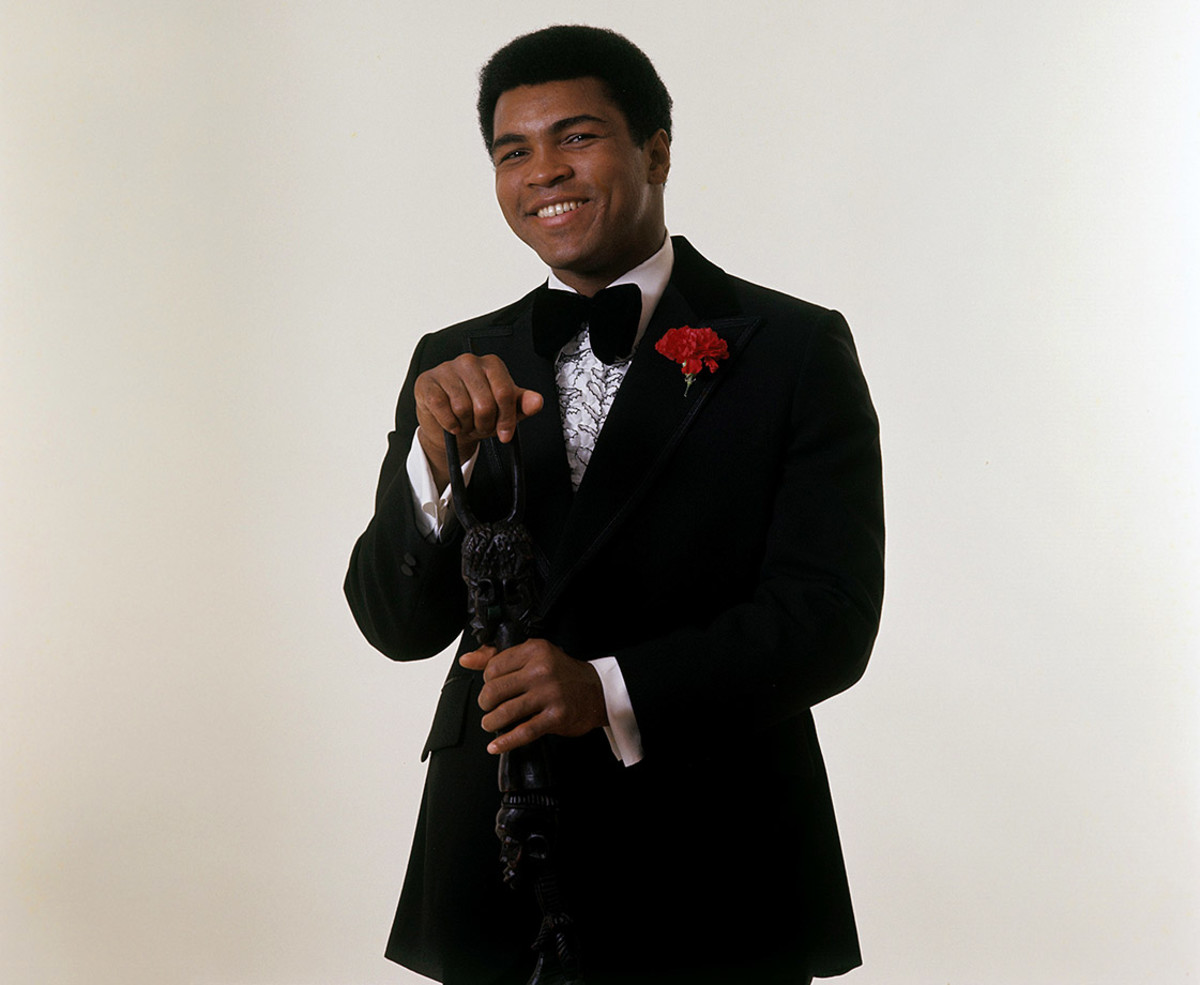
This time Ali wears a tuxedo, but keeps the walking stick, during the November photo shoot for Sports Illustrated's Sportsman of the Year.
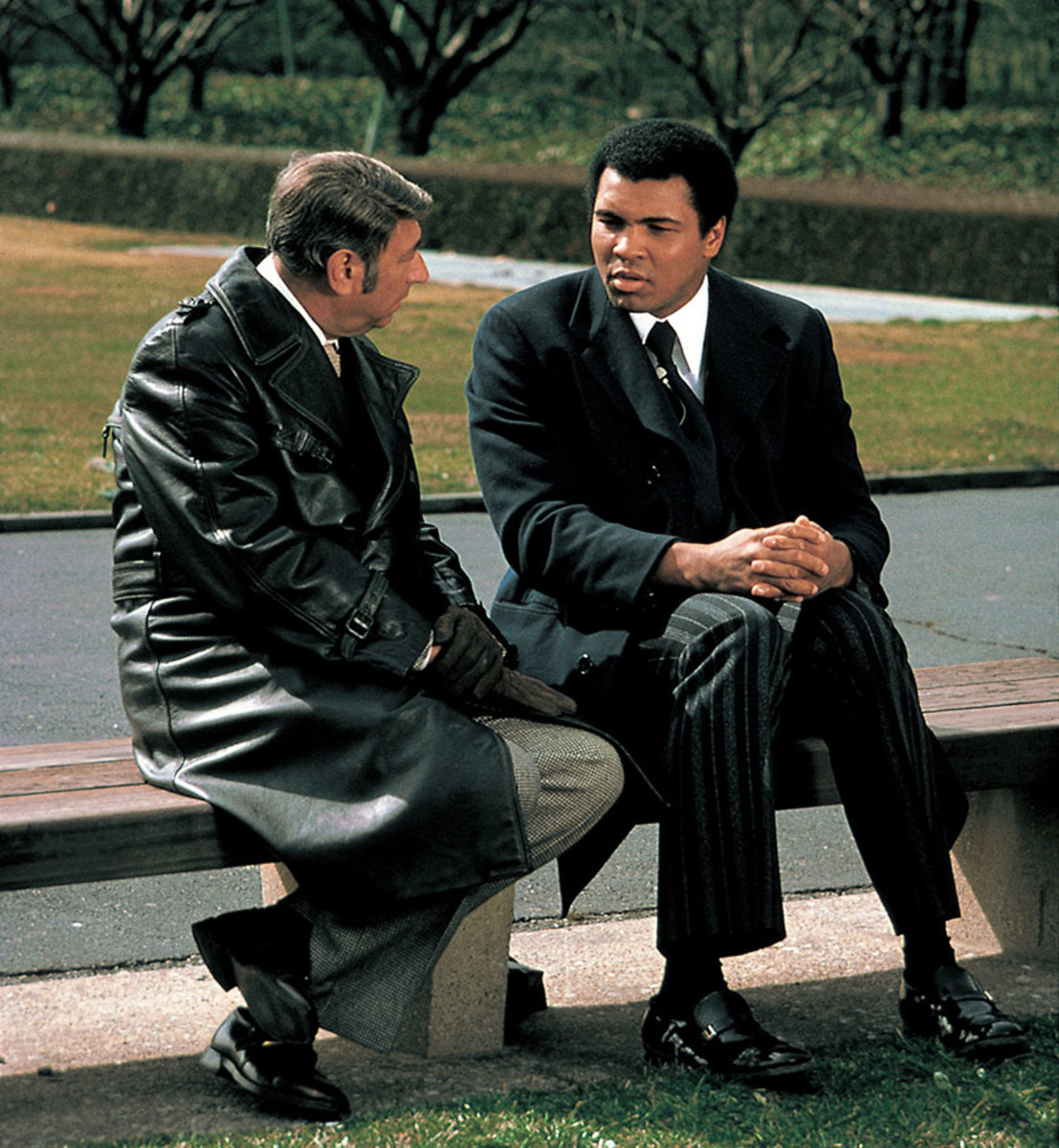
Ali talks with Howard Cosell outside of the United Nations Headquarters for a segment on the Wide World of Sports. Later that day, Ali held a press conference to announce that he would donate part of the proceeds from his fight against Chuck Wepner to help Africans in the Sahel drought.
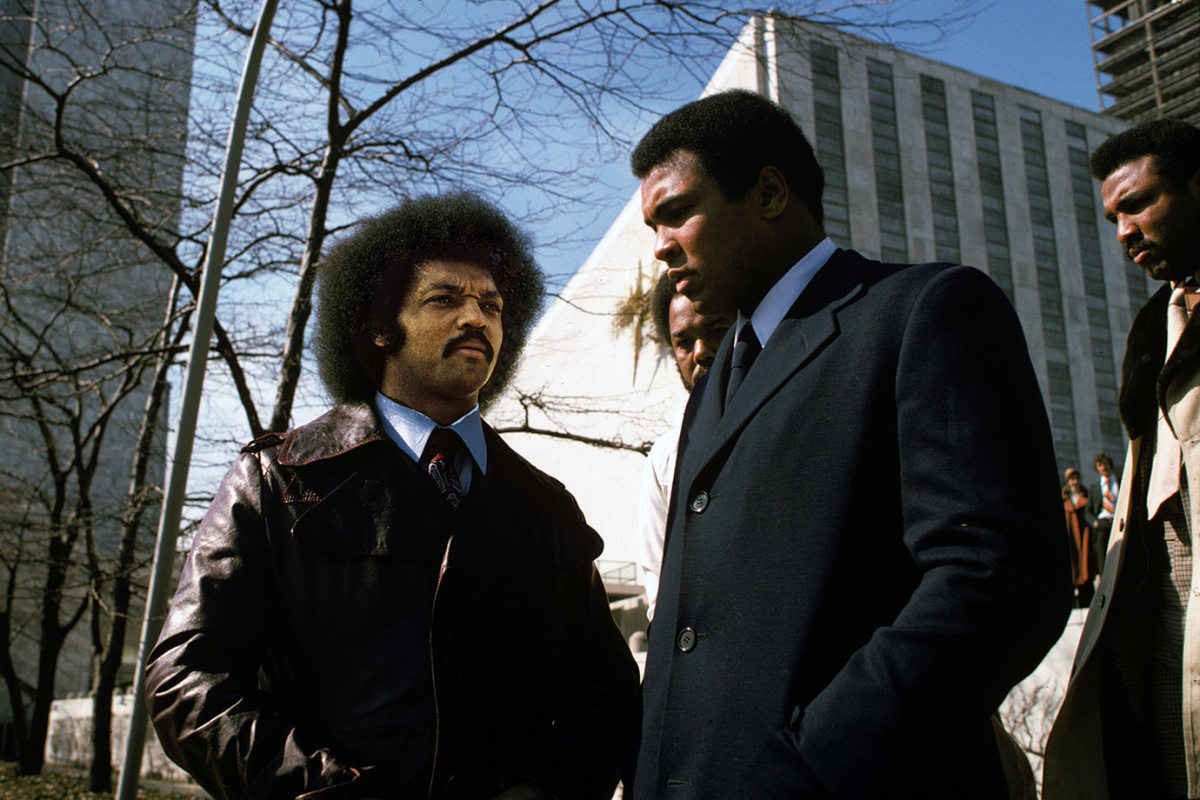
Ali talks with Reverend Jesse Jackson outside of the United Nations Headquarters before a press conference to announce that he would donate part of the proceeds from his fight against Chuck Wepner to help Africans in the Sahel drought.
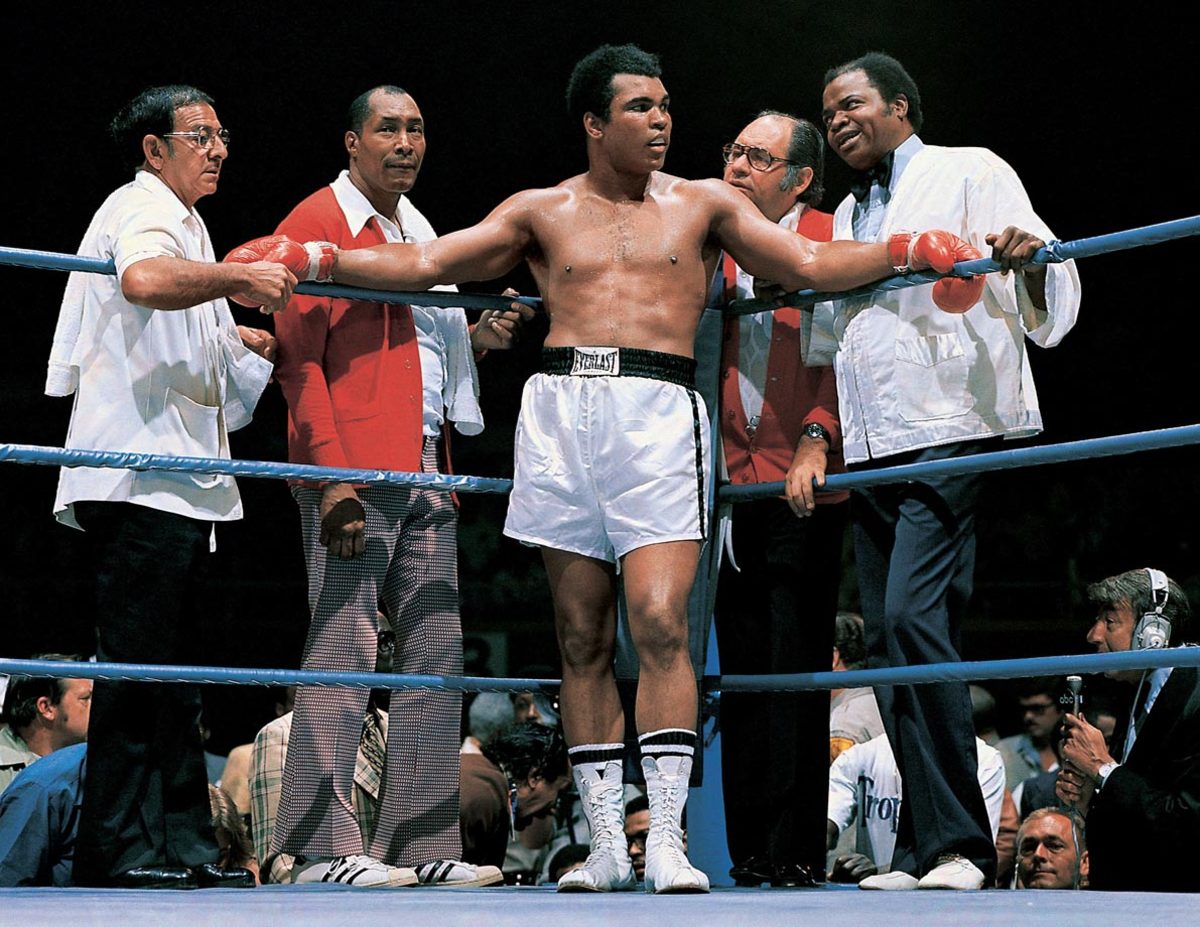
Ali stands with trainer Angelo Dundee, assistant trainer Wali Muhammad, physician Dr. Ferdie Pacheco and assistant trainer Drew Bundini Brown before his bout with Ron Lyle in May 1975. Ali won the fight by technical knockout in the 11th round.
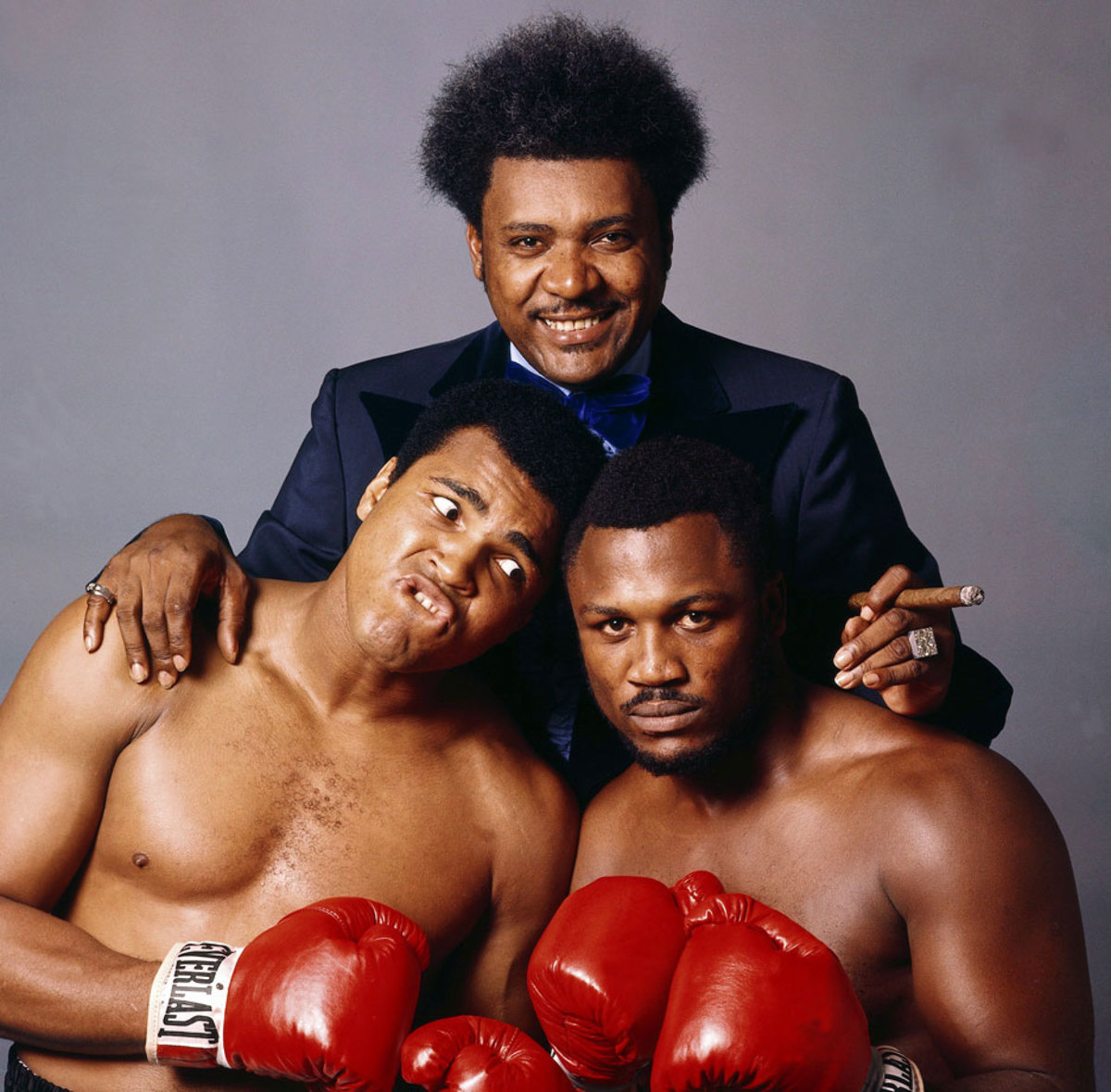
Along with Don King and Joe Frazier, Ali sat for a portrait leading up to the Thrilla in Manila. Ali verbally abused Frazier during the buildup to the fight, telling the media that "it will be a killa and a thrilla and a chilla when I get the gorilla in Manila."
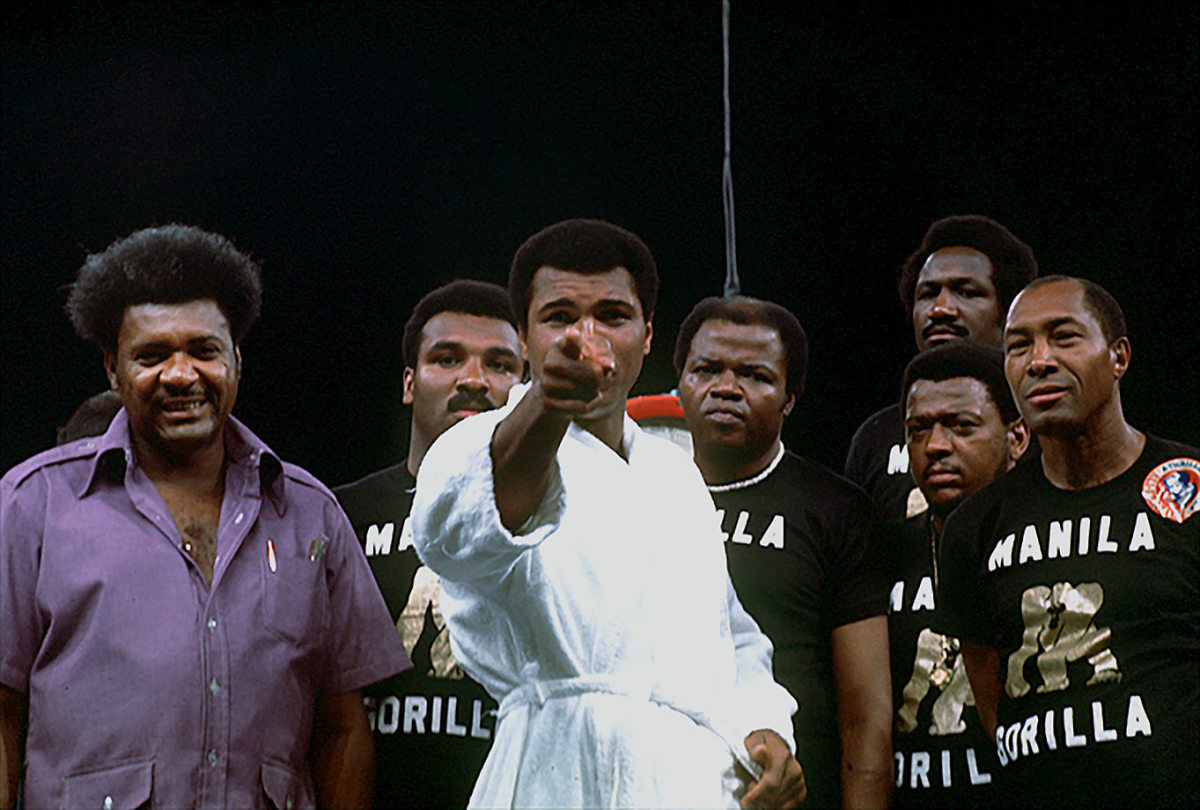
Ali points at the camera with Don King and his training staff behind him before the weigh-in for the Thrilla in Manila in October 1975. Philippine president Ferdinand Marcos offered to sponsor the bout and hold it in Metro Manila to divert attention from the turmoil in the country that had forced the imposition of martial law in 1972.
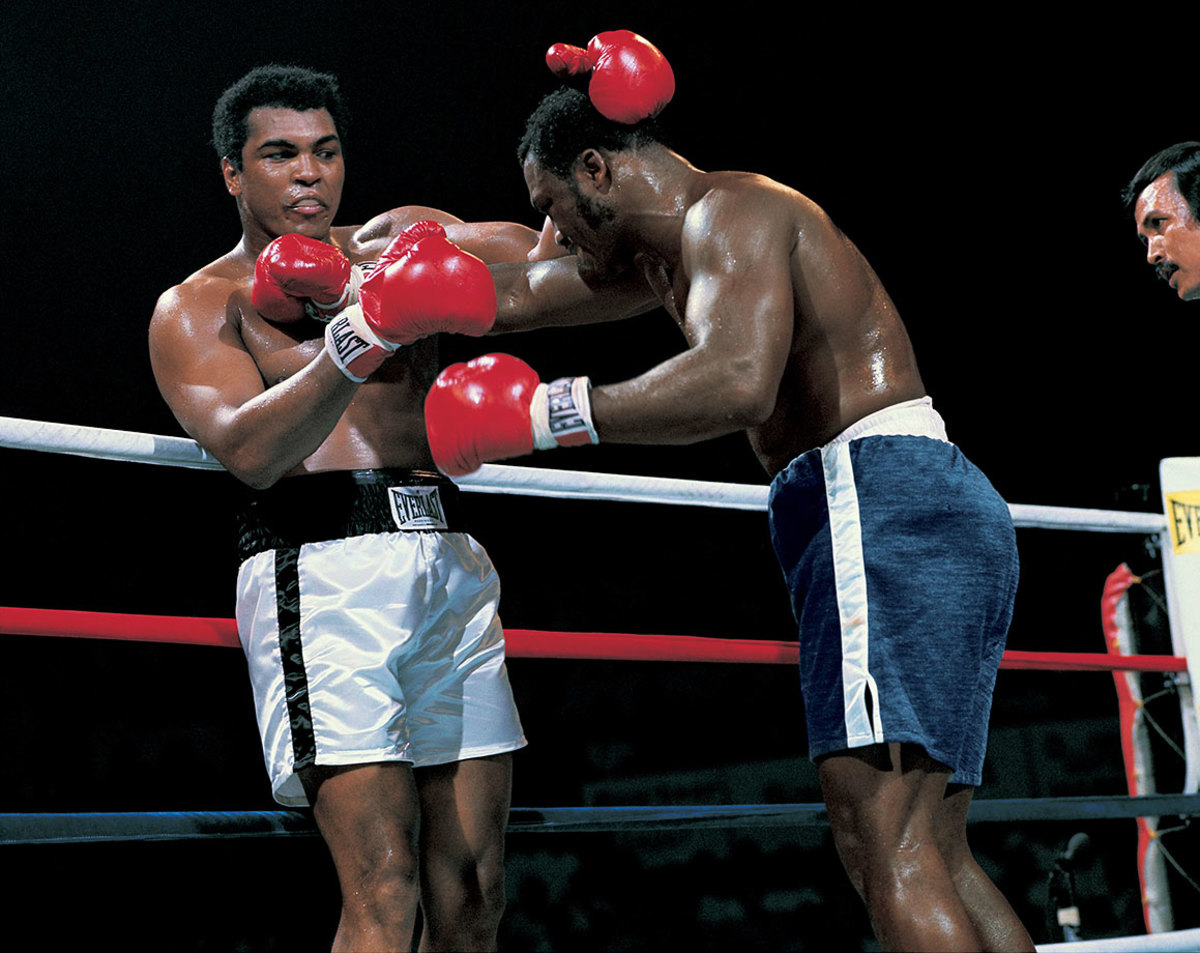
Wrapping up Joe Frazier proved more difficult than Ali expected, having thought Frazier would represent an easy payday and be unable to live up to his billing. The fight turned out to be a brutal affair.
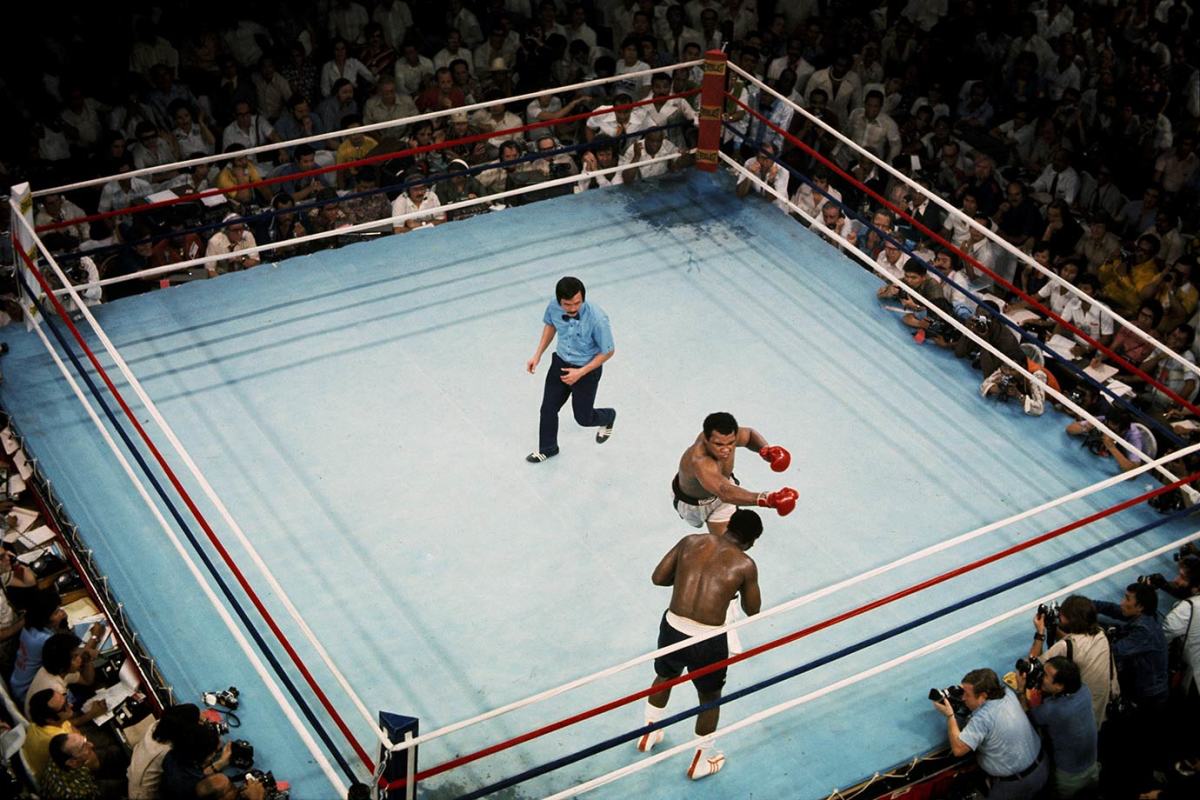
Frazier faces an Ali right hook in their fight in Quezon City, Philippines. The two fighters traded vicious blows during their 14 rounds. "Man, I hit him with punches that'd bring down the walls of a city," Frazier said. Ali withstood the blows to win by TKO in the 15th round.
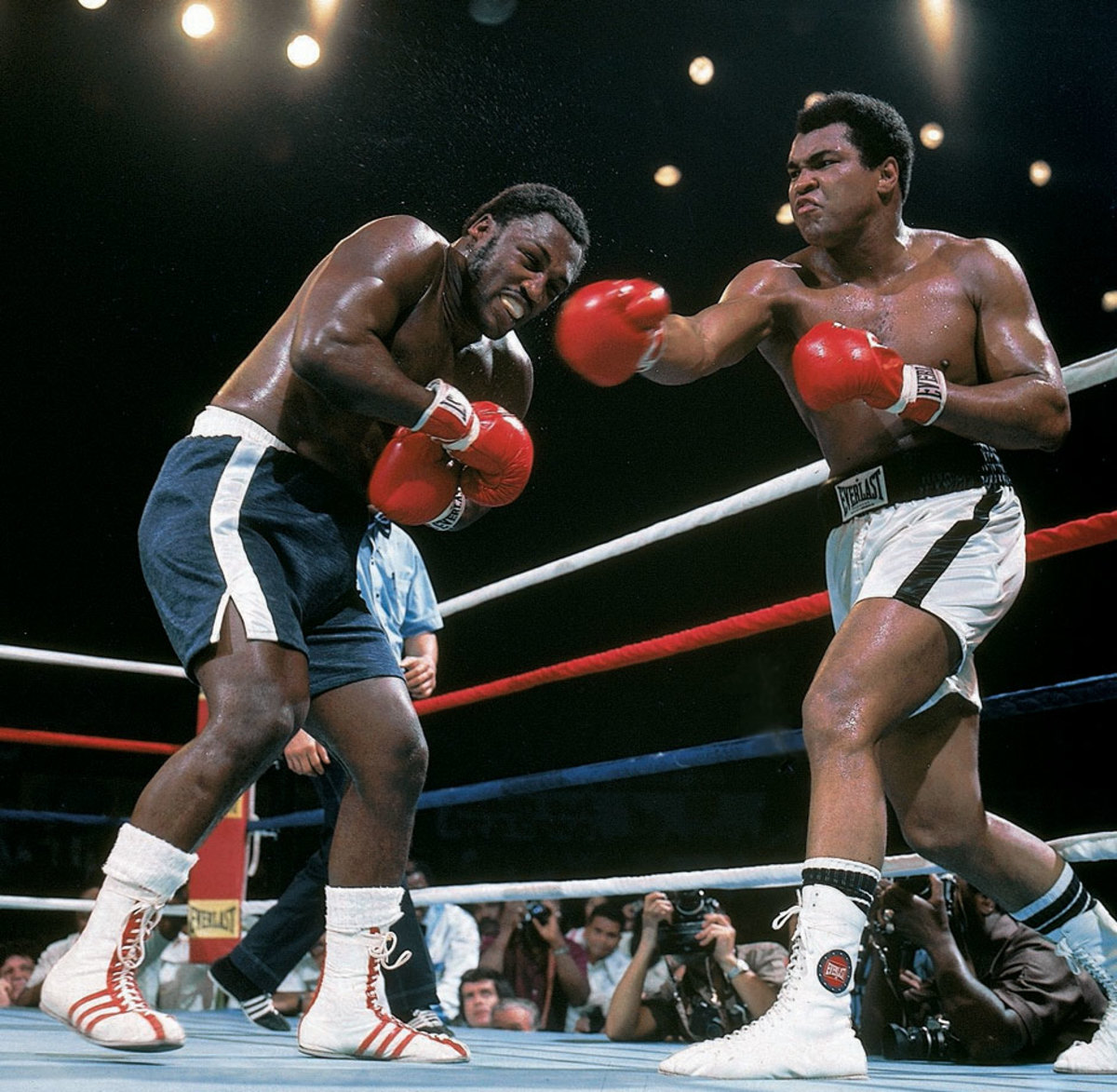
The third fight between Ali and Frazier, Ali won the bruising battle between the two powerful punching heavyweights when Frazier's trainer, Eddie Futch, stopped the fight before the 15th round.
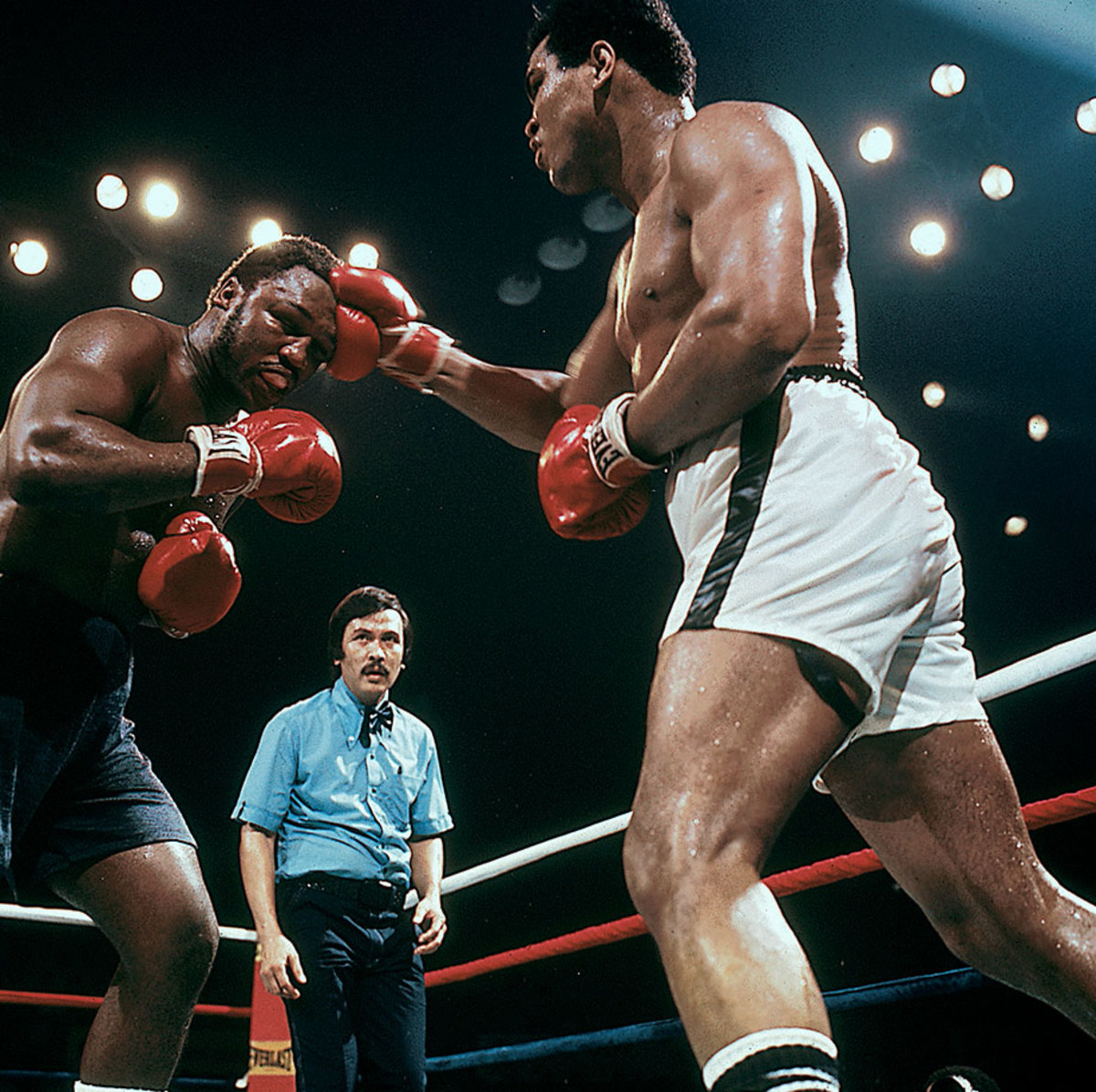
A back and forth exchange, Ali controlled the early rounds of the Thrilla in Manila before Frazier fought back with powerful hooks. Ali finished strong, regaining momentum in the later rounds.
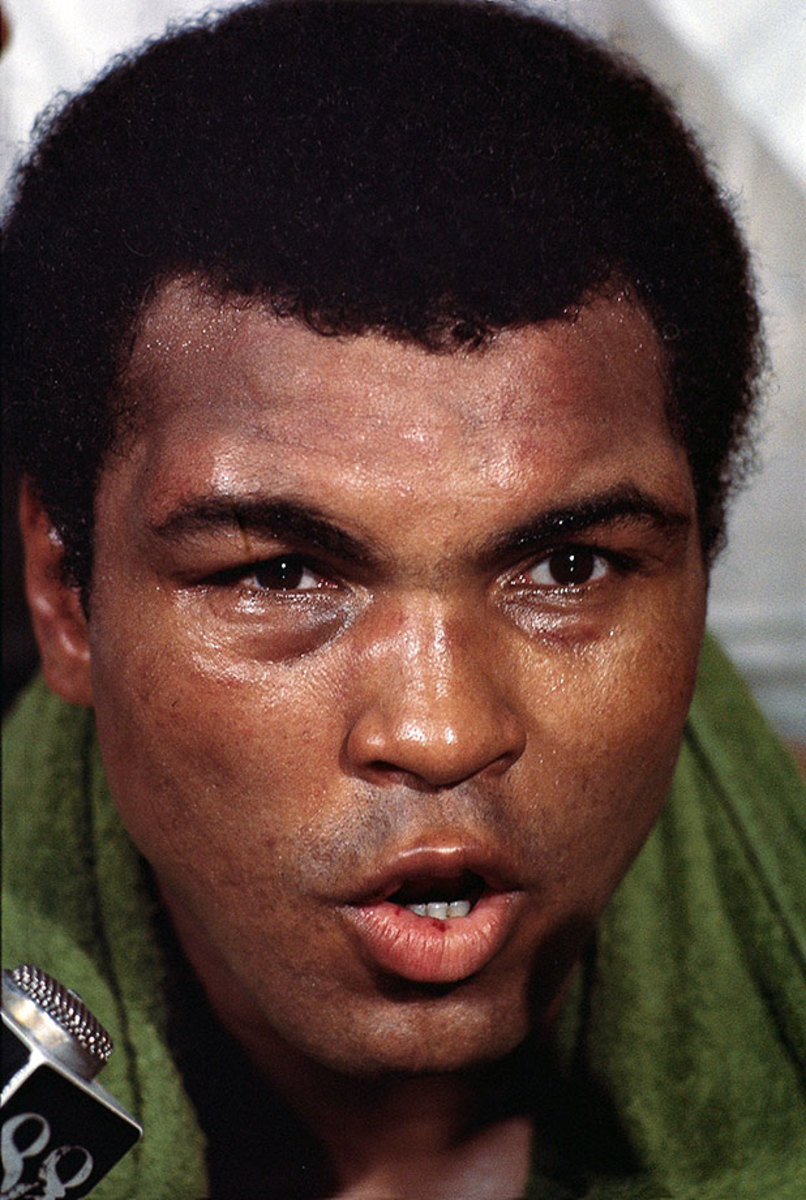
Ali speaks to the press after winning the Thrilla in Manila bout with Frazier.
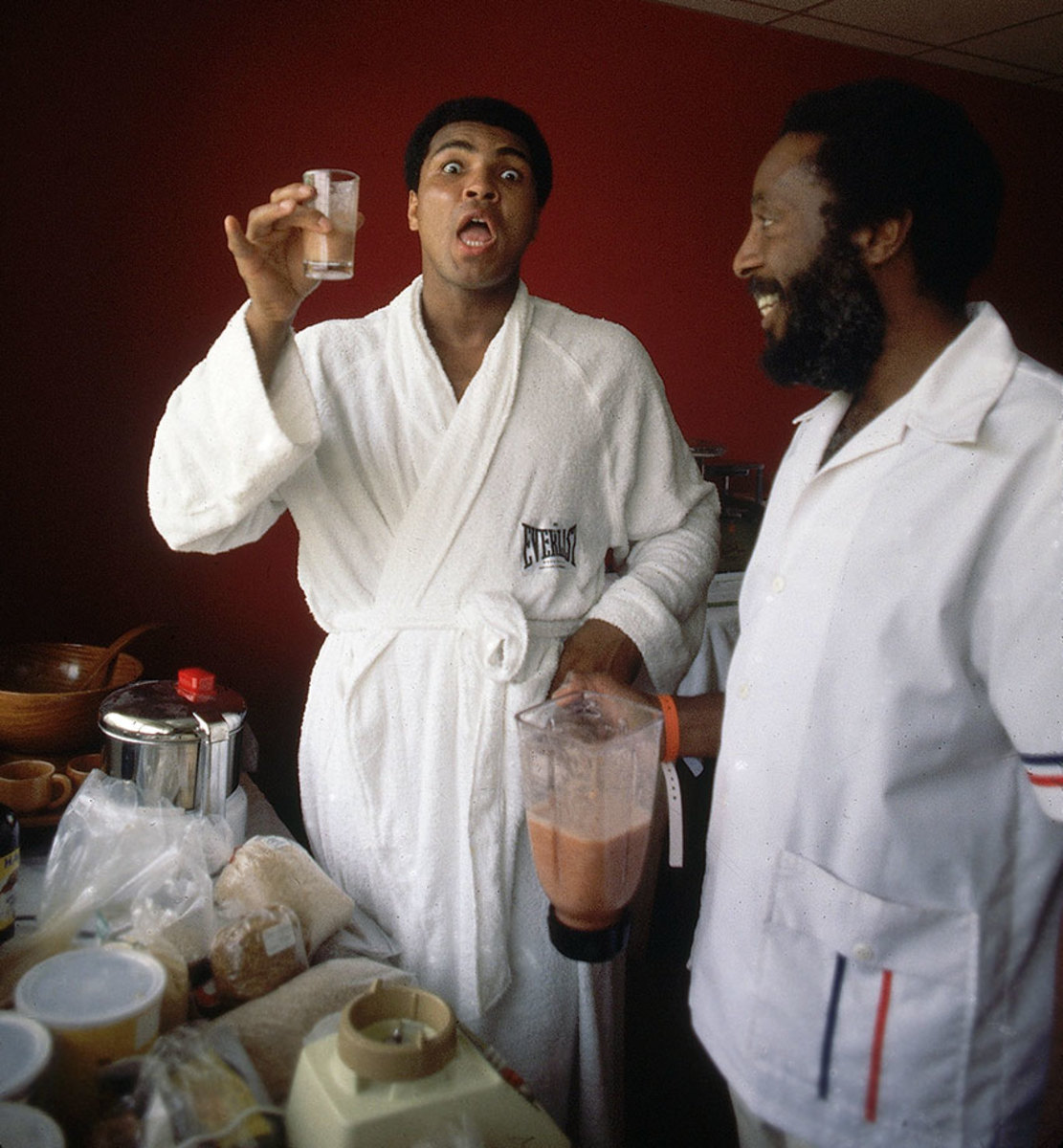
Ali holds a drinking concoction given to him by Dick Gregory, an advocate of a raw fruit and vegetable diet, in 1976.
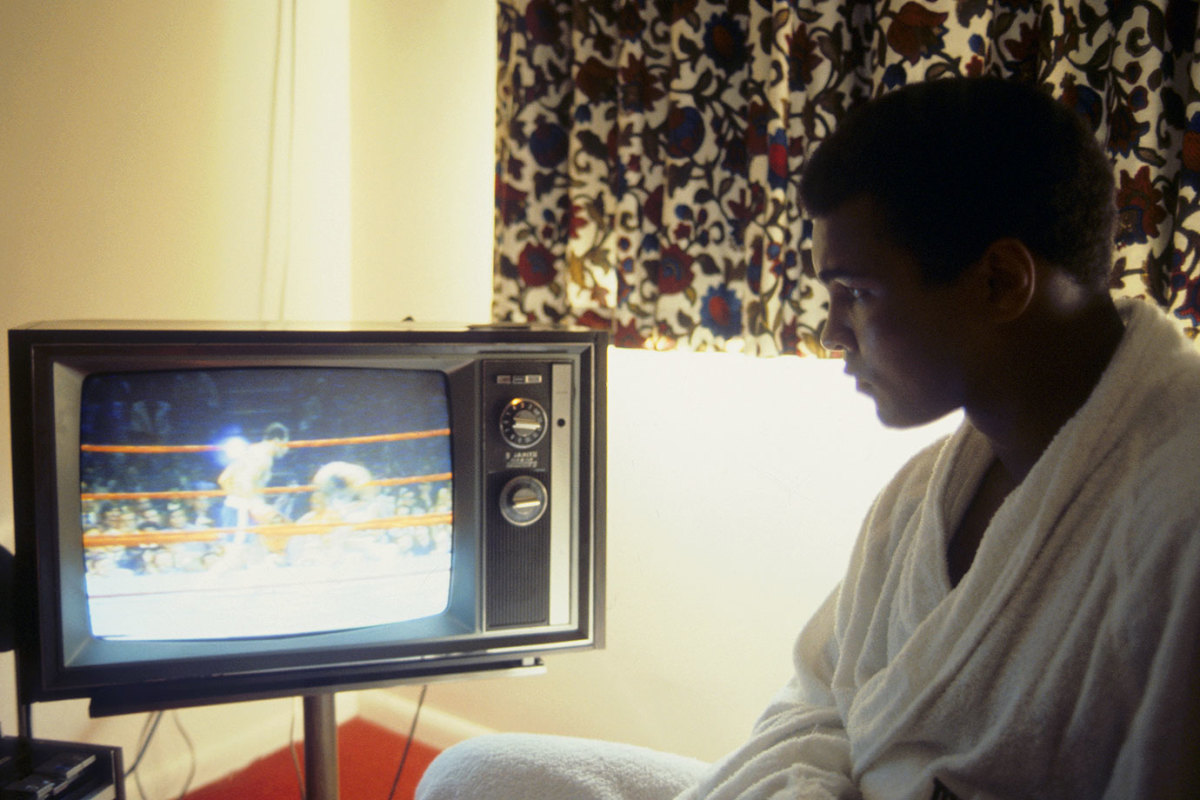
Before his 1976 fight against Ken Norton at Yankee Stadium, Ali watches a fight on television from his hotel room. A police strike at the time of the fight created a dangerous environment outside the stadium that all but eliminated walk-up sales.
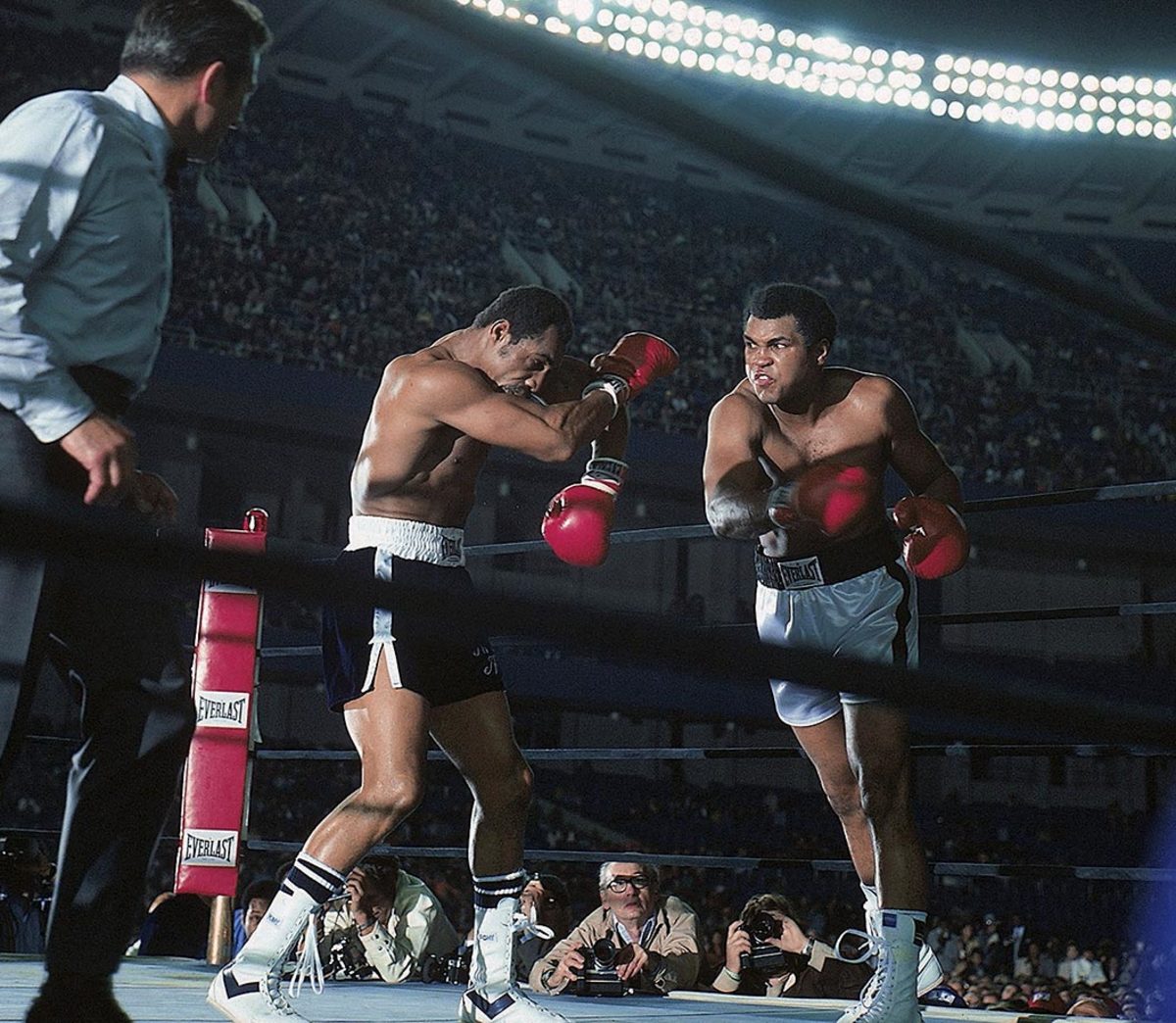
Norton takes a right hook during the heavyweight title fight against Ali. The bout, which Ali won by a unanimous, but controversial, decision, was the last boxing match at Yankee Stadium until 2010.
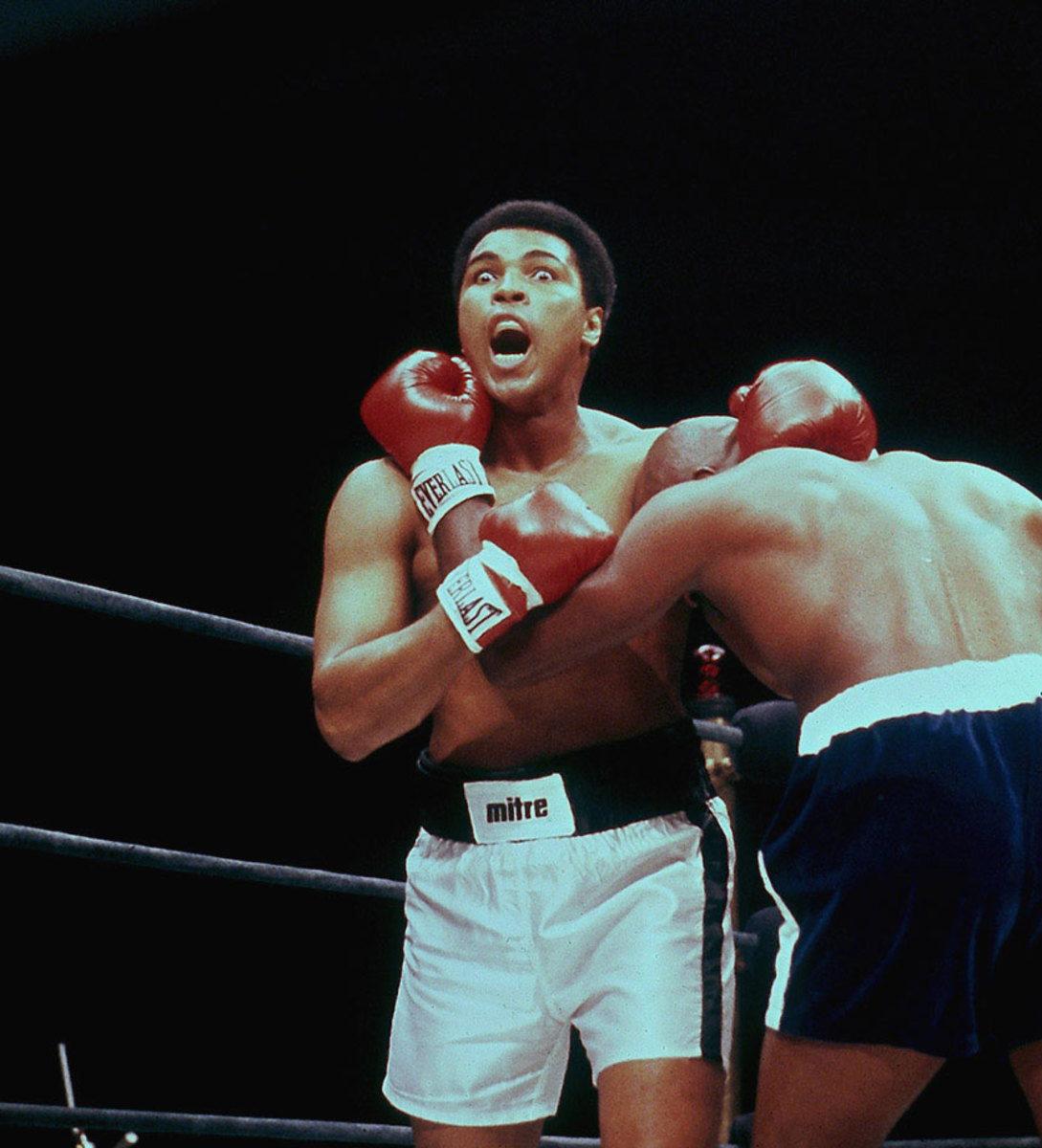
Ali makes a face during his fight with Earnie Shavers in 1977 at Madison Square Garden. Hurt badly by Shavers in the second round, Ali rebounded and outboxed Shavers throughout to build a lead on points before Shavers came on again in the later rounds. Seemingly exhausted going into the 15th and final round, Ali remained victorious by producing a closing flurry that left Shavers wobbling at the bell and the Garden crowd once again in delirium over his Ali magic.
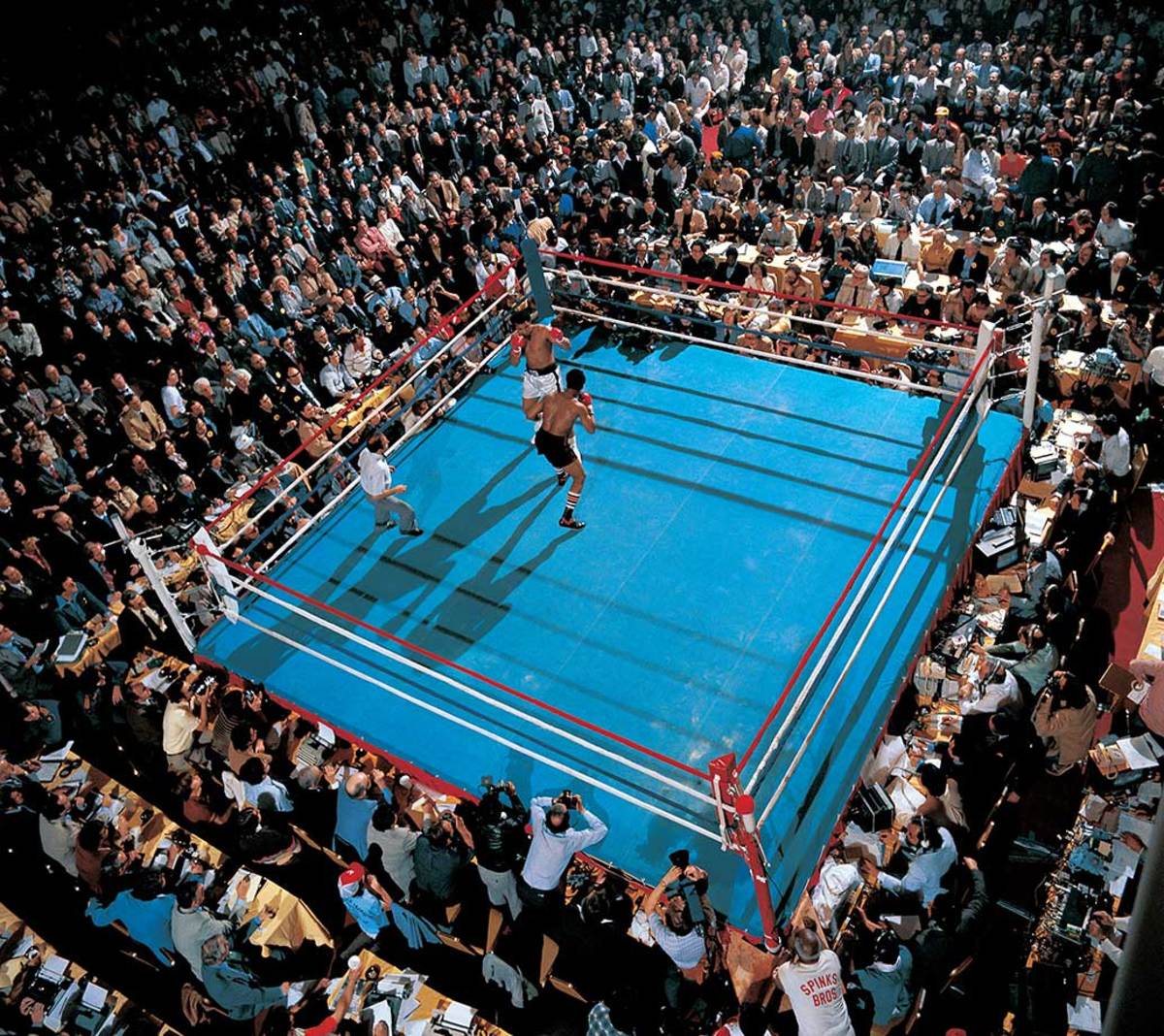
Ali squares off with Leon Spinks at the Las Vegas Hilton Hotel in February 1978. Spinks won the fight in a split decision, ending Ali's 3.5-year reign as the heavyweight champion. It was the only time in Ali's career that he lost his championship title in the ring.
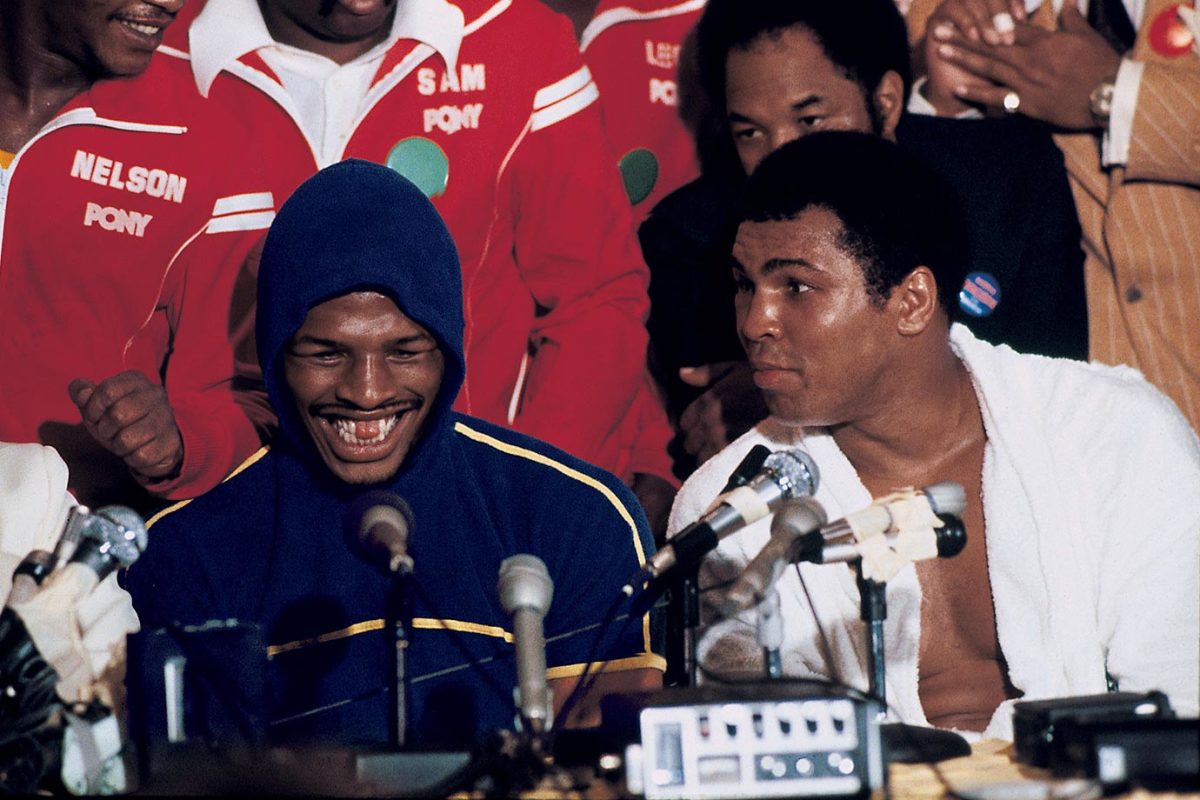
Leon Spinks took center stage over Ali at the press conference after their fight. The victorious Spinks and his gap-toothed grin were featured on the Feb. 19, 1978 cover of Sports Illustrated.
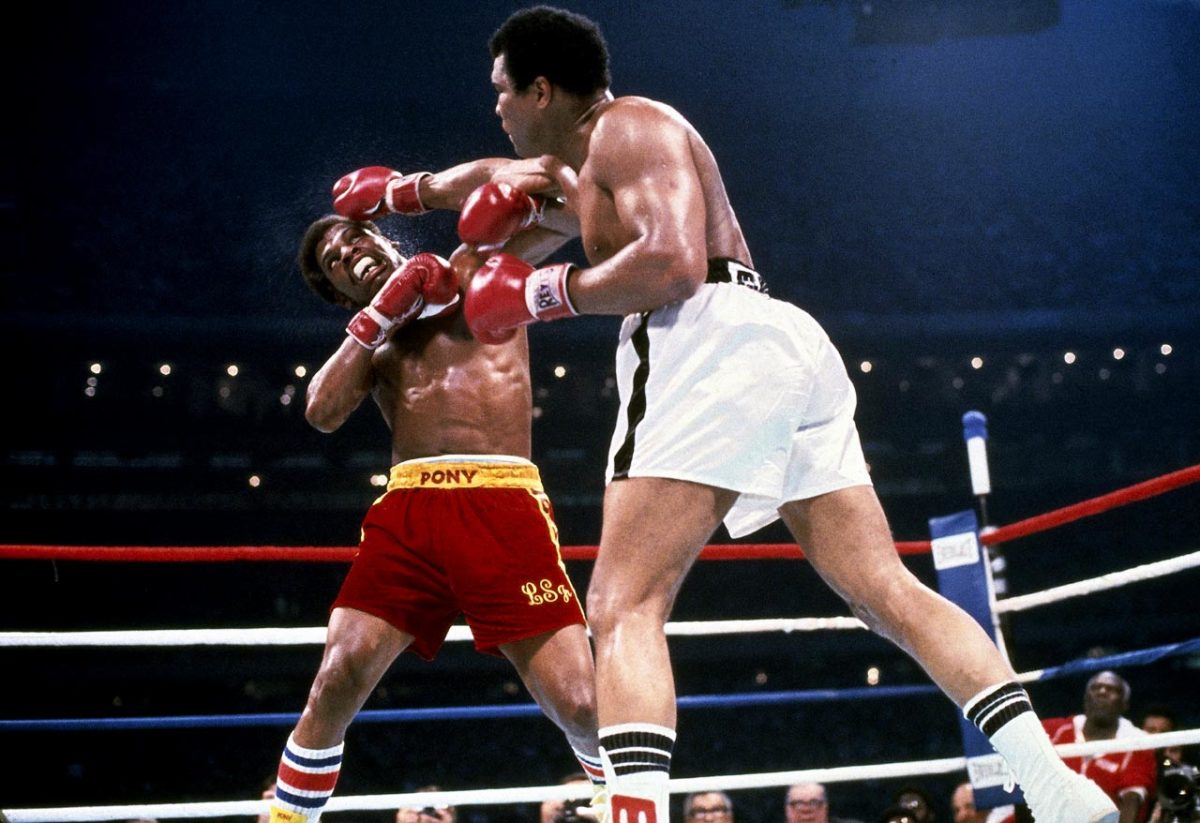
Ali lands a straight right hand to the head of Spinks in the rematch of their title bout in 1978. Ali won on a 15 round decision.
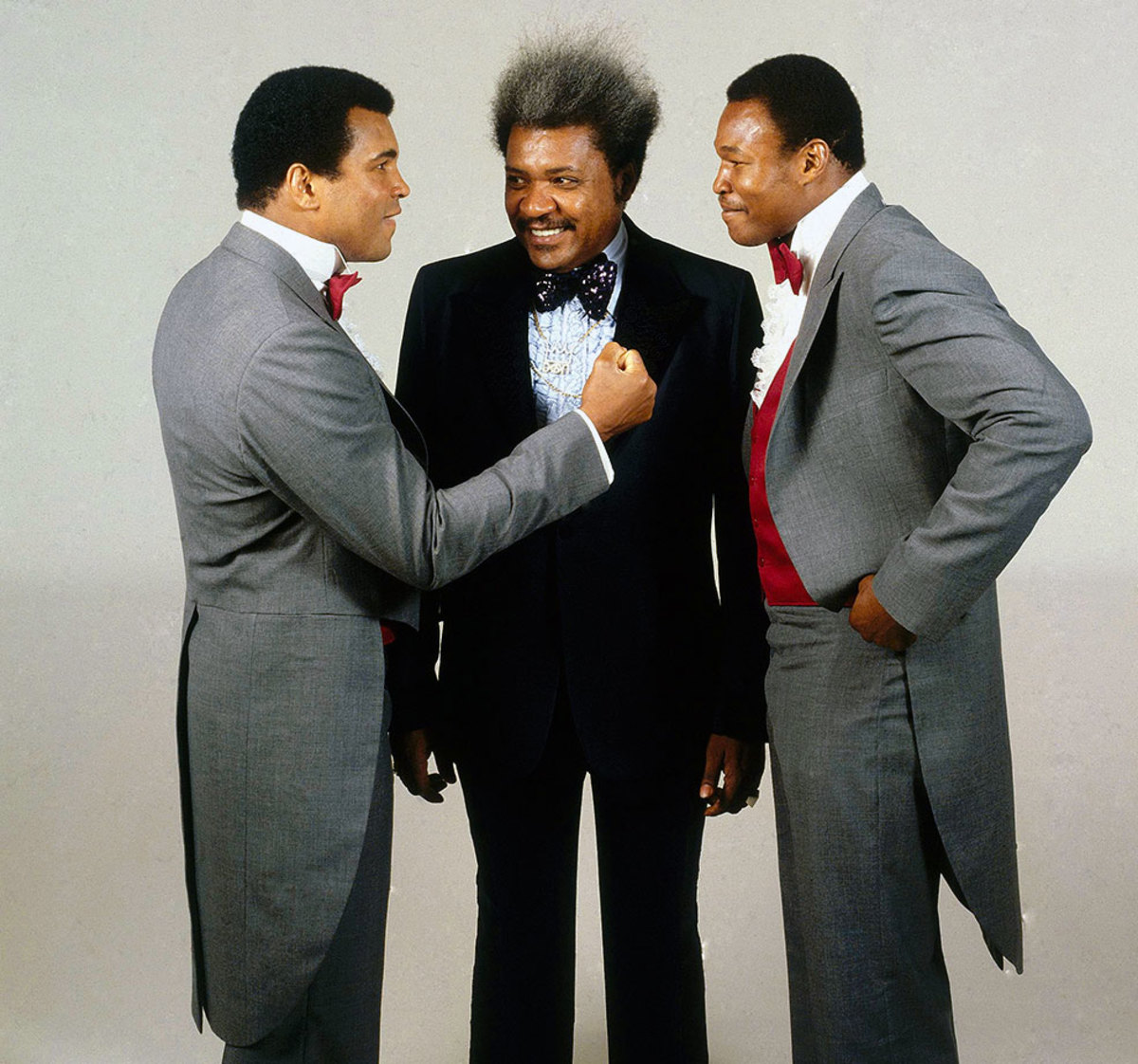
Don King pulled the strings again when Ali faced Larry Holmes before their November 1980 fight. King became a key figure in Ali's career, promoting his biggest fights, the Thrilla in Manila and the Rumble in the Jungle.
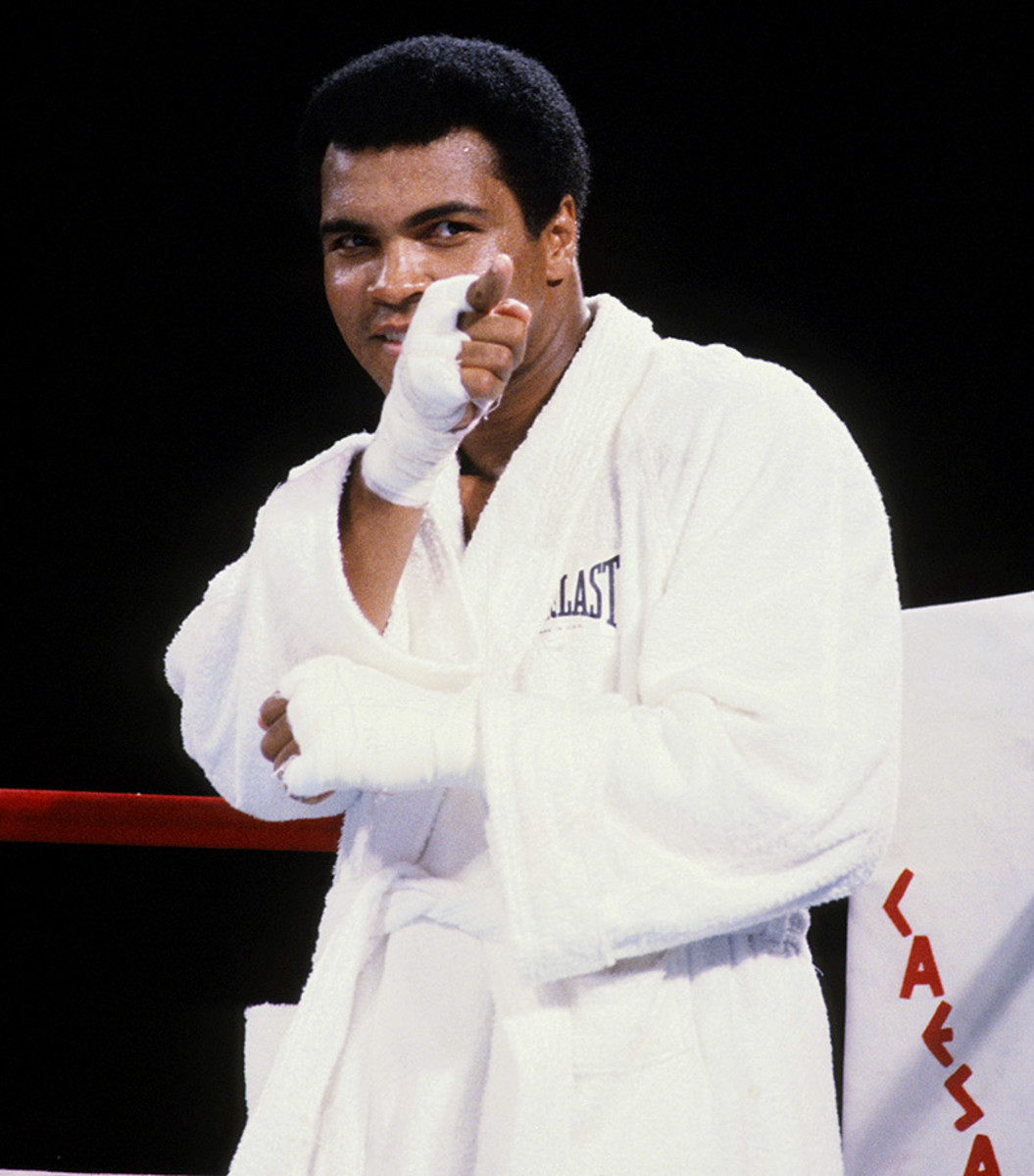
Ali points at Larry Holmes before their bout at Caesars Palace in 1980.
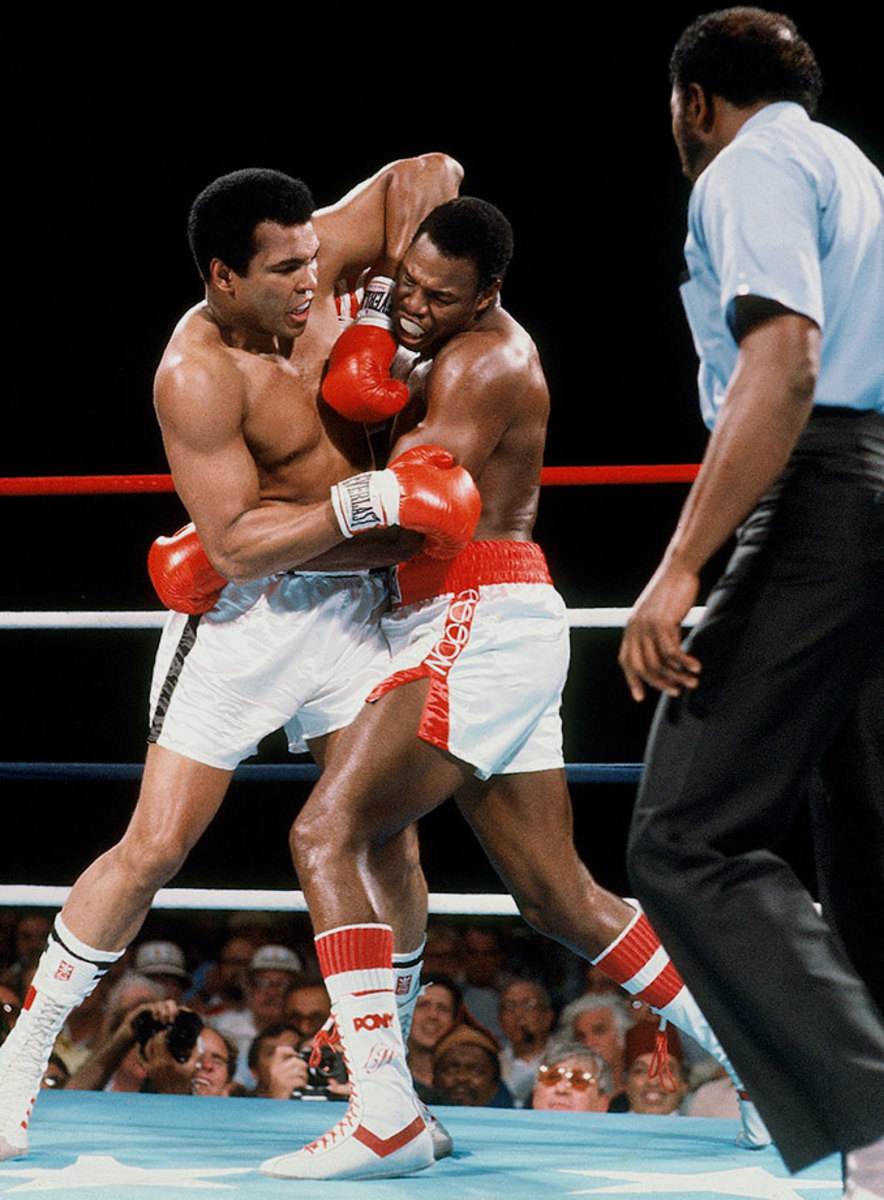
Ali grapples with Holmes during their bout in 1980. Trainer Angelo Dundee stopped the fight in the 11th round, marking the fight as Ali's only career loss by knockout.
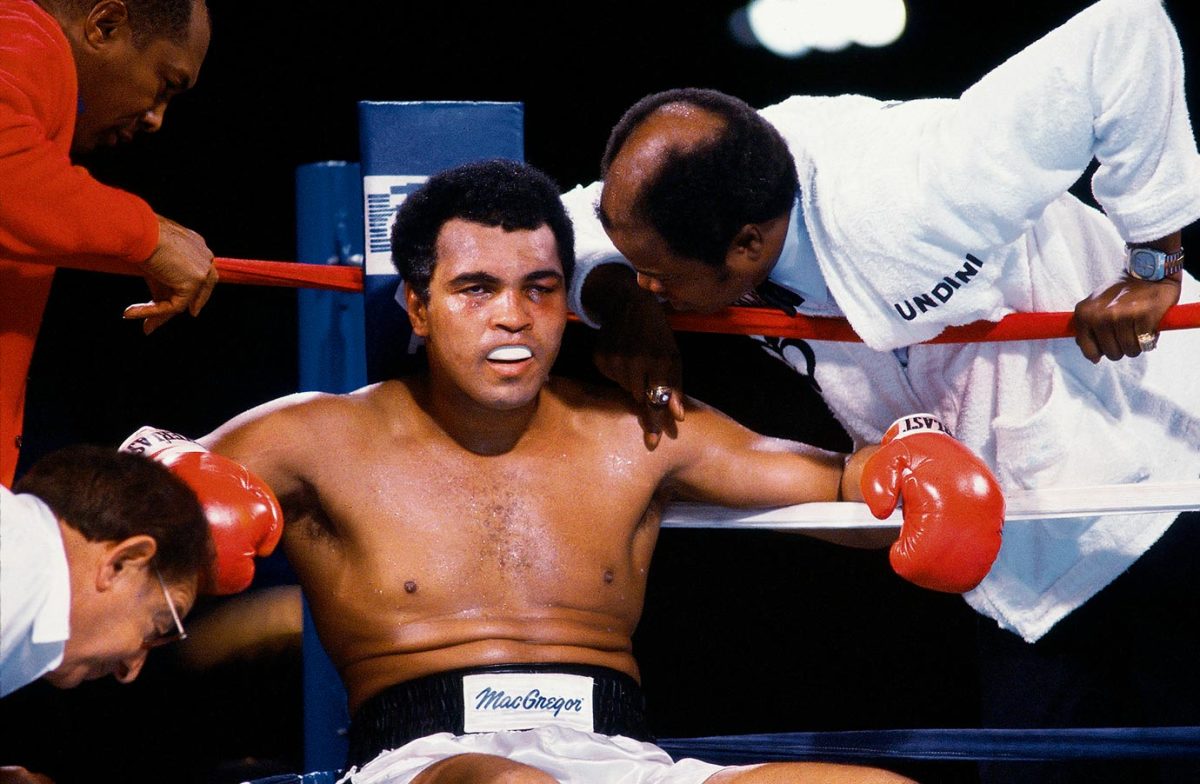
Drew Bundini Brown leans in to speak to Ali, who returned to fight Holmes after a brief retirement. By this time, Ali had already begun developing a vocal stutter and trembling hands and taken thyroid medication to lose weight that left him tired and short of breath.
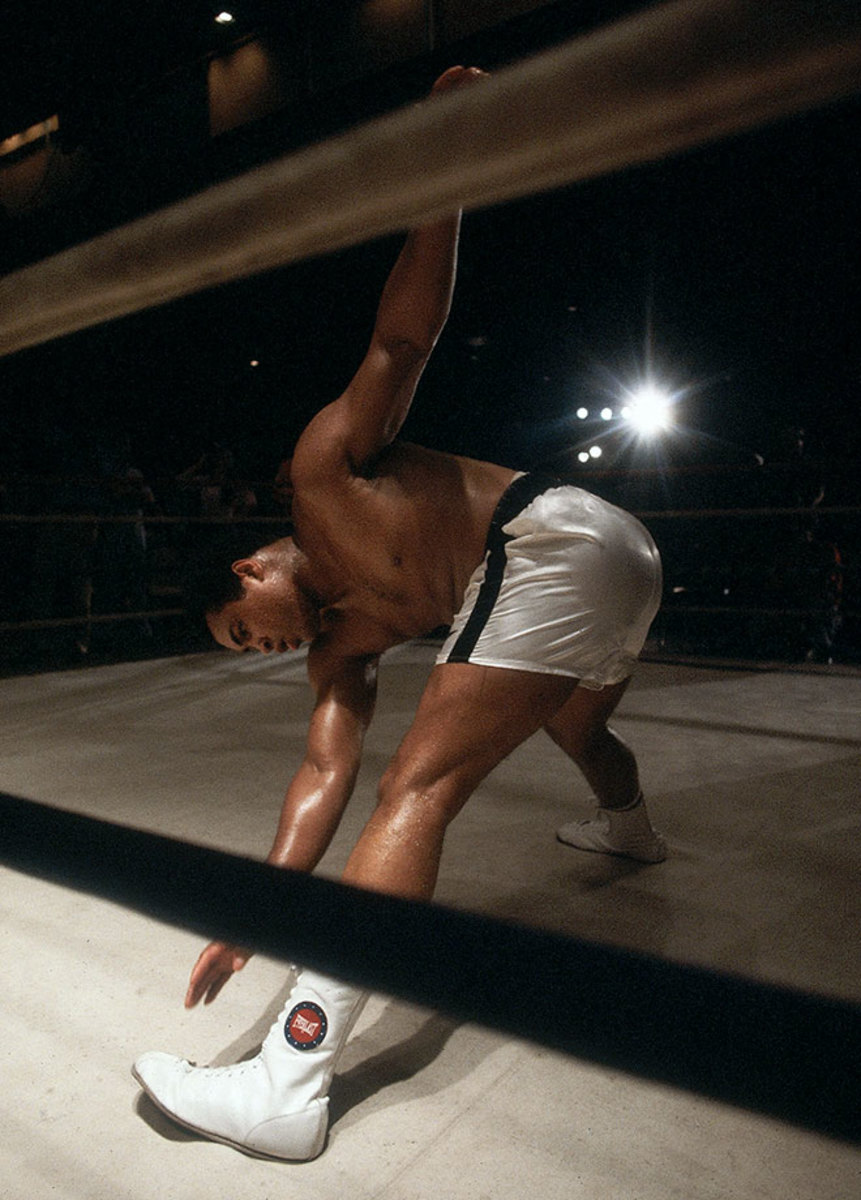
Ignoring pleas for his retirement, Ali stretches before a fight against Trevor Berbick in Nassau, Bahamas. Ali lost to Berbick in a unanimous decision and retired after the bout, the 61st of his career.
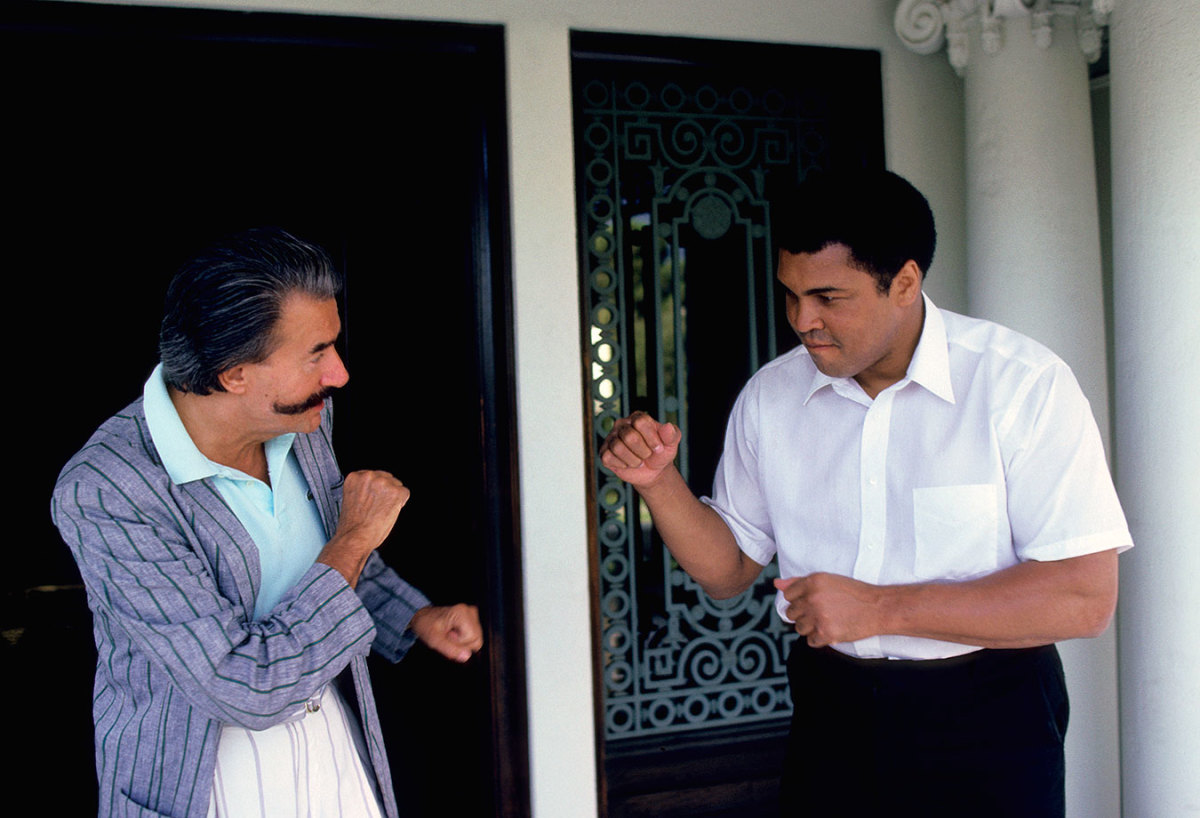
Ali pretends to spar with artist LeRoy Neiman at his home in Los Angeles. Neiman met Ali in 1962 and made many paintings and sketches from throughout Ali's life.
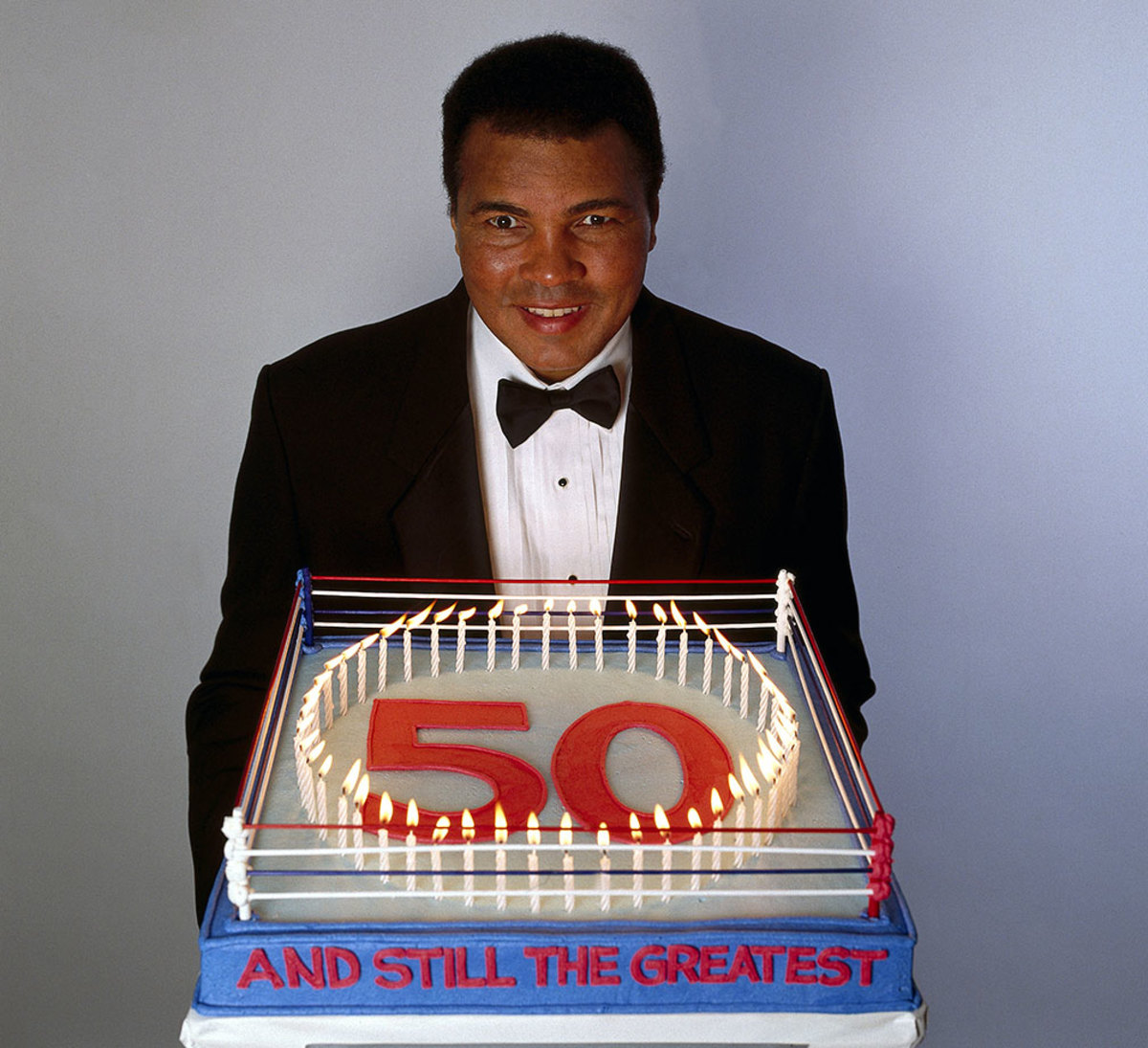
Cake in hand, Ali poses for a 50th birthday portrait in 1991. Although diagnosed with Parkinson's syndrome seven years earlier, Ali was still active, traveling to Iraq during the Gulf War to meet with Saddam Hussein in an attempt to negotiate the release of American hostages.
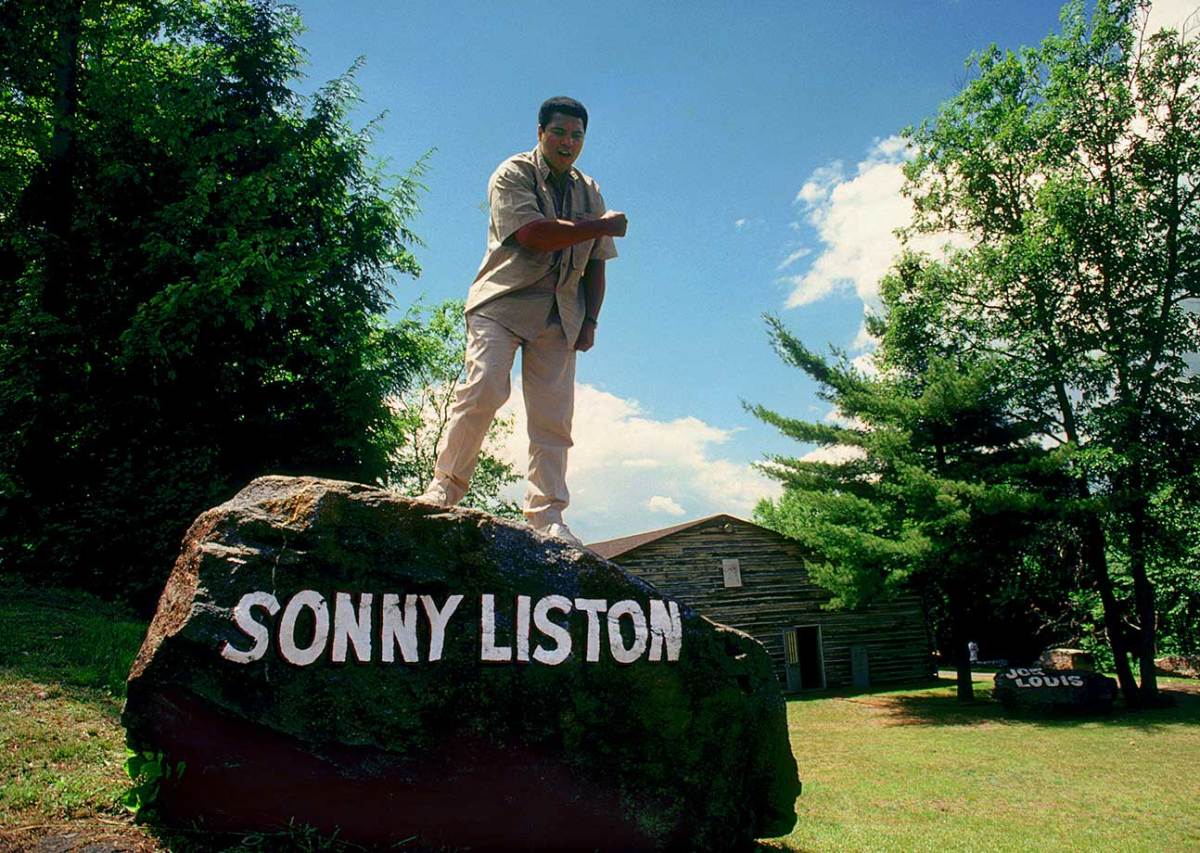
The same year, Ali stands atop of the Sonny Liston rock at his old training camp cabin. Ali and his father painted the names of famous boxers he admired on 18 boulders at the camp.
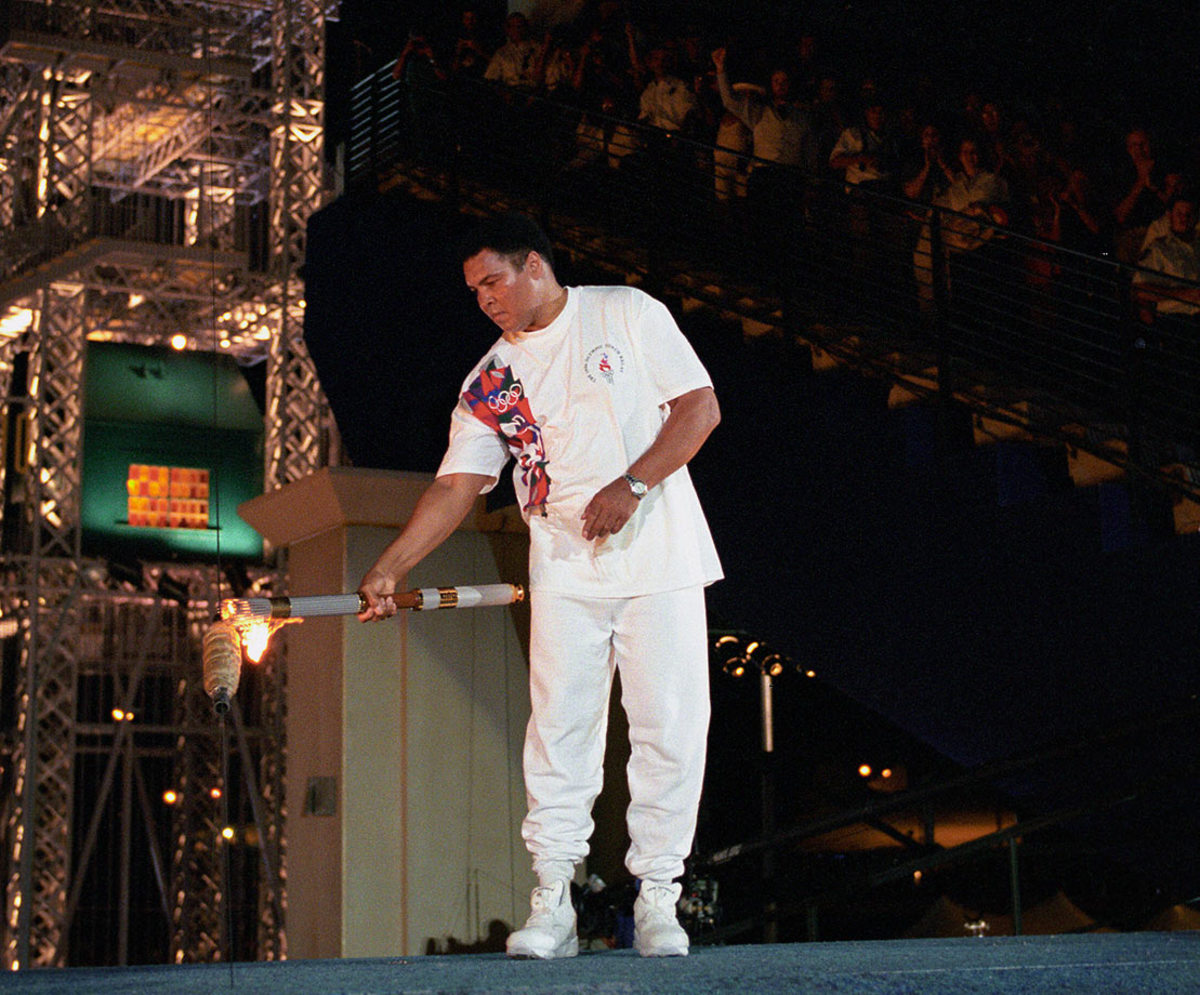
Ali carries the Olympic torch inside Centennial Olympic Stadium at the 1996 Atlanta Olympics. Despite trembling hands, Ali had the honor to light the Olympic flame in the stadium.
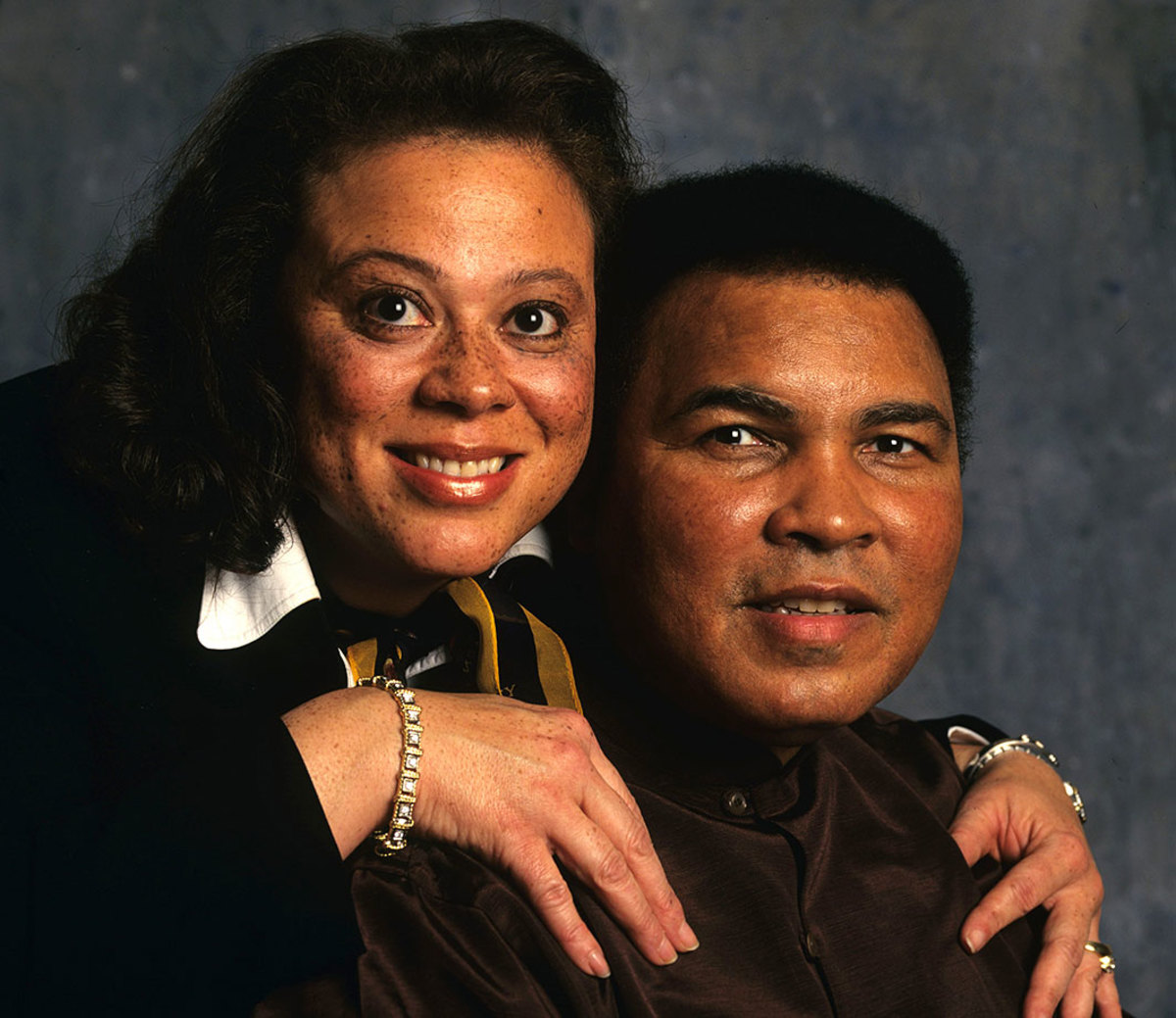
Husband and wife pose for a portrait during a photo shoot in 1997. Muhammad and Lonnie married in 1986 and have an adopted son together, Asaad Amin Ali.
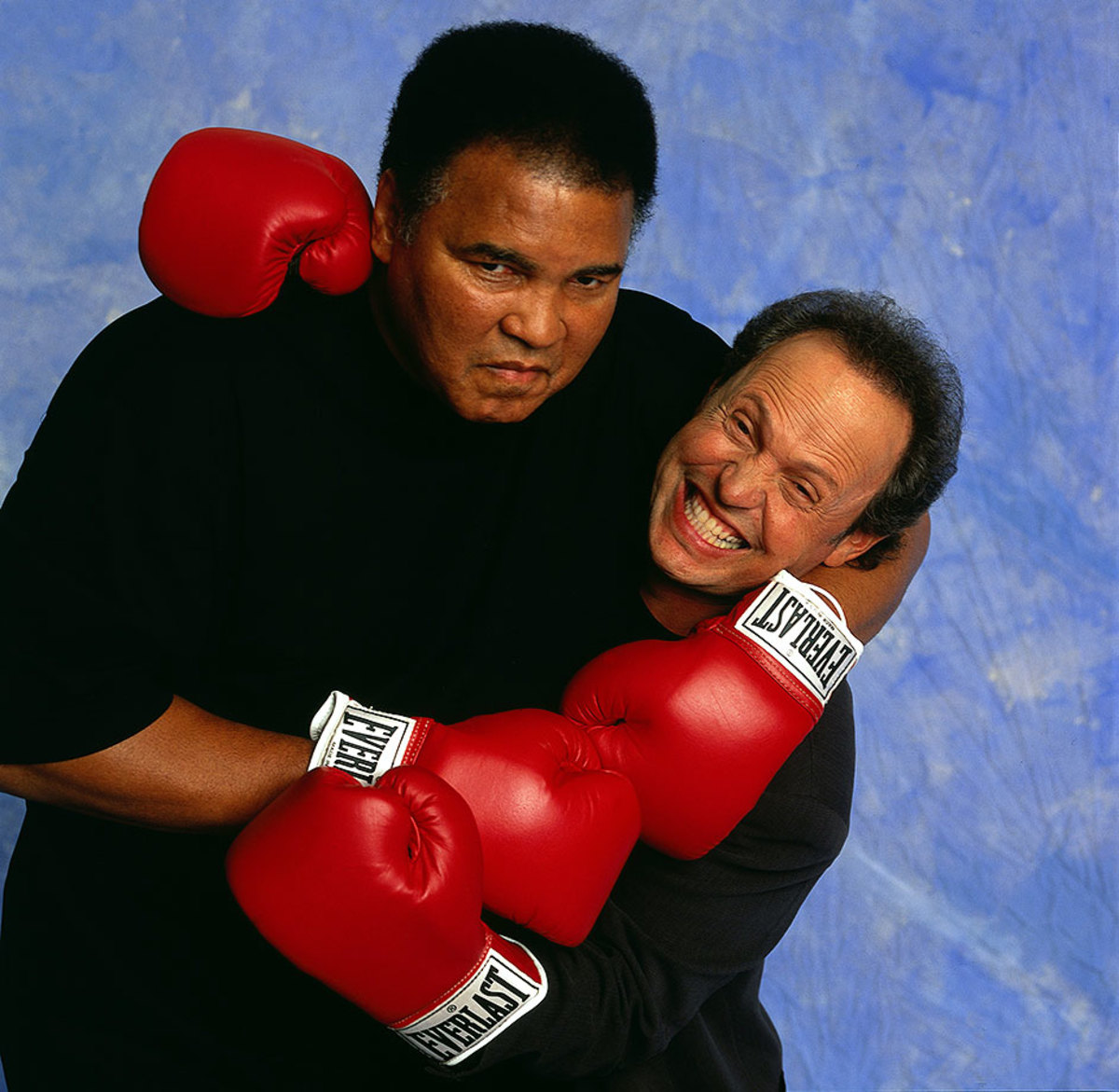
Ali messes around with actor Billy Crystal during a photo shoot in 2000. Crystal's impression of Ali was notorious, and he performed at a tribute to the boxer on his 50th birthday in December 1991.
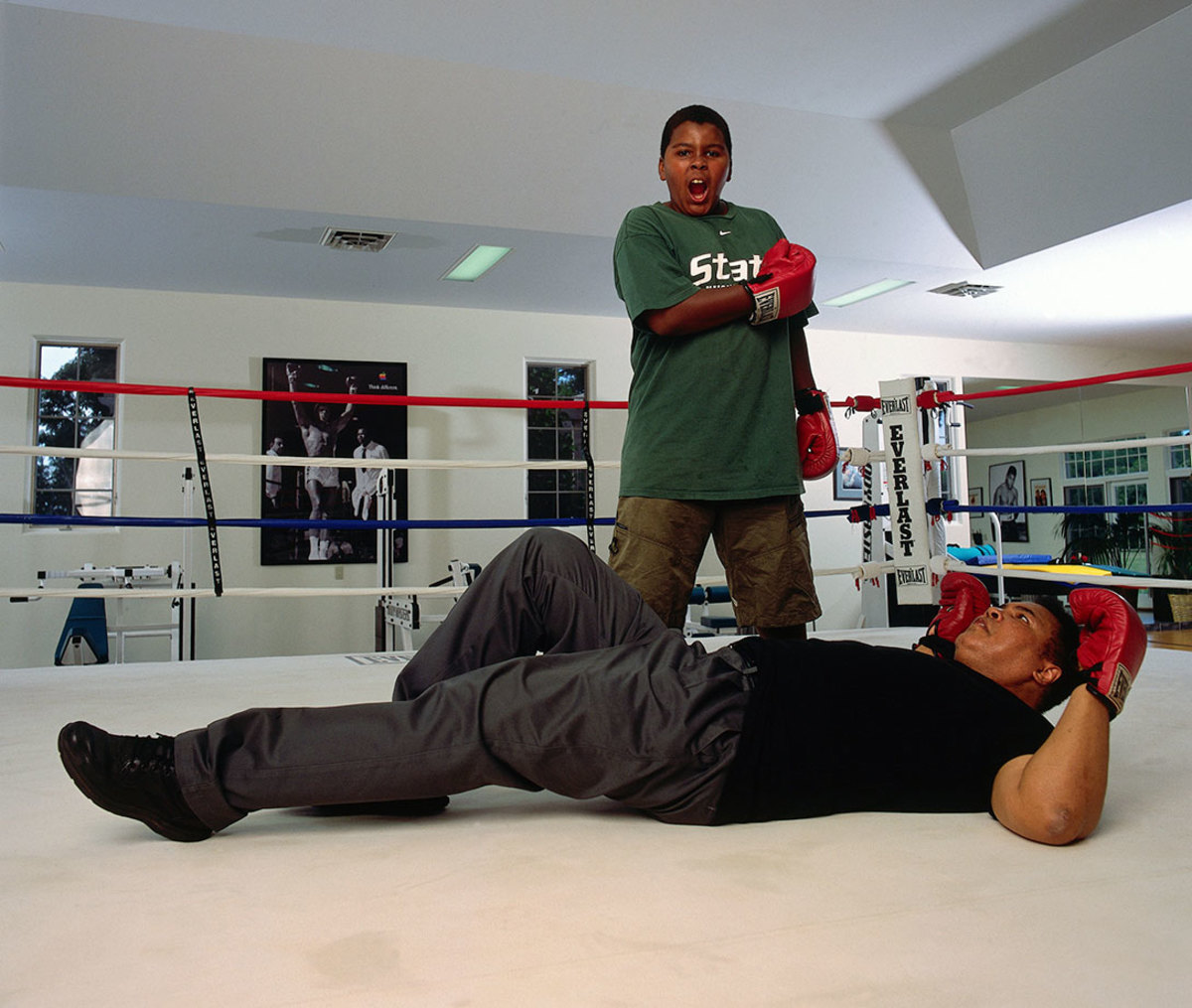
Ali lies on the canvas as his son, Assad Amin Ali, stands over him invoking memories of Ali's victory over Sonny Liston during a photo shoot in the gym at his farm on Kephart Road near Berrien Springs in 2001.
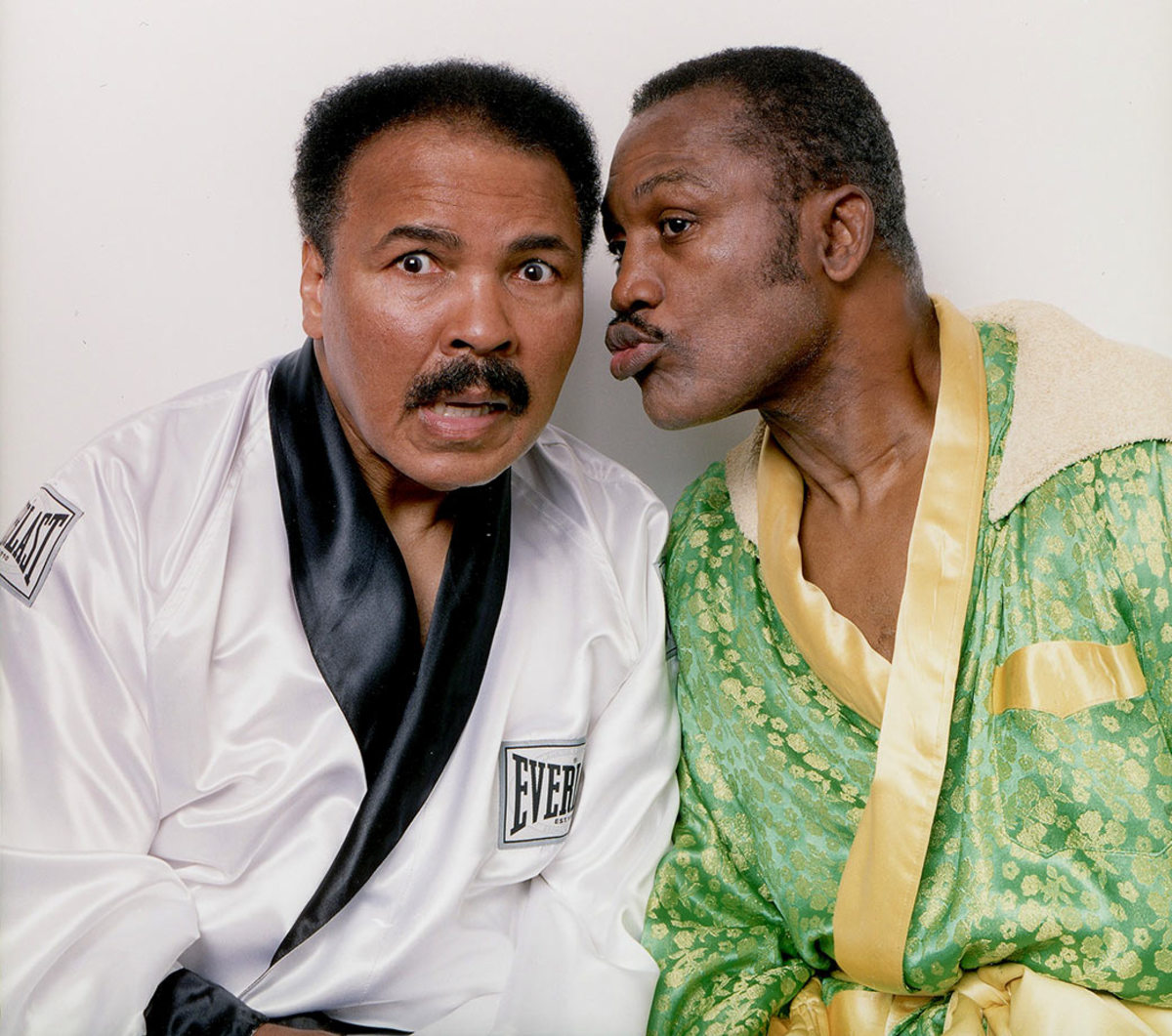
Fierce rivals in the ring, Ali and Joe Frazier pose for a portrait in the boxing robes they wore the night of their first bout at Frazier's Gym in 2003. Ali said after Frazier's death in 2011 that he was "a great champion."
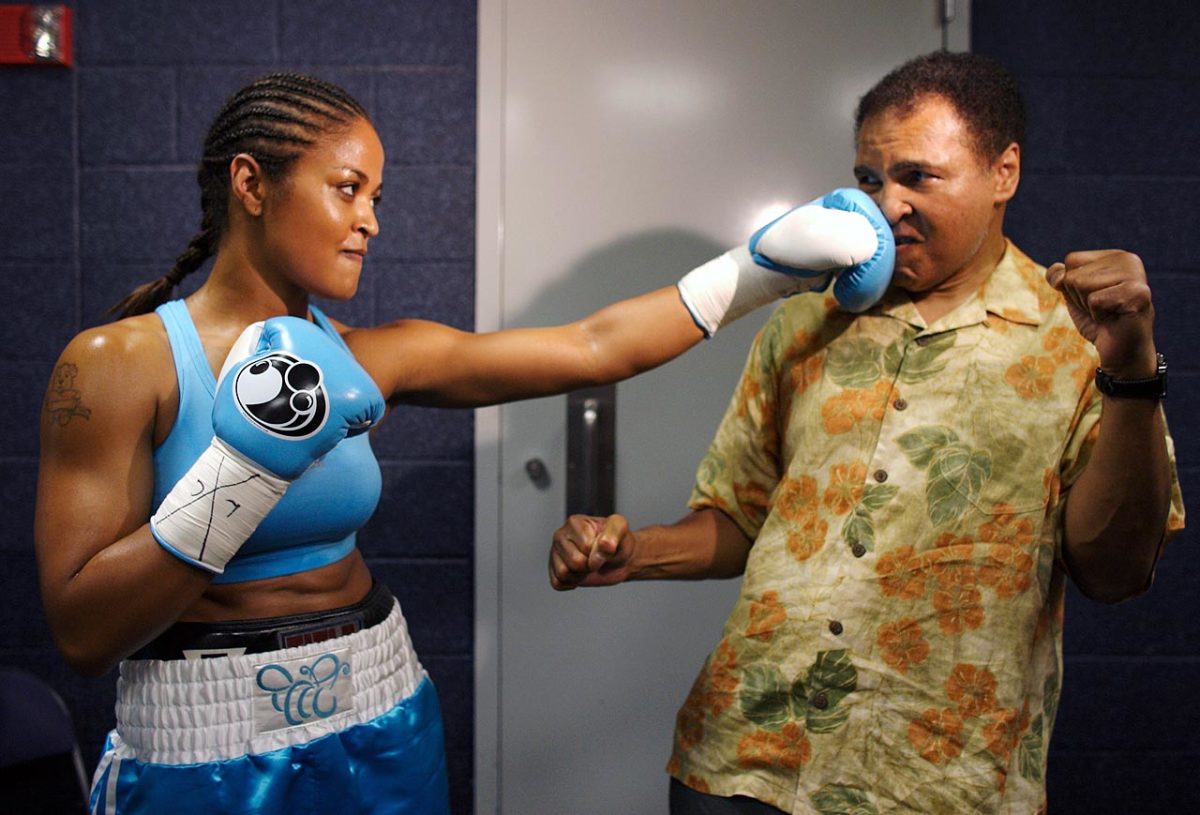
Ali takes a punch from his daughter Laila Ali while sparring before her fight against Erin Toughill in 2005. Laila retired from her own successful boxing career with a professional record of 24-0.
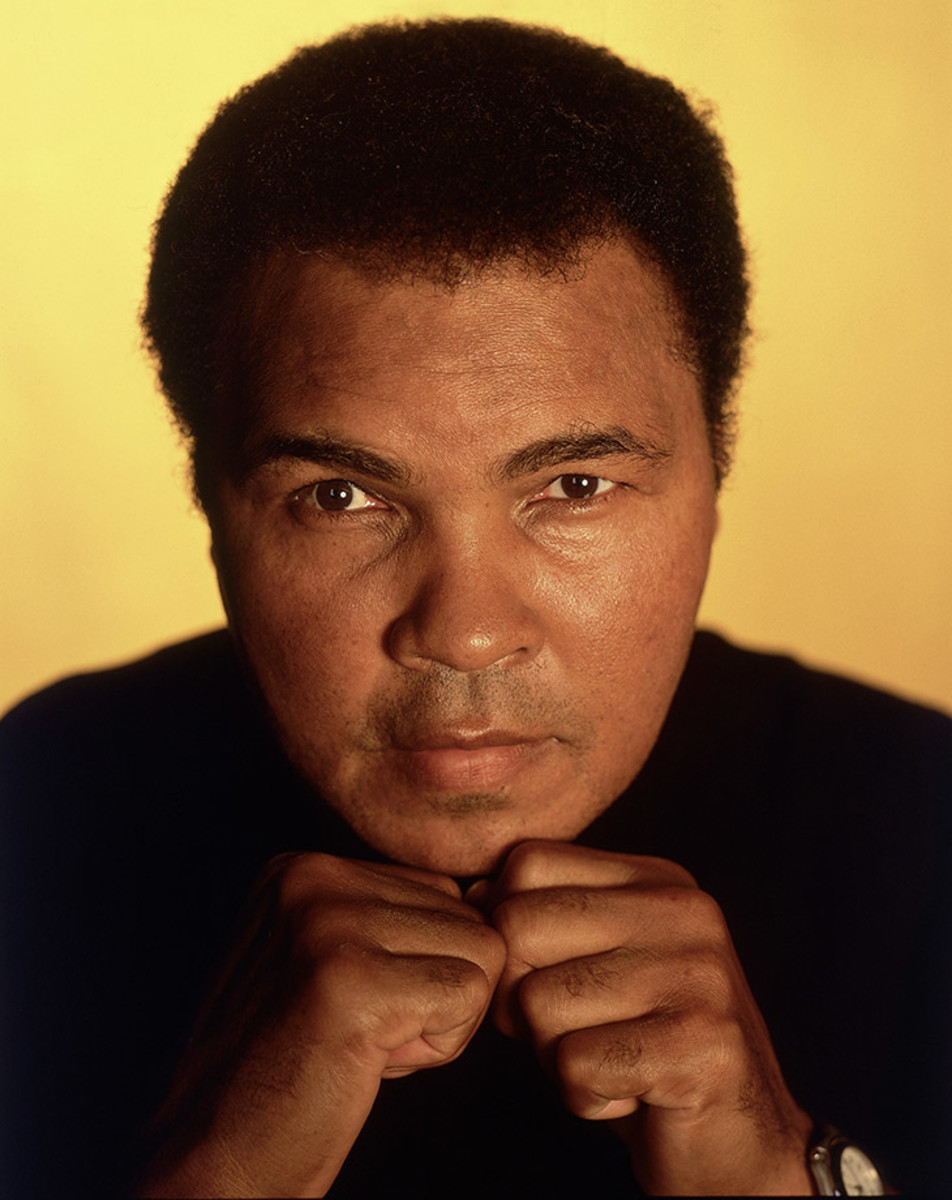
Ali poses with his fists up for a portrait in 2005.
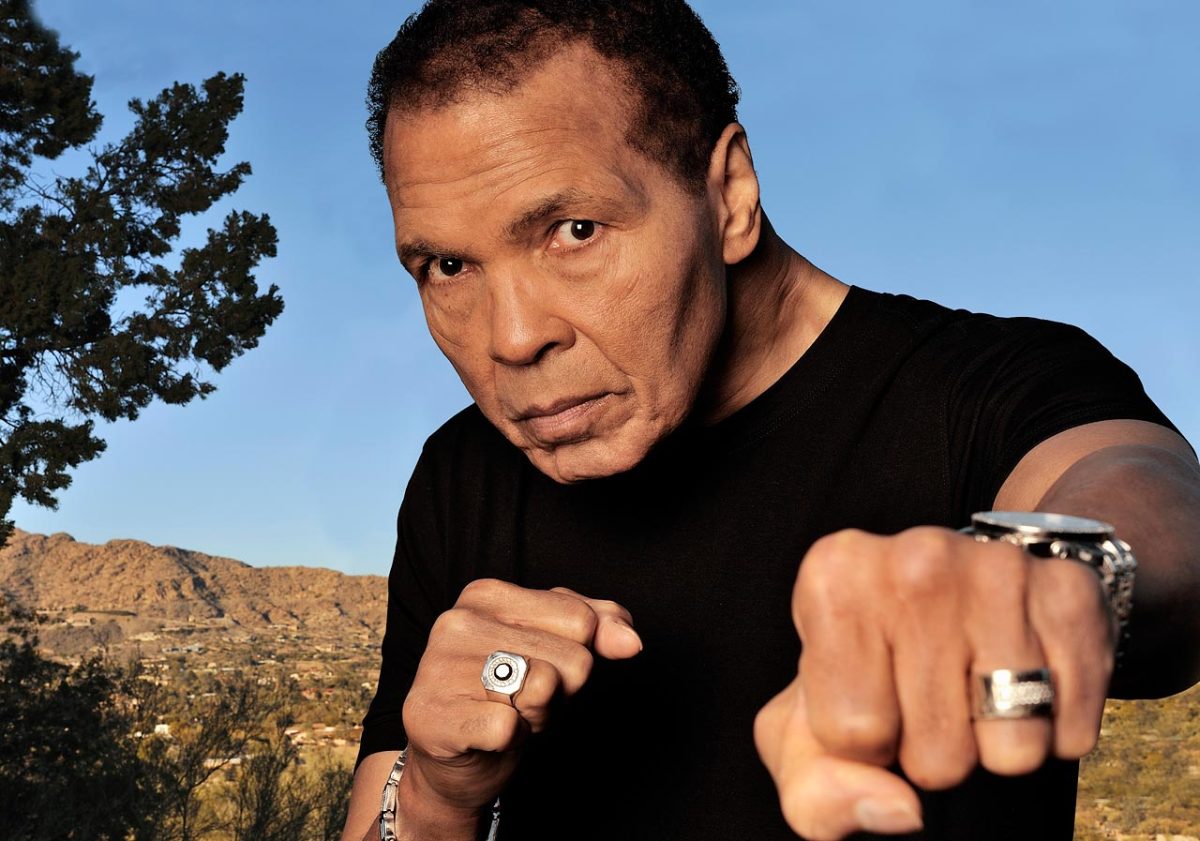
Ali poses with an extended punch in a 2012 photo shoot at his home in Paradise Valley, Ariz., to mark his 70th birthday.
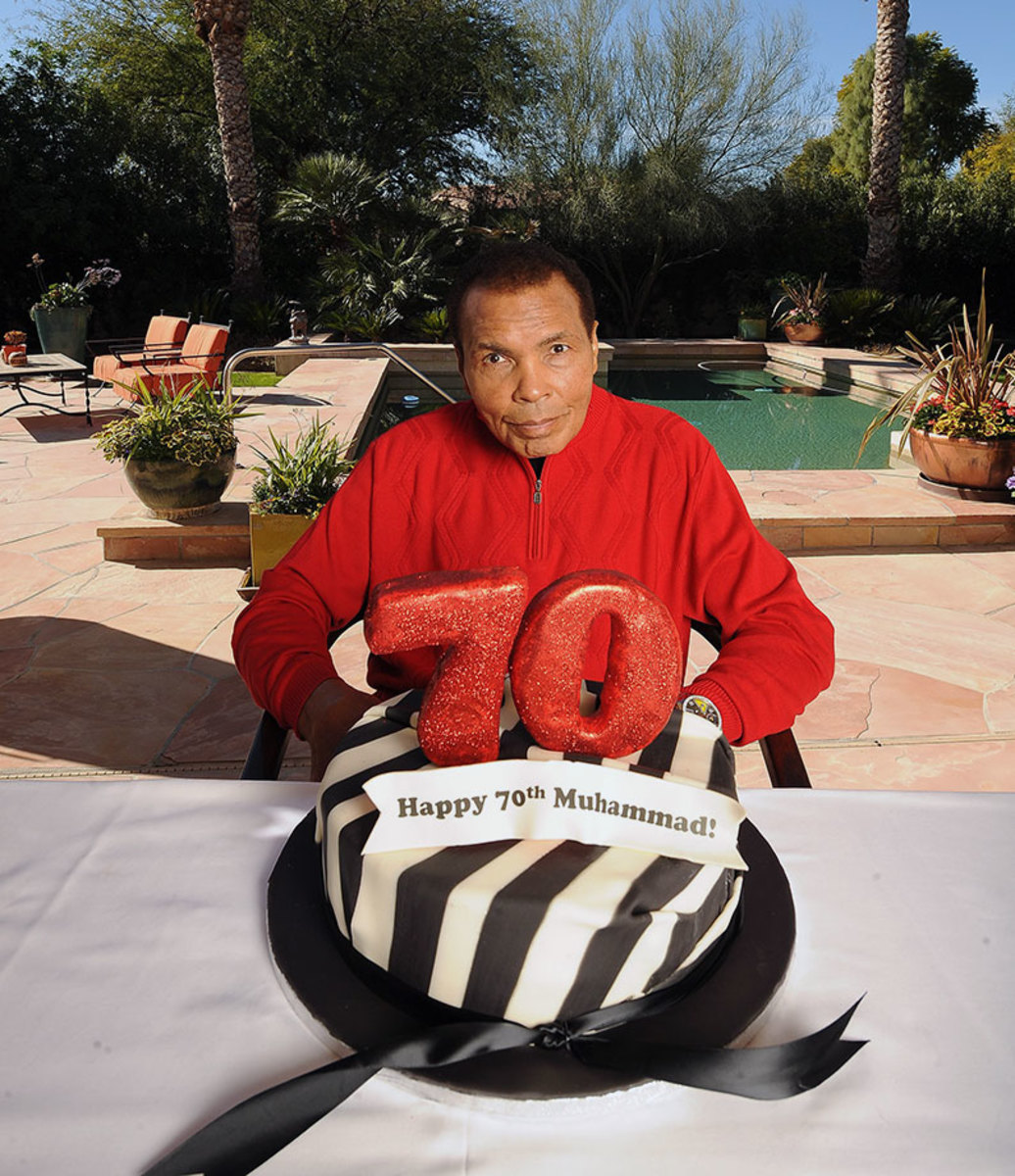
Ali sits in front of a 70th birthday cake in January 2012 at his Arizona home. Later that year he appeared at the opening ceremonies for the 2012 Olympics in London to escort the Olympic flag into the stadium, 52 years after he won gold in Rome.
